#otherwise I can’t think of a single meaningful thing any other character has said
Text
I don’t make the rules. Castiel has the most iconic lines on spn.
#castiel#spn#the only exception is bobby’s family don’t end with blood#otherwise I can’t think of a single meaningful thing any other character has said
13 notes
·
View notes
Text
Okay I’m just gonna do a little Ted Lasso vent under a cut feel free to keep scrolling this is just so I don’t ruin someone’s day in DM’s by being salty as hell
TLDR this season has just been: go girl give us nothing for me.
I’ll start with overall vibes, I just think they’re doing too much. Maybe this is personal preference re: ensemble shows but there are so many plotlines and while I disagree that Shandy and Zava and Anastacia are useless and time fillers (they’re side characters to advance main characters personal arcs.... that’s how side characters work) I do agree that they feel flat and one note, but I think that’s just because there’s too many characters and too many plots, and they’re not able to go deeply into any of them anymore. Like we’re not often sitting with characters, it’s like a quick scene then moving onto the next person and issue.
Unfortunately I’m feeling that with Henry and Ted now, which sucks, because it’s one of the most meaningful relationships on the show. But Henry had an issue this ep, and by the time Ted spoke to him it had already been solved by parenting he’d done in the past. Which... I feel like we as an audience don’t need more reminders that Ted is a good dad, we already know that. Also I don’t feel as if “count to ten until you don’t feel angry even if that’s infinite” is the lesson that Ted has been learning this season? Hasn’t he been learning to occasionally be assertive and stand up for himself? I think this plot line could have been a bit deeper - Henry being insecure because his dad isn’t there and taking it out on other kids instead of... undisclosed being mean for no apparent reason and immediately apologising. Anyway that’s just one moment in the entire episode that fell flat for me.
Rebecca, bro idk. She feels like 2 different characters to me at the moment. Like she’ll yell at Ted to make them win a match and then literally isn’t doing a single thing about it outside of that and will just be like hi :) to him in the hallway. Loved the moment where Higgins said maybe they needed to find another manager so much, I love his growth from S1 and actually saying brave things now, but I hate that it was brushed aside especially if she’s yelling at Ted on the regular now about losing. I’m glad she got her fertility tested because I feel like otherwise there’d be this huge “what if” for her. As a single person I was rolling my eyes at the emergency contact thing but yeah I get it she wants to find love. I think this is where my main criticism of the season comes in, and that is the reliance on the psychic, things that have been “set up” in previous seasons rather than characters actively doing things. Like as someone who has been watching closely for years now, I haven’t really been surprised by any of the directions they’ve taken s3.
Rebecca is walking around looking for signs related to the psychic, which is all well and good especially if it leads her to getting her fertility tested and stuff, but same with Ted, not currently doing anything about the teams losses, not doing anything about the team & Zava when he was still there. He hasn’t spoken to Colin about benching him and then playing him when like... S1 Ted would be all over that. He hasn’t spoken to Beard about Jane. Idk I think there’s so much reliance on “it will all work out in the end” that they’ve forgotten you need to make active strides in the middle. We haven’t yet seen Roy working on himself to figure out what he wants with Keeley, Jamie has had no arc this season so far other than being suddenly a genius (like nothing has come from the 4am training sessions yet?)
Literally shocked that the writers can’t seem to think of a meet-cute that isn’t with someone’s boss, like I do think it’s odd that it’s happened 3 times now (Sam and Simi, Keeley and Jack, Sam and Rebecca) but I am here for seeing sapphics kiss onscreen even though I’m slightly concerned about the long-term of that for Keeley (but tbf I was about Sam too and that ended fine)
Shandy Keeley stuff, I know it was a mirror with Sam Edwin but fml, I thought Keeley was going to learn to be a good manager and grow Shandy as an employee but... no.
Final note even though I could probably rant for longer: I miss Phoebe SO MUCH
Anyway highlights of the season are: NATE!!!!, BeardRoy, Trent although I wish he’d say more, Higgins, and Colin has potential
12 notes
·
View notes
Note
With Digimon Ghost Game starting, I thought about how different it is from previous Digimon series, though it's still undoubtedly Digimon... and then I realized all Digimon series are like that. So I wonder, what do you think sets each Digimon series apart from the rest?
I think both Ghost Game but also the reboot have been a wake-up call for people in terms of realizing that likes, dislikes, and tastes are subjective, and I think it's especially important in terms of this fanbase that is so obsessed with this idea you can objectively rank things by quality -- especially when each series is often deliberately trying to have its own identity, so it's arguably apples and oranges -- and forcing this idea of what's Good and Not Good on everyone else (especially when there's a nasty double standard phenomenon where Adventure and often Tamers get to be so impervious to criticism that people conveniently forget they're perfectly capable of being scrutinized for a lot of things they're weaker in). Very frustrating to see everyone who likes less popular series treated as if they have to accept that they like a "badly written series" for some things and everything else is a guilty pleasure, which I find to be incredibly dumb.
The most important take-home here is that the fact each series has its own identity is always going to be the main factor in what makes it "good" or not to you, not some arbitrary bar of comparison that's based on some narrow-minded view of "good writing" (which is usually unreasonably based on Adventure). For instance, the reason why 02 is so important to me is because (see below), to me, it has the highest amount of meaningful, important life lessons and themes that it wanted its audience to remember, to the point that I frankly do not care about where the plot goes in comparison. That may not be the case for everyone else, and that's fine, but should my tastes be called unreasonable for that? I think we're also coming to realize that because of Adventure (and kind of 02)'s precedent, so many people have been judging series purely by how intimate their individual character development style is, but this is unfair because Adventure and 02's ridiculous level of character depth to psychological detail is extremely unusual and unrealistic to expect of others; Adventure and 02 only achieved this by practically considering the plot utterly subservient to its character arcs, and it's arguably why they have some of the weakest "plots" in this franchise. It's so bizarre that I can see character development in other Digimon series that outstrips even most kids' anime on the market, but it's not as much as Adventure's so apparently it's bad. And, moreover, as it turns out, some people have priorities other than characterization; just because Adventure had that as its strength doesn't mean that's the only thing anyone should care about. Is the plot fun? Is there a meaningful message besides characters (also important to me)? Do you vibe with the tone being dark, or being silly? How much do you care about resourceful usage of Digimon lore? That kind of thing. Everyone is different, so that's why everyone has their own priorities. If you’re someone who prefers darker content, you may not realize that writing good and well-timed comedy is actually a very, very difficult task, especially when said comedy simultaneously has meaning (in comparison, it’s surprisingly easy to write “dark” but shallow content).
I think it's fair to like every Digimon series for its own thing, depending on your personal tastes. I can't speak for everyone, but my impressions are that it has to do with the following:
Adventure: Significantly easier to understand than 02 due to its more straightforward plot, and focus on individual character development ("individualism" being a strong point here). In terms of characters, it goes a lot into some very real social problems (the divorce around the Ishida and Takaishi families and the pressures surrounding Jou, for instance) in a very realistic manner. Also, it has that sense of mystique and absurdism to the Digital World that's both whimsical but also mysterious, and while 02 has it too, Adventure's the isekai story that has it the most.
02: The first is its focus on the importance of human relationships and the compelling group dynamic unparalleled in this franchise, and the second is its important themes and life lessons that I think are some of the strongest in said franchise. I have a whole tag for the ridiculous amount of nuance packed into every detail and dialogue line for this series, and I think every time I've rewatched an episode I've learned something new about it because there are so many things that clearly wanted to be said in each line. The entire series is basically an unpacking of the feelings of insidious self-hatred and the crushing feeling of being subject to society's expectations, and ones that are so deep-seated that you often don’t even have a single answer to how to unpack it (for instance, Miyako hardly has a tragic single event in her backstory, but she says and does a lot of things that'll be painfully familiar to those who have experienced chronic anxiety). Almost every plot point can be said to connect to each character arc in some way, and the mantras for appreciating and treasuring your own life and living life the way you will make this, in my opinion, the strongest series in terms of speaking to those who struggle with this kind of existential crisis for reasons of depression or otherwise. (Oops, I think I went too passionate about this; my biases are obvious...)
Tamers: I think it forms an interesting study and unpacking of the kinds of things you take for granted in Digimon or the monster-collecting genre in general, and an examination of how they'd work in a real-world context (although 02 had a focus on daily life, it didn't quite merge the Digimon and the real world factors until very late in the series). Also, probably the second highest on "hard sci-fi" (the only one that outstrips it is probably Appmon, but Appmon has a very different, more simplified take on it).
Frontier: A series that lies somewhere between Adventure's scale of individualism and 02's scale of group dynamic, and one more discussing the feeling of having your heart hardened from being an outcast, and what it takes to accept the idea of opening yourself up to others again. Recommended for those who like transforming hero and magical girl stories, too. From the Digimon perspective, also the one with the most detailed and consistent Digital World mythos.
Savers: I think this is the series that most drives home "life is complicated" (i.e. there isn't a single mastermind behind everything) in the most tasteful manner, because while it drives home the point that you can't just simplify everything into a good side and a bad side, some bad things really are evil (hi, Kurata), and it doesn't change the fact that everyone's responsible for cleaning up the fallout. The portrayal of the evils of government bureaucracy is probably the most realistic out of any of these series.
Xros Wars: For those who like fun, most of all! For those who like seeing Digimon finally get more of the spotlight and individuality since so much of it had been geared and biased towards the humans prior to this. For those who really like worldbuilding, and, after all, this is called Xros Wars, so it's interesting to see shakeups on the usual formulas in the form of the different factions and their priorities. Hunters is very different in tone, but I do think they have some of these aspects in common; that said, it being closer to having single partnerships brings it a bit closer in line to conventional Digimon partnerships, and it also has more of a picture of daily life. Also, as much as Tagiru is probably your-mileage-may-vary since he's not exactly a very nice kid (I get it if you don't vibe with that), which may also rub those hoping for not nice kids to become nice the wrong way, I do have to say I find him to be one of the funniest characters in this entire franchise, and you'd be surprised how hard good comedy is to write.
Appmon: Probably one of the strongest theme narratives besides 02, since it has a very clear and obvious theme about the importance of kindness in a world where technology is dominating and we're almost encouraged to strip the feelings out of everything. (Bonus for more straightforward plot than Adventure or 02 while still retaining a lot of its elements in terms of how to characterize them.) Also the first series to be speculative about the near future instead of taking place around the time it airs, and it's very obvious it wants to provide important and necessary commentary about what we need to do in the incoming era, especially as a lot of what it has to say becomes increasingly relevant.
Reboot: For those who like Digimon mythos and null canon -- this is probably the only series to show it off in this level of detail -- and the kind of cool action fights that would usually be saved for the climax in prior series (and animated in much more intimate detail with battle choreography than prior series would have). There are a lot of people into this franchise who felt like it genuinely was not making enough use of its Digimon roster and its potential because it kept going back to the old standbys (especially Adventure-based ones), so it was a huge relief for that crowd to see attention finally being paid.
77 notes
·
View notes
Text
RWBY Recaps: Volume 8 “Risk”
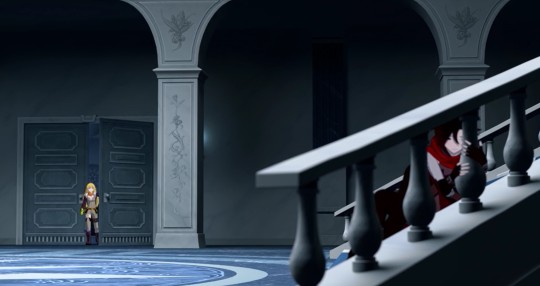
Welcome back, everyone! I have a lot of mixed, complicated feelings about today's episode and I'm already sure this recap will miss a great deal that should be said. There's a lot to digest, we need some time to do that, so until things have settled I think that the one, entirely confident claim I can make here is that our writers weren't BSing the fandom on twitter. The last few days have seen a number of big claims made regarding "Risk" —
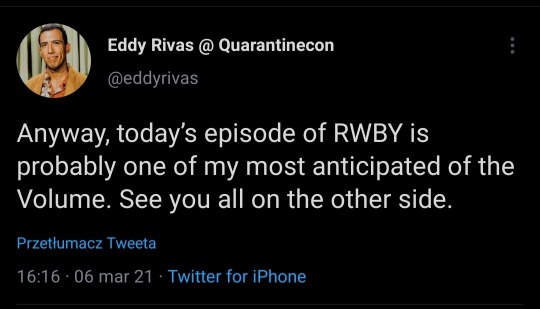
— and whatever else we might have to say about the episode, it certainly delivered in terms of shocking content. From confessions to reveals to a new plan in place, there's a lot to unpack.
So let's get started.
Our first shot is a problem.
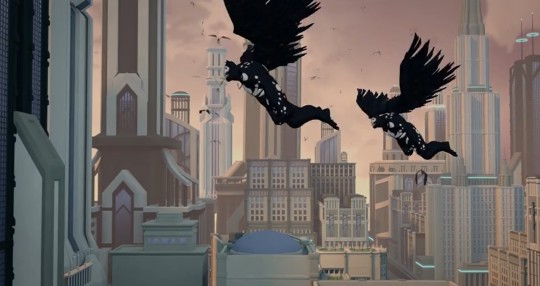
I don't want it to be! But I've got to work with what I've got. We open on Salem's flying monkeys — or gorillas, if we're being technical — and my immediate thought is where in the world they came from. I mean, obviously I know where. We ended Volume 6 with the post-credit scene of Salem adding wings to an army of Beringels, Hazel commenting that she'll lead the invasion herself. When Salem arrived at the end of Volume 7 and we picked up where we'd left off in Volume 8, the fandom was obviously expecting an attack led primarily by flying, transformed grimm. That didn't happen. For ten episodes the plot forgot that the Beringels existed, focusing instead of the Hound, the grimm soup, then the Whale, then the ground grimm the Whale was producing. Months back I encountered a number of posts asking, "What happened to the resource we know Salem brought to this fight?" and those questions are partly what inspired the "Introducing new grimm that are then quickly abandoned" spot on the bingo board. Now, suddenly, the Beringels have re-appeared and that is a good thing. Though it's too little, too late, as is so often the case with RWBY. Getting something you expect has a sour taste when it arrives months past when it was needed, especially when that something only exists for a second on screen.
This is doubly true given that we saw Oscar eliminate the grimm last episode.
At least, I thought he had? Pretty much everyone I've spoken to thought he had. This last week's discussions have centered around RWBY nerfing the stakes, taking out a whole army of grimm in one, magical blast. That's far from great. Yet now we see that we were apparently wrong. Atlas remains overrun with grimm, this problem remains a problem... so, yay? But we're once left with a tradeoff. RWBY has no longer eliminated the stakes with a deus ex machina as we had originally thought, but in its place we're left with a badly executed scene last episode and an assumed problem that is "fixed" with an enemy we should have been dealing with since the start of the volume. The road to the Beringels has been messy indeed and all they've done so far is fly across the screen.
Which reminds me: if this army of grimm still exists — and absolutely existed prior to Oscar's blast — how come not a single one is attacking the Schnee manor? This opening is in Atlas, the skies are overrun, we've seen a few grimm show up to help out the Hound, yet miraculously nothing bothers the group while they freak out at the dining table, or freak out as Penny tries to leave. That's a whole lot of grimm and a whole lot of negativity... yet somehow these two things never meet in a way that would inconvenience our characters. While from a writing standpoint I can understand not wanting to interrupt all these conversations and feel good moments, the show can't simply ignore the rules of its world whenever it's convenient. If anything, given that Atlas' population is currently hidden beneath the city, Schnee manor should be even more of a hot-spot than it normally would be. There is one (1) group of people out in the open for them to target.
Yeah, we're a single shot into this episode. It's a doozy.
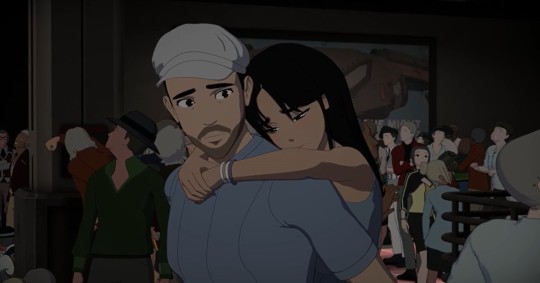
Moving right along, those Atlas citizens (and, let's not forget, a large number of Mantle evacuees too) are still huddled in the tunnels, listening to Ironwood's insane broadcast. They're obviously terrified, as are those down in Mantle who are staring execution in the face. Fiona bursts into tears.
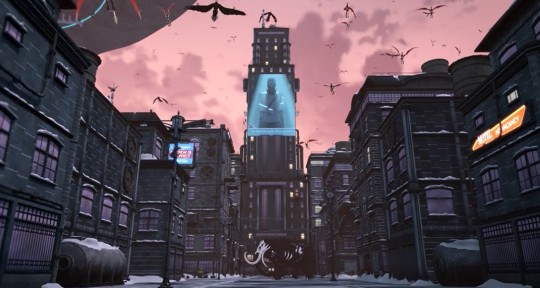
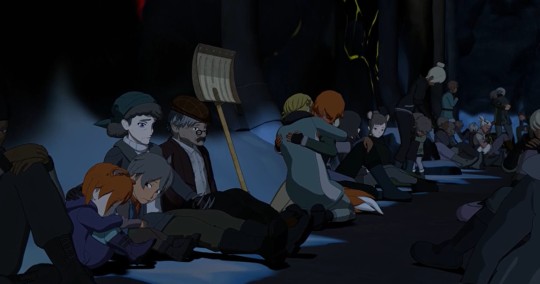
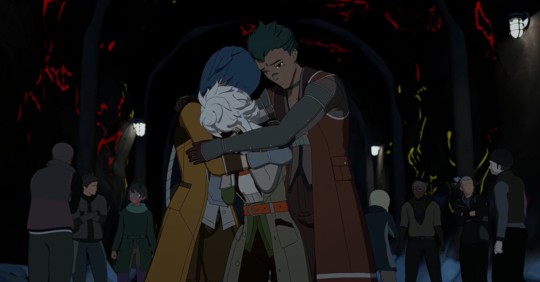
It makes me wonder why we didn't get the airship subplot now. As I've mentioned extensively in the past, that decision didn't make much sense and I think the writers knew it didn't make much sense because they chose not to reveal what Ruby and co. planned to do with the citizens once they were on board. The point was never to come up with a feasible plan, something the audience would put to the test, but rather to just make it seem like the group was doing something Smart and Heroic before Ironwood inevitably derailed it. Don't look too closely at the man behind the curtain. Normally, I'd comment that yes, it's damn hard to come up with a brilliant plan to save others in a situation like this — our characters can only be as smart as our authors! — yet that sympathy dissipates when we hit this episode and are given a scenario where airships would have been great. Ironwood has threatened to nuke Mantle. Suddenly, it is imperative that the civilians leave the safety of the crater as soon as possible (whereas before it was not). So Whitley remembers that they have access to these ships and the group hatches a plan to sneak them down while Ironwood is distracted, get everyone up into Atlas so he can't use Mantle as a bargaining chip anymore. Then they're spotted, the plan revealed, and Ironwood shoots their ships down, leaving them devastated that their attempt to help the citizens has literally gone up in flames. We're still left with the problem of why Ironwood wouldn't just allow a continued evacuation now that Salem is briefly out of the mix and the Schnees have provided extra resources — the writing really took a sledgehammer to his characterization — but the group trying to get people to Atlas to avoid death by bomb at least makes more sense than them trying to move the citizens to an undisclosed location, for unestablished reasons, when they were already relatively safe. The bomb is what makes those airships a necessity.
It really makes me wonder how much editing goes on and how much time the writers have before they finalize scripts.
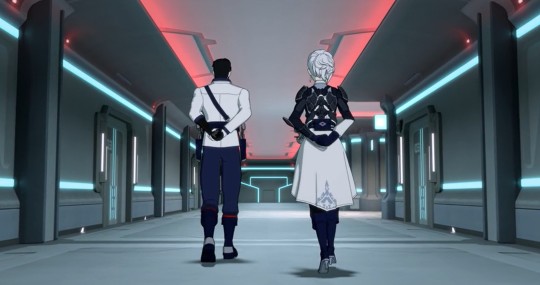
Regardless, we cut from terrified people to Ironwood himself, accompanied by Winter. The animation has some nice parallels going on here, what with the same black, white, and blue color scheme, hands behind their backs, the need for robotic accommodations, and steps perfectly in synch. As we're about to see though, Winter is very good at looking the part of a loyal soldier while actually bending the rules.
However, are we really going to ignore that she betrayed Ironwood last episode? Betrayal from his perspective, that is. Winter was given a direct order, disobeyed that order, pissed off Harriet in the process, and wasn't able to give a good explanation for her actions — she was too busy being creeped out by Ironwood's reaction. For all intents and purposes she should be considered disloyal right now. Or at least under suspicion, yet Ironwood acts as if everything is fine. We've skipped over any meaningful fallout between them, or a reason why Ironwood would dismiss her betrayal. This ties into something I'll bring up later in the episode: namely, that RWBY introduces too much too quickly and doesn't have time to satisfyingly tackle — or tackle at all — the plot points they've introduced, simply because there's always a new one to focus on. We dropped the "Winter went against Ironwood at great personal risk" plotline to make room for the new "Ironwood has randomly threatened Mantle" plotline, which likewise doesn't do Ironwood's characterization any favors. I don't just mean the obvious "Omg he's willing to murder a whole city now" issue. Ironwood used to be smart, yet his unfounded trust in others makes him look foolish now: first trusting Watts, now Winter. Alongside that, the story and fandom have both pushed the idea that Ironwood is paranoid, yet that "paranoia" has only ever been attached to justified threats. If he were actually paranoid then Winter's actions would have caused him to mistrust all of the Ace Ops now, labeling everyone near him a disloyal enemy, despite evidence to the contrary (especially when it comes to Harriet). Yet across two volumes Ironwood has continually been "paranoid" only in regards to things like Cinder and Salem — proven threats — while simultaneously trusting known villains and ignoring when his subordinates straight up say, "She let our enemies go free." There’s little rhyme or reason to any of his decisions here.
Still! A nice, meaningful shot lol.
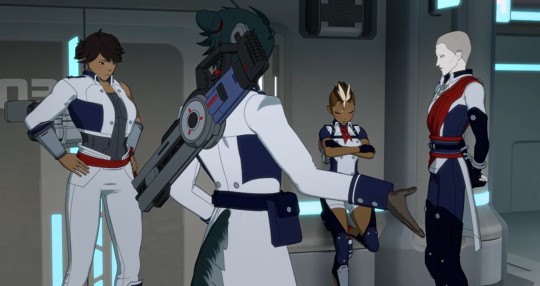
As Ironwood and Winter get closer we see the Ace Ops discussing the threat. "Of course he's not going to do it," to which Marrow pushes back with, "So what? He's bluffing with a whole city?" This is a really, really important moment that I don't think the writers realize is important. See, everyone is shocked when Ironwood reveals that he intends to go through with the threat. The Ace Ops, Winter, Robyn, our heroes... everyone grapples with the idea that this is actually happening. Everyone has some moment of, "It's just a bluff, yeah?" and I don't think that's just denial. The characters' shock tells us that Ironwood normally wouldn't be a man who'd do something like this. Ever. That shock has to stem from something, such as an ingrained understanding that Ironwood is a protector, not a murderer. Note the difference between the fandom and the characters' reactions. Whereas a good chunk of the fandom went, "Of course Ironwood means it. We all saw this coming! Remember how he..." and then proceed to list various things — persuasive or otherwise — that prove he was always a bad guy in the making. Yet no one in the RWBY world is inclined to use those moments as evidence. Winter doesn't go, "He's not bluffing. I saw him shoot the councilman just for speaking up" and the Ace Ops don't go, "Oh, he'll do it. This is the man who destroyed his arm to take down Watts. He'll stop at nothing." After everything they've seen — the same things we've seen — there's still some instinctual, nebulous knowledge that goes, "No. Ironwood wouldn't. He's one of the good guys." We can certainly talk about real life people getting swept up in horrible institutions, unwilling to admit how bad things actually are until they hit a specific line they can't cross... but I think this is less a comment on some sort of bystander effect (RWBY isn't that deliberately nuanced lol) and more an unintentional acknowledgement that until the very sudden and entirely unexpected shooting of Oscar, Ironwood actually wouldn't have done this. The Ace Ops are reacting to a man who absolutely existed until the writing erased him and they believe the core of that man still exists. To my mind, he should, but because our show can't actually have Salem as the main villain right now, she's conveniently blown up and Ironwood takes her place.
So we've got some loaded implications there, as well as Vine's comment that he hopes "the kids" see sense now. I am begging RWBY to pick a lane already. Are they kids, or are they adults? Because that answer makes a big difference and we can't continue to have it both ways.
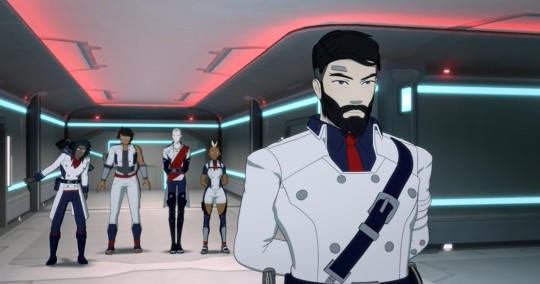
Ironwood and Winter arrive were Ironwood orders that she prep drones with the "payload." That's the moment Winter and the others realize he's serious. Cue that shock all around. The revelation is the last straw for Marrow, prompting him to start yelling some excellent points about how Ironwood is doing Salem's job for her. See, this accusation works. Telling a guy threatening to blow up a city that he's as bad as their villain is accurate. Having Oscar tell that same guy that he's as bad as their villain because he wants to save a city full of people... is ridiculous. Totally different setup here and RWBY got it right this time. The only line that didn't work for me was Marrow asking the Ace Ops if they believe in anything. Uh... yeah. They believe in saving Atlas + all the Mantle evacuees they got. That's pretty well established. I swear, most RWBY speeches are padded with generic, heroic-sounding lines that don't actually mean anything, or are outright falsehoods we’re meant to ignore.
We'll see more of that with renora.
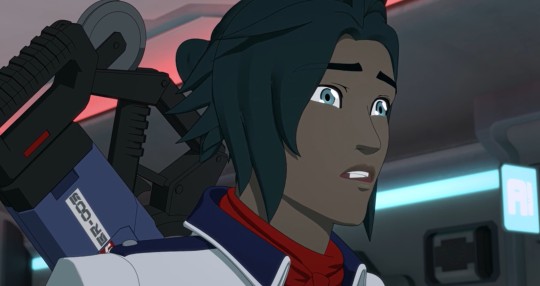
Marrow attempts to leave and his eyes go wide as he hears the click of Ironwood's gun. Remember I said that Winter is good at playing the obedient soldier? It's after Ironwood aims that she tackles Marrow.
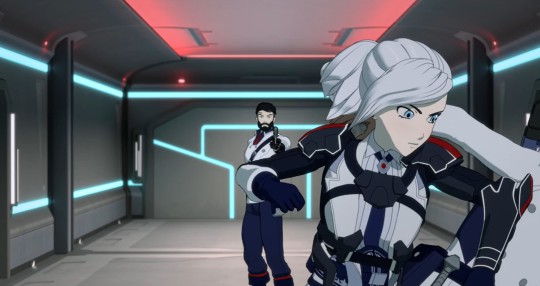
On the surface it looks only like she violently disarmed him, but in reality she got him out of the bullet's path and kept Ironwood from firing at all. She saved his life, choosing to play up how she'll “take this traitor to the brig” where he belongs, rather than watching him die. A really nice moment in terms of strategy and one of the few lately where I've actually felt like I'm watching smart characters.
However, I cannot deny the uncomfortable implications in this scene. Smart or not, necessary or not, it hasn't escaped anyone's notice that one of our darkest characters was a) nearly killed by a white man and b) beat up by a white woman. To say nothing of Marrow's status as a faunus. I was cringing during his line about loyalty: “I used to wear this rank with pride. Now I see it for what it really is: a collar."
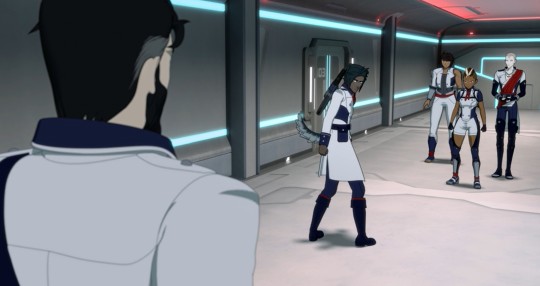
Honestly, I don't have the qualifications to unpack all that, so let's just acknowledge that the scene, while good in some respects, was massively insulting in others. I’ll let others in the fandom defend or damn it as they see fit.
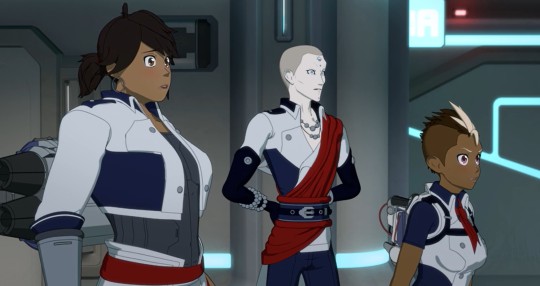
We get a shot of how shocked the Ace Ops are that they nearly watched their team member get executed for speaking up against a bomb threat. It once again highlight's RWBY's strange depiction of violence and when it's deemed appropriate. Harriet has threatened people a couple of times now — here telling Marrow she'll shut him up herself — yet her reaction tells us that she never would have killed him as Ironwood nearly did. Threats, then, mean little... unless Ironwood is making an exaggerated comment about shooting Qrow. Then it's evidence of evil intent that's bound to come to the surface eventually. So does that mean Harriet will be trying to bomb cities herself someday? If so, it once again leaves our heroes in an awkward position, considering that Ruby started the fight Harriet wouldn't, Weiss stuck her weapon in Whitley's face, etc. If it says something awful that Winter would punch a minority — even to save his life — what does it say about Qrow that he would punch a child in anger? Outside of the easy to label actions like Ironwood's bomb threat and shootings, there exists this gray space that asks, “When are you justified to use violence? When is a threat forgivable?” The problem is, the show keeps coming up with contradictory answers. I bring this up not because Winter's punch or Harriet's threat are the most significant examples of this that we've seen, but because the themes of forgiveness and violence take center stage at the episode's end... and RWBY completely drops the ball. Keep these complications in mind.
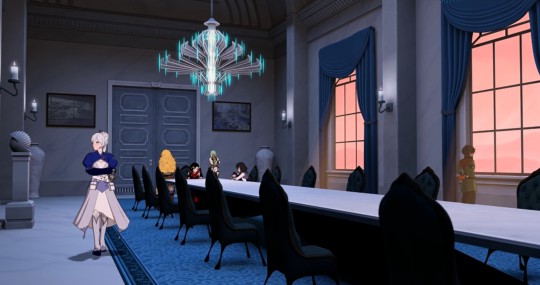
Before that though, the group is crowded into the dining room and no matter what else "Risk" might give us, I'm reminded that I really like the design of the Schnee manor. I'm glad the episode found an excuse to show us this room again.
My initial thought upon entering the scene was, "Are we going to talk about Penny's hack? The silver-eyed grimm? Ozpin's return?" and to RWBY's credit it touches on all of these, though I stand by my point about plotlines coming too quickly. Any one of these should have been given the space to grow, not fighting for space against the potential destruction of Mantle. If you don't acknowledge these things in "Risk" you've lost your chance (much like how "Oscar is kidnapped" replaced "Oscar has to deal with Ozpin's return," resulting in a scene where Oscar was just... randomly okay with Ozpin again. We lost the chance to deal with the first conflict introduced because we barreled into the second), yet if you do spend episode time on these issues, it feels like the characters aren't dealing with the immediate threat. Questions of silver eyes, what to do about Penny, and Ozpin's return needed to be given their due before there was an hour time limit resulting in thousands of deaths. Now, you have to wonder why Yang and Ruby are talking about their mother when a city's safety is ticking away. Where were these questions and reassurances years ago?
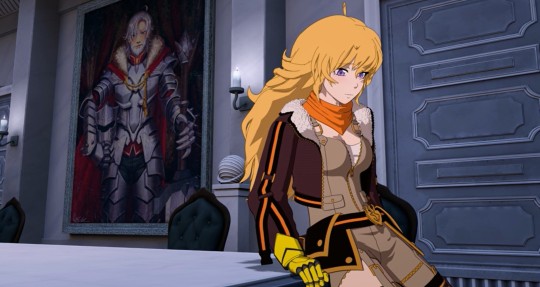
I think this is why this episode — maybe even this whole volume — simultaneously feels too full and too boring. We're being introduced to lots of Big Things, but then putting them off to focus on other, smaller stuff, and by the time we circle back around it's no longer the right time. We're constantly focusing on the least interesting, least important thing in the room. Why is the group sitting around with their tea when we could have moved the Hound plotline up and started this groundwork earlier? Which means we're doing that work now instead of worrying about Mantle or Penny. All of which is connected to Salem herself being here, yet Ironwood is our villain instead... We're just introducing new idea after new idea, dropping each to focus on something else when the viewer is already emotionally invested in the last conflict. It makes the show feel overly packed with problems we don't have time for while simultaneously having too much time in which the characters do nothing of importance. We're never dealing with these issues at the right time. Talking about a silver-eyed grimm while Salem is here feels like Too Much and having the girls unpack that now, with Mantle’s life on the line, feels like Too Little. Stop sitting around while you've got less than an hour to save half a kingdom! We needed this conversation in a different episode, one not already driven by a problem that’s objectively more important.
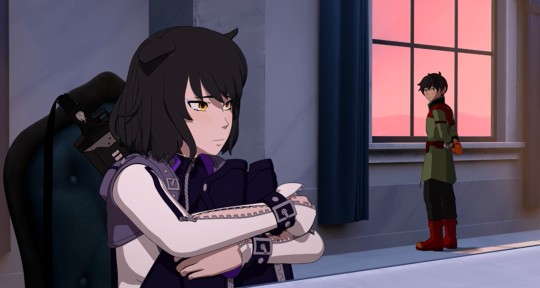
But I'm getting ahead of myself. We're in the dining room and the group is listing all the stuff that has gone wrong lately. Blake mentions that Qrow and Robyn are still in custody, because we definitely want Blake remembering that Qrow exists, not one of his nieces. Ruby, meanwhile, is having a meltdown. "So then it's impossible!" she yells, head in her hands.
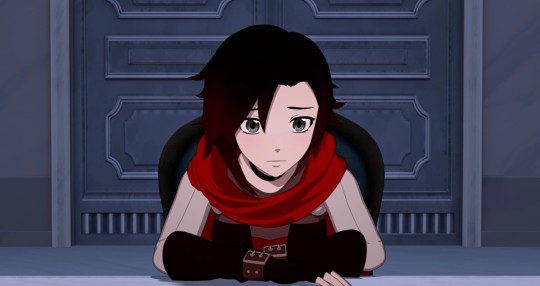
Emerald sneaks in an insult: “See? If Ms. Hero here with all the answers doesn’t have one..." and the others, of course, jump to Ruby's aid. But Emerald is right! It's entirely Ruby's fault that Atlas didn't get the chance to escape with those they had. Her actions and lack of a plan led to where they are now. I'm not saying she's responsible for Ironwood's insane decisions — that's like saying he's responsible for Qrow's in relation to Clover — but Ruby indeed played the part of the hero who had all the answers... without actually having any answers. Now that things are worse than how they started, her only answer is to say it's all "impossible" and throw up her hands. Ruby is an absolutely terrible leader right now and someone should indeed be calling her out on that, it's just too bad it's Emerald, someone technically still presented as an untrustworthy figure for the next couple of minutes. (More on that later.) Any and every criticism of Ruby is dismissed out of hand. Don't believe Ironwood because he's crazy now. The Ace Ops? His boot lickers. Yang has things to say, but once Ren agrees with her she does a 180. Now Ren is heading towards an extra special apology for daring to doubt Ruby. May calls her out, only to also change her opinion the next episode. Now here's one more person, but she's a bad guy. The show has never once encouraged us to treat these criticisms seriously — never allowed them to stick, let alone lead to change — and at this point I'm done with everyone falling over themselves to absolve and praise Ruby. By making Emerald the criticizer and having Ruby throw herself a pity party, the writing ensures that the conversation goes from, "Yeah. You messed up big time and now have a responsibility to fix things" to "Aww, don't be so hard on yourself! We won't let mean Emerald insult you anymore."
Ruby makes herself the victim here. She gets so upset and acts so defeated that all anyone can do is reassure her. The focus turns towards her, a focus centered around hiding against the table, or cowering on a staircase, so that it feels cruel to call her out on her deadly mistakes when she's so clearly upset. But they still should have, especially since cowering and tears have never protected anyone else from the group's criticism. Ozpin is proof of that.
What I'm getting at is that Ruby runs away. She's faced with the consequences of her actions, is informed she needs to help come up with a solution, and instead of braving that decides it's "impossible" and literally runs from the room. While they're on a time limit. Keep this moment in mind for just a bit longer. These choices become doubly important later.
So Ruby can't handle the responsibility she violently ripped from others and the group goes out of their way to comfort her in this. Especially since the writing again decides to conflate Emerald and Ozpin through a comment of Oscar's, demonstrating that it still has no decent sense of what "responsibility" or "villainous acts" means. These scenes are three years in the making and every step getting here was dogged with problems, so the fact that the end result is a mess isn't exactly surprising.
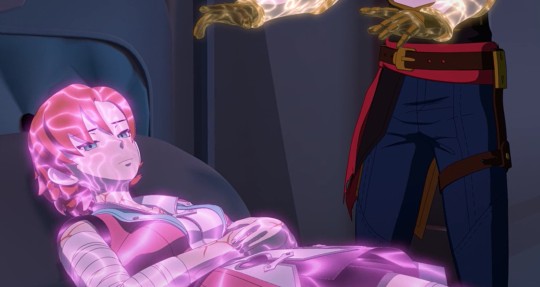
We (thankfully) leave Ruby for a bit and instead turn to Jaune. He's amplifying Nora's aura, but admits that he can't get the scars to go away. That makes sense. After all, they're scars. His semblance helps people heal, but at this point Nora has already healed. Those scars are the result of that.
She says it was “Just another ditzy move from Nora” and I'm glad we're acknowledging that, even if it is all framed through the lens of Nora being incorrect in that assumption. Once again, the writing continually makes statements about characters, but fails to have their actions reflect that. Nora wanted to do more than just hit things with her hammer without thinking them through... and we showed that by having her hit a door with her hammer without thinking it through. Was it heroic? Absolutely. Did it lead to any growth? No. I'd much rather someone acknowledge that yeah, she did the same thing she always does, but that's not necessarily a bad thing. Nora's impulsivity is a part of her and, given the talk of teammates here, she could have gotten reassurance that she'll always have people around to help her temper those impulses. Instead, we're (again) told that she shouldn't do A anymore, watch her do A anyway, the writing presents it like it’s B, Nora admits that she did A, and everyone rushes to assure her it was actually B. Just let these characters make mistakes for once, especially mistakes made in an effort to help someone. This should be the easiest and kindest way to criticize the group and RWBY can’t even manage that.
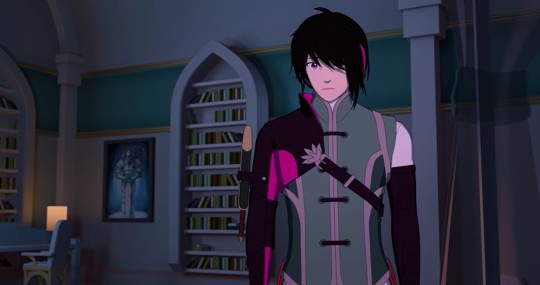
Which brings us to Ren. Ren, I am so sorry. You deserved better than this. Nora rips into him, saying, “We were supposed to be a team, but that didn’t matter to you! You shove people out so you don’t have to feel things that are hard!" and again we have RWBY making grand statements that are meaningless. Did Ren keep things bottled up in Volume 7? Yes... and no one tried to help him with that. Instead, Nora decided to bypass his problems completely and try to kiss it better. When that (shockingly) didn't work, Ren was finally forced to open up at Yang's insistence and was abandoned for his perspective. That's what that was, literally and metaphorically: they walked away from him and made it clear that so long as he believes these things, he's not welcome. What were those things? We've made mistakes, Ruby made mistakes, we're not ready for this stuff. That's it! "We were supposed to be a team" makes it sound like Ren betrayed them in the worst possible way, when in reality all he did was acknowledge that they're imperfect and that things are a mess right now. But of course, that is the ultimate betrayal for this group: acknowledgement that they’re not perfect. Everyone can call themselves out to generate sympathy — Nora does it, Ruby does it — but as soon as someone else agrees and implies that they should make changes, they’re dismissed.
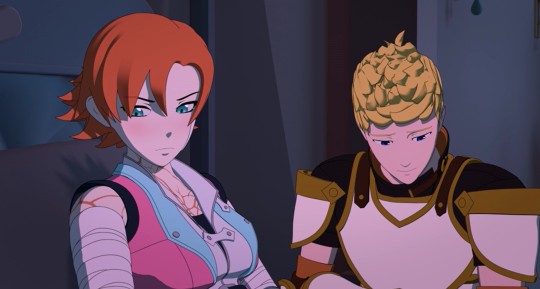
I've said it before and I'll say it again: the refusal to question Ruby makes me incredibly uncomfortable. Is this as bad as Ironwood shooting someone who questions him? Of course not, but that doesn't make it good. The group has made it clear from Ozpin to Ren that if you put a toe out of line, that's it. You're gone. You are not a part of the group until you are willing to back the group 100%, no matter what horrible things they might be up to. That Nora yells at Ren for questioning and Ren learns to keep his mouth shut, apologizing to both her and Jaune for speaking his mind is... well, it's horrible. That's not friendship. I know the fandom doesn't want to hear that given how much we otherwise love these relationships, but it's not. If you can't question and voice concerns without about serious topics like this without the threat of abandonment — literal or otherwise — then that's not a friend group you should be sticking with. Ren’s "biggest failing as a teammate and a partner" is that he didn't agree with the others and didn’t immediately change his mind when they demanded it. There are awful implications attached to that, especially since Ren’s perspective was a good one. He’s not out here slinging horrific views like, I don’t know, homophobia at the bee’s non-relationship. He just went “We made mistakes” and the group responded “Absolutely not. Absurd. Fuck you.” They didn’t even consider that position, which speaks to both a lack of respect for Ren and a level of arrogance that keeps getting them into trouble. But these issues are easily overlooked given everything else that surrounds them. Outside of Ren's apology, I quite liked the renora moment. We got a detail about Nora's backstory! She called Ren pretty! We got an "I love you"! He booped her nose!! It's all very cute and wholesome... and soured by the knowledge of what Ren had to do to get here.
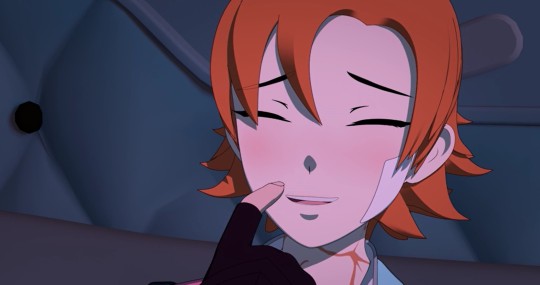
Outside of these generalized responses, there are three other points I wanted to make about this scene:
Yes, more obligatory humor to ruin an otherwise serious moment. Jaune could have just smiled softly and slipped out. Or have him leave before the conversation started (because Ren shouldn't have been apologizing to him in the first place...) Instead, we got multiple seconds of him being awkward, including a bunch of funny sound effects.
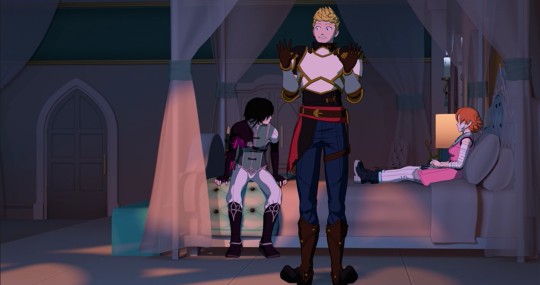
I'm legitimately happy we got that "I love you" — outside of the problems since arriving in Atlas, I've always enjoyed the ship — but coming on the heels of last week's episode, it makes the bee's forehead touch look even worse. Renora has been confirmed multiple times at this point, but we still can't get something overt for our one, queer ship.
On the one hand, I really like that Nora set a boundary here — a surprisingly mature conversation for RWBY — but I'm confused as to what exactly the boundary is. She says she needs to figure out who she is without Ren, but what does that translate to on a practical, day-to-day basis? Normally, when a couple needs to figure out who they are they separate, but renora can't do that. They're still on the same team, stuck in the same war, presumably off to do the same things they've always done together. It sounds great on paper to say that Nora is going to discover who she is without Ren, but unless they separate again I don't see how that can happen. More likely, we'll get a volume or two of them looking and acting exactly as they always have, but when it comes time for relationship drama again, Nora will insist she's a different person who is now ready to be with him. That she's changed. But change requires, you know, making a change, so is renora actually going to look any different moving forward?
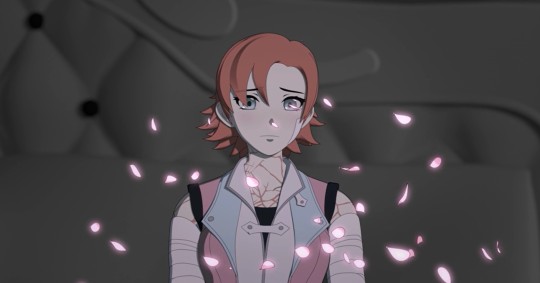
While these two confess their love but also decide to be separate (is that what happened?), Qrow and Robyn have knocked out some guards and retrieved their weapons. Robyn watches four security feeds, whispering, "He's... really gonna do it." See? Even Robyn, someone who never liked Ironwood and considered him dangerous from the start, is in shock that he would go this far. Qrow doesn't want to talk moral downfalls though, he's all action: "Not if we stop him first."
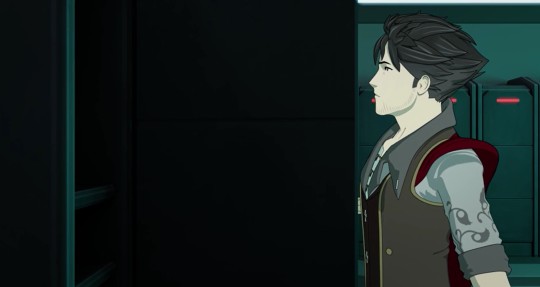
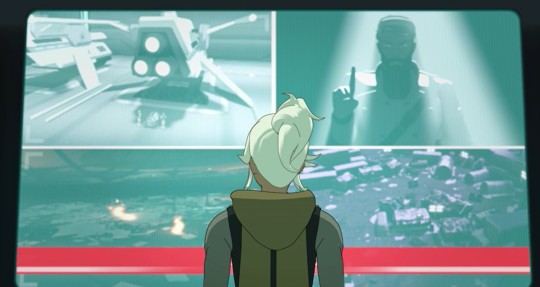
You know, at least Qrow is doing something. What he's doing is stupid, particularly given his motivations, but with the volume we've had I give him props for coming up with a plan and sticking to it. That's more than many of the others have done.
Yet then, suddenly, Robyn doesn't want to kill Ironwood. ...Since when? Robyn has been the most trigger happy of the lot while Qrow initially wanted to talk. Now they've switched places for no reason I can see, with Qrow all murder happy and Robyn cautioning restraint. Which admittedly isn't uncommon. Remember how Nora was all about protecting Mantle and then randomly decided to help with Amity instead? Remember how Yang was critical of Ruby and then decided to defend her to Ren? Remember how Hazel was pro-Salem until he saw a blue naked lady and decided to defect? At this point, characters just do things at random.
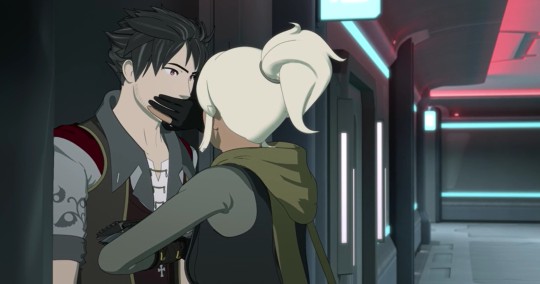
Robyn says that Qrow isn't trying to kill Ironwood because that's the right thing to do, only because he wants revenge. A true enough assessment. But then she follows it up by claiming that Qrow is a better huntsmen than Clover because he does the right thing. Without rehashing all my arguments regarding how Clover was not the devil incarnate for refusing to let two potential criminals walk free — especially after they attacked him — we're really playing the dead guy card now? Clover was murdered. Robyn and Qrow were participants in that murder. Now Robyn is making sweeping claims about who is the better person when Clover quite obviously isn't here to defend himself? That's all kinds of messed up.
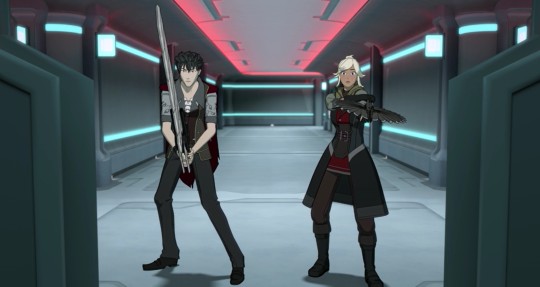
Before they can bash the dead guy anymore though the elevator arrives. We see Qrow and Robyn's shocked expressions at whoever is behind the doors, presumably Winter and Marrow. It seems likely that Winter didn't really intend to take him to the brig. They're defecting and have now found two more allies to help them. Robyn wants a plan other than run upstairs and stab Ironwood? Winter will likely provide one.
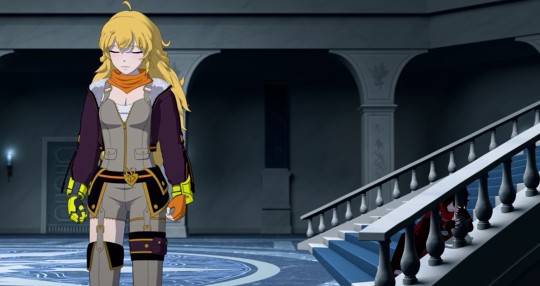
We return to Ruby who, as established, is wallowing in the most dramatic position on the staircase. Obviously things are legitimately horrible right now and if Ruby had been given a storyline different from what we've seen since Volume 6, I'd feel sorry for her. As it stands, it's just frustrating to watch her look like the maiden of a Victorian novel while Mantle's time ticks away.
The conversation between her and Yang is great though. At least, it is for the first few sentences. I love that the show remembered they're sisters and have them talking again. I love that Yang tries to cheer Ruby up by saying she outshines her big sis in regards to the Hound. I love that she nevertheless acknowledges that the Schnees were a part of that defeat, giving them their due rather than putting all the praise on Ruby. We establish that Yang has learned what the Hound really was. This conversation is going strong...
...but then.
"That's what happened to mom."
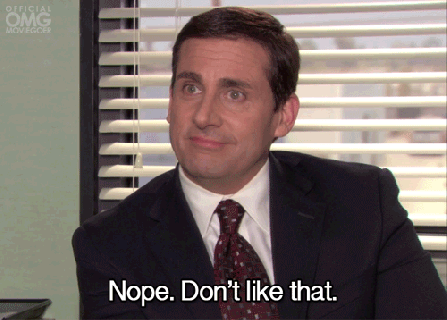
Really? Really? In eight episodes we went from, "Lol just because the Hound spoke doesn't mean Summer was secretly made into a grimm. That’s a crazy theory" to "Summer was absolutely turned into a grimm. That's canon now!" Except because it was made canon by Ruby just announcing it one day, we can expect for an even bigger "twist" in the future: Summer is still alive. Why wouldn't she be? The Hound was untouchable outside of silver eyes, so we have little reason to think anyone has defeated her in the last 14 odd years.
I'll admit the timeline works out better than expected (I think) with Salem killing SEWs during Maria's time before switching to experimentation, but there's no emotional weight to this. I just don't care and frankly I don't think the fandom cares either. Oh, there's plenty of excitement over the reveal, but that's all for the version of Summer Rose people have built up in their minds for the last eight years, not anything that exists in the show. If you strip away all the headcanons and fics, Summer isn't interesting because she barely exists. We know nothing about her as a person and therefore we have no reason to care that she's likely another Hound. Worse — because maybe this could be smoothed over if we just care since Ruby cares — everything else surrounding this reveal was badly done. Summer, as said, has been a non-character for this whole series. Yang only just remembered two episodes ago that Summer is her mom too. The only evidence of experimentation we've seen is on other grimm, not people. There was more mystery surrounding why Tyrian was interested in Jaune, not why he'd kidnap Ruby (Big Bads always want to kidnap heroes). We have no idea who this silver eyed faunus was. We have no idea why Salem would randomly start experimenting when she doesn't need additional weapons. We don't know why she would keep these weapons to the sidelines when she’s apparently had them for over a decade. I don't even buy that Ruby, someone who we never see thinking about or questioning any of this, suddenly put all these pieces together to hit on the revelation.
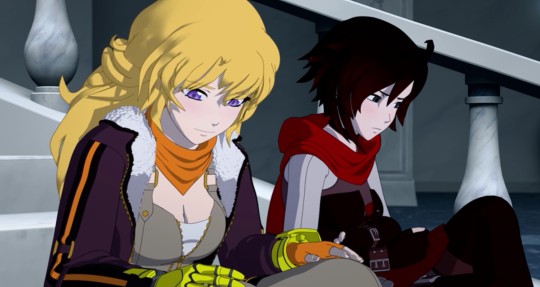
None of this adds up because it wasn't planned. Summer was dead, added to the series purely because having a dead mom is interesting, and she was treated as dead for seven years. Not just by the characters, by the show. Then, suddenly, the narrative raced to remind everyone that she's supposedly a Very Important Character so we could get this twist. It’s awful. Not because the idea itself is horrible, but because it was shoved into a story that wasn't prepared for it and certainly doesn't need it. The group has Salem herself attacking the kingdom, Ironwood threatening destruction, three Relics still to discover, not to mention all the other personal conflicts going on — Emerald walking around the mansion, Ozpin is back, Penny is being controlled, Oscar has finite magic now, Nora is still recovering — but we're going to introduce another subplot to deal with? RWBY acts like it's terrified that if it doesn't add something new and flashy every third episode, its viewers will jump ship. Despite its hiccups, there's a reason why the arcs of Volume 4 worked well overall: characters were given the time to explore specific problems, like Yang's PTSD and the destruction of Ren's village. Now, in episode 11 of 14, RWBY reveals that two of the characters' mom was turned into a literal monster, but there's only time for a tiny bit of comfort because Penny is escaping and they have less than an hour now to save Mantle. There is way too much going on and we're not devoting enough time to any of it.
Hell, even the conversation can't afford to stay on the Summer reveal for more than a few sentences. Ruby segues back to her self-chastisement, saying that she wasted time on Amity. She did, but not because people didn't come. She never should have made that terrifying, nonsensical announcement to begin with. But just like Ruby never thought through the pros and cons of telling the world about Salem, she apparently never thought about the logistics of getting help. She's written the world off now — so you just know help will appear in the finale — yet she never considered how long all this would take. Our timeline is (supposedly) two days, so how long would it take a kingdom to digest the information she gave them, decide on a course of action, get people and resources together, then fly all the way to Atlas? After Ruby used most of the first day just to send the message? As I and others have pointed out, the answer is “way longer than the group has.” It shouldn't be possible, yet neither Ruby nor Yang realizes basic facts like, "What's the flight time between Vacuo and Atlas?" Like Qrow blaming his semblance rather than his decision to team up with Tyrian, Ruby blames the world for abandoning them rather than her terribly thought out plan. Both have reached the right emotion — regret — but not for the right reasons.
Also, Ruby says that Amity fell. Are Pietro and Maria okay??
Yang talks about blind optimism vs. no optimism at all, something I could really get behind if the group hadn't been governed by blind optimism this whole time. Also if what the rest of what Yang said made sense. She fires back with, “And in case you didn’t notice, my plan for Mantle didn’t work either." Uh... what plan? As far as I recall there was no plan. They just went down to do any tasks that needed doing: supply runs and grimm killings. What plan is Yang talking about?
This conversation is a disaster. We circle back around to Summer with Yang saying she also took a risk (the title is very obvious this episode) but "she's still my hero." Is she? Because the only thing you've ever said about Summer is that she baked great cookies. Regardless, Yang lays her head on Ruby's shoulder and they cry some more.
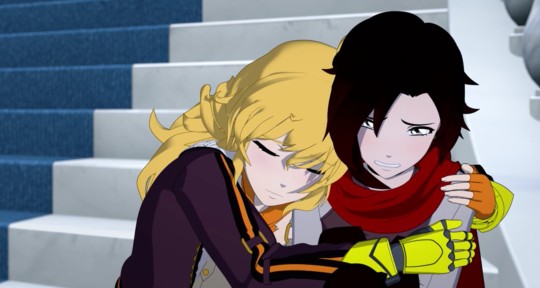
Then Jaune hurries down the steps because Penny has woken up and broken through a window.
Again: how were they planning to deal with this? Did anyone discuss it? Because it looks like Klein said, "Hey, that friend of yours powered up and could have hurt us," Nora said, "Hey, Penny was fighting some sort of control," and Whitely said, "Yeah, she wanted to open the vault and then self destruct" and everyone just left her alone in some room, deciding they'd worry about that later. If Penny had just snuck out a little more quietly the group would have been screwed.
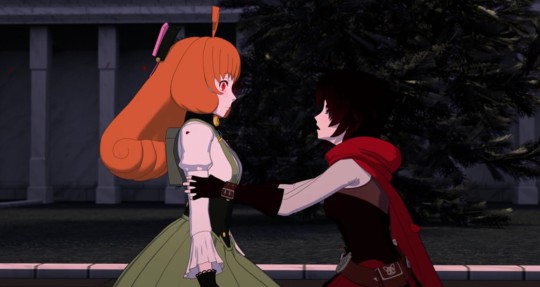
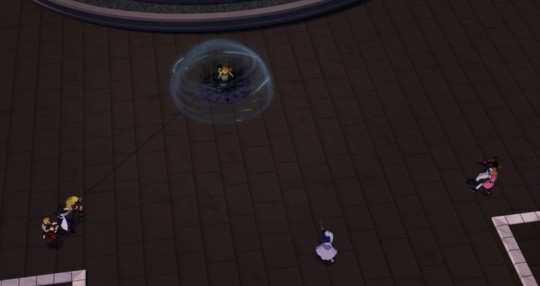
What I do like though is the teamwork to keep Penny from flying off. It feels like we get so little teamwork nowadays, which makes everyone piling on others' range weapons, or Jaune boosting Weiss' glyphs, really enjoyable. Even Emerald gets in on the action because apparently they gave her her weapons back!
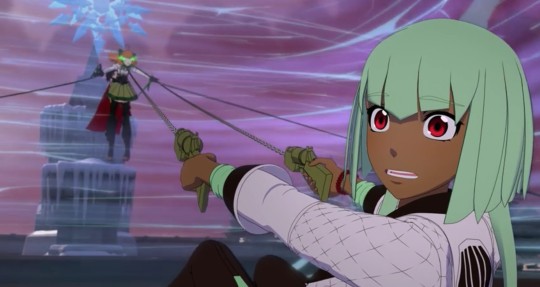
We're going to talk about this nonsense in a second.
For now, Ruby implores Penny to fight it, which is exactly what I said we'd get. Penny insists Ruby kill her though, saying that if she does she'll ensure that the power passes to her. I find this to be a weird priority. Does the group really care about who gets the Maiden powers right now? The threat here is that Penny will successfully open the vault — which shouldn't even be that much of a worry. Just let Ironwood leave instead of trying to destroy Mantle! Keeping him here has made things worse! — and that Penny will self-destruct. That feels like the biggest worry: that Penny will die. So they're going to prevent her death by... killing her themselves? Priorities and motivations really feel shaky this week.
Luckily, Ruby remembers that Penny is A Real Person and tells Jaune to amplify her aura. The fact that she has a soul keeps the virus from overtaking her. Hurray!

That's like saying my sense of self will beat off rabies. Just believe that you're your own person and nothing can touch you. They go so far as to say, “That’s who you are. Our friend, not a machine” and that feels like such an erasure to me. Penny is a machine. She is! And that was great back when this was accepted as a good thing, not something to ignore. Remember this?
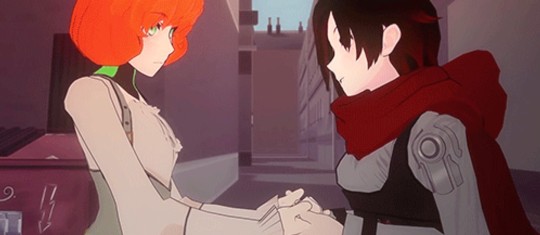
You think just because you've got nuts and bolts instead of squishy guts makes you any less real than me?
Here, Ruby acknowledges Penny's difference and reaffirms that she still has worth. Now, the group denies Penny's difference in order to prove that she has worth. She has worth because she's supposedly not a machine and supposedly can't be controlled like one... even though she is a machine and is being controlled. It's only Jaune's semblance that keeps her from going under again. The concept of Penny's personhood is now connected to her ability to resist a machine-based virus and she has failed to do that. This doesn't confirm Penny's humanity, it tells Penny (and us) that humanity is distinct from the machine parts of her, rather than a concept that includes it, and the moment she is too influenced by that machinery she ceases to be a person. The group isn't accepting her here, they're encouraging Penny to ignore and deny the parts that make her Penny.
If you want an example of how to do an arc like this far, far better, go watch The Next Generation with Data. He's what Penny could have been.
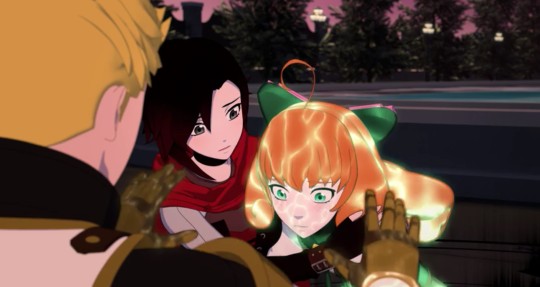
Regardless, the virus has been held at bay, at least so long as Jaune has aura. Which seems to be endless given that he was exhausting himself in the whale, but is now boosting Nora, Weiss, and Penny without any difficulty.
At least that's a minor concern in the grand scheme of things. What we're about to get? Not so much. Honestly, I'm 7k into this recap and I just don't have the energy that these two scenes deserve. Which scenes? The one where Emerald is welcomed into the fold with laughter and Ozpin has to grovel for forgiveness.
Emerald first. Last week I said:
“However this fight ends, we could really use someone like you, [Emerald.]” That’s it then. Discussion over. We knew as soon as it started that blindly trusting her was being presented as the “right” thing to do and now here we are, deciding that conclusively, despite Jaune and Yang’s complaints. By the time the group reaches the mansion, Oscar is defending Emerald from Ruby. We’re supposed to just accept that she’s a part of the group now, only minimal pushback allowed.
and I was right. Over the course of the last week I spoke with a number of friends, many of them working under the belief that this was just the start of an arc for Emerald. Obviously the show wouldn't instantly have the group trust her after all this. They'll need to warm up to her first. She'll need to prove herself. Well, I was far more pessimistic, arguing instead that I thought this was it. She was already being presented as a perfectly trustworthy figure. I'd briefly thought I'd been mistaken when the group turned on Emerald for her comment to Ruby, but then suddenly she's been given her weapons back. It's not even a matter of "You should be able to defend yourself, but you're still not trustworthy" (which would still have problems, but). No, she makes a comment about "switching sides" and that's it, trust achieved. That's all it took — nothing at all.
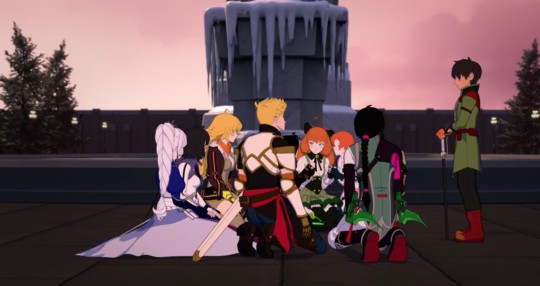
Now, some shows do function on a second chance policy. We can name hundred of stories where heroes instantly forgive antagonists and there's nothing wrong with that. The problem is that RWBY is very much not that show. In the exact same scene Ozpin apologizes to the group and begs that they try to trust him again:
“I’ve failed all of you. I should have trusted you with the truth and I should never have run the day you discovered it."
This is complete and utter bullshit. Sorry, I'm not mincing words for this one. Two years we waiting for the group to come around, hoping that there would be apologies on both sides, but there wasn't. The group doesn't physically or verbally hurt Ozpin anymore — they do accept his request — but it's done with expressions that say this is what they are owed. You’d better apologize.
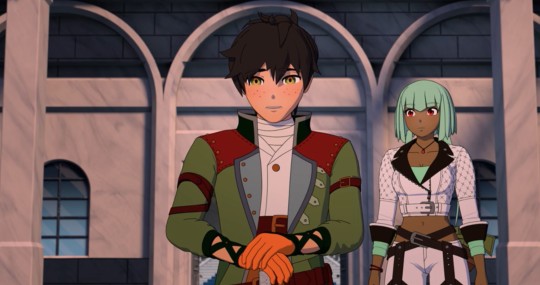
I could rehash all the arguments I've already made about how atrociously they treated him, how Ozpin had no reason to trust a bunch of teenagers, how important it was that both sides admit their mistakes, but if you're reading this recap you're likely already familiar with all that. Rather, what I want to emphasize here is that our opinions on Ozpin don't even matter here. Even those who take his apology at face value — fully believing he did fail them, he should have told them everything from the start, and that him leaving was "running away" rather than being driven off — even if we accept for just a moment that Ozpin is as guilty as the show says and heinous as the fandom claims... surely he's not as bad as Emerald? In roughly chronological order she has:
Tried to ally herself with Adam along with Cinder and Mercury
Helped to attack Amber, resulting in injuries that would have killed her if Cinder hadn't gotten to her first
Helped kill Tukson
Pretended to be a transfer student and Ruby's friend for the rest of the semester (that’s a lie that would breed mistrust)
Tricked the world into thinking that Yang had attacked Mercury unprovoked
Uses her semblance on Pyrrha, causing her to unintentionally kill Penny
All of this was in service of the Fall of Beacon, an event that destroyed a school, killed an unknown number of students, killed Pyrrha, and lost Yang her arm
Participated in the attack on Haven which, beyond the intent to further Salem's goals, nearly got Weiss killed
Came to Atlas to assist in the next attack
Went after Penny, Pietro, and Maria — two of whom might still be in trouble depending on if Amity literally fell out of the sky
Listened to Oscar being tortured, hemming and hawing for a while before realizing that, if the whole world is in danger, she's in danger too
Finally jumped ship
Emerald is one of the bad guys. All the sad looks over the years doesn't change that. Yet somehow an antagonist we've had since Volume 1 is considered more trustworthy than Ozpin, a man who hasn't intentionally helped kill their friends and who has been helping and apologizing for months now.
Yang "Aww"s when Emerald speaks. Just sit with that for a second. The woman who went through all of that horror because of Emerald, who just last episode was correctly saying they can't expect her to forget all that, is going "Aww" after... Emerald helped hold Penny for two seconds? This is ridiculous. These are the faces of the group when talking about Emerald's trust
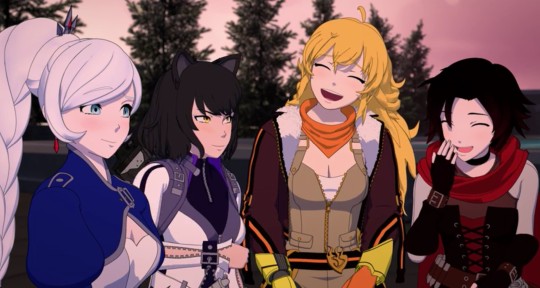
whereas these are their expressions when talking about Ozpin's
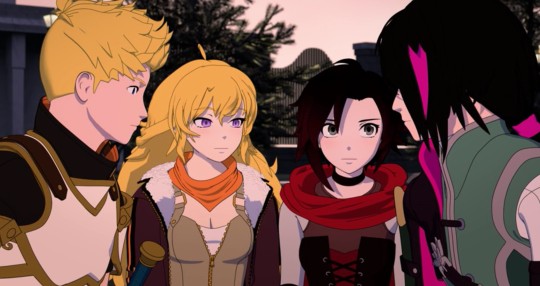
It’s not a matter of who deserves trust or not, here it’s purely a matter of comparison. Emerald should not be more quickly forgiven than Ozpin.
Now toss in the story Ozpin tells. Unsurprisingly, it's another fairy tale — we've gotten a little heavy-handed lately — about a young girl who flees the consequences of a choice and, having never learned from her initial failure, spreads even more trouble. That's Ruby. That is Ruby to a T in this episode and the last three volumes. She is literally a young girl who has caused staggering consequences, literally ran away from the conversation about those consequences, and is now poised to continue making those mistakes because everyone keeps reinforcing her flaws. That's Ruby, yet somehow the show thinks it's Ozpin. He positions himself as the young girl here, as if he didn't face his consequences generations ago when he left the cabin, didn't learn from his mistakes by keeping Salem's secret, and hadn't been driven away by the very people he's asking for a second chance. This scene has everything backwards and while normally I'd grab hold of the possibility that maybe things will right themselves later on... we're done. This is the ending of that arc. After two years of saying, "Maybe, maybe, maybe," Ozpin has been taken back into the fold after begging his way back in. There's no more time to correct things. RWBY missed its chance. Weiss says that "Trust is a risk" and that's how Ozpin is forgiven. They have taken the risk of trusting him again after months of reflection, life-saving actions, and apologies. Emerald is granted the risk of trust in under an hour. I’ve heard so many people say they’re dropping RWBY this volume and scenes like this are precisely why.
Ugh. Heavy stuff, folks! I feel like I need to lighten the mood. Here, let's take a moment to acknowledge that the Schnees and Klein only marginally know what's happening.
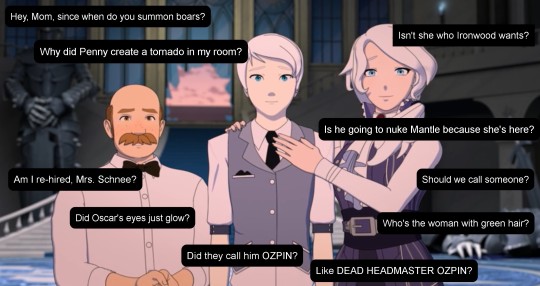
Someone help them.
That is, to all intents and purposes, the end of our episode. Ruby has some sort of epiphany about actually handing Penny over — "That's actually a risk we haven't considered" — and Ironwood will no doubt fall for whatever plan they've concocted because he's stupid now. He receives a call from Ruby saying they agree to his terms, Watts is attempting to get communication of his own up and running, and Neo arrives to do... whatever she intends to do. Idk, I have assumed she wanted Ruby, but Cinder obviously doesn't have her yet for a trade off. Regardless, Neo is ready for a fight while Cinder just smiles. Team up 2.0?
As for bingo, I'm using my free space for "Worst redemption arc I've ever seen," with an honorary nod to Hazel too, and Ozpin's square gets blacked out in exes because that was just #bad.
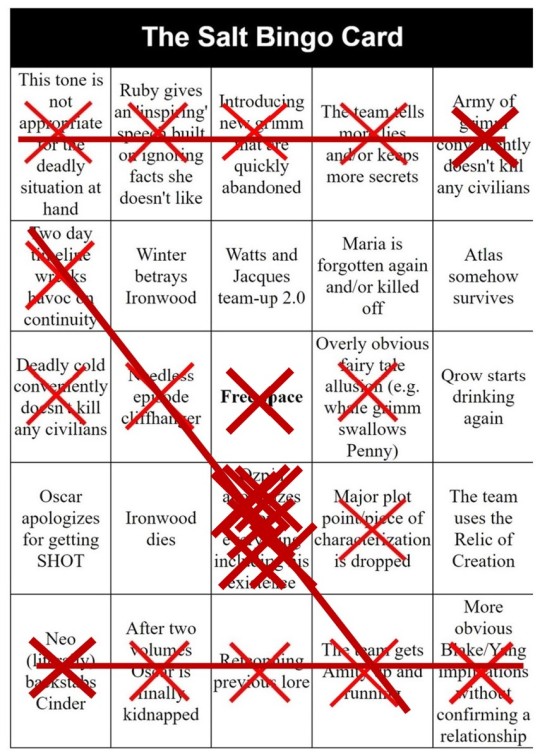
This bingo board is a mess. Appropriate lol
Three more weeks, everyone. Hang in there! 💜
137 notes
·
View notes
Text
S E O N G H W A ⥈ mafia au series
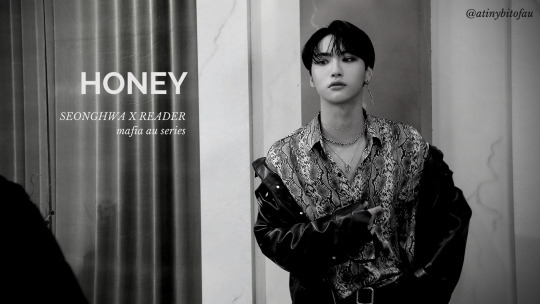
RECAP: training with the boys begins and frustrations between you all get heated. Seonghwa offers you a kind gesture of motivation to get you to learn how to fight.
word count: 1600+ , tags: angst fluff
characters: ateez (ensemble), reader
⤩ CHAPTER 3 ⤩
character list . one shot
“So what DO you know how to do?”
Yunho has never recalled seeing such a pathetic attempt at shooting in his entire life. Up until today when he saw the way your hand trembles around a gun. San, on the other hand, was elated to watch you suck at every single thing you tried to do. You were downright frustrated knowing: learning how to shoot, physically defend yourself, and fighting back wasn’t something you sought to learn.
He kept his hopes high though, Yunho, wanting to see you prosper at the side of his ruthless boss. And even if San thinks otherwise of the circumstances, Yunho assumed your place beside Seonghwa would do the heartless southside king justice. Being with him for so long, Yunho knew of Seonghwa’s shortcomings. Love was undoubtedly one of the assets Seonghwa never had. Seeing as he’s at least trying, Yunho wanted to help out the fact.
He had become frustrated too whilst teaching you and decided maybe you needed a breather.
You were quiet despite San’s failed efforts to get into your head with his rambunctious insults. You only stared at the ground while the other two pondered over new ideas. You weren’t trying at all. You’d like to think it’s because you refuse to take part in justifying yourself for a self proclaimed husband. Honestly, you just had little motivation to try let alone exert any unnecessary efforts.
“Your husband’s arrived early.” A meddling voice fills your empty mind. “He��s on his way to pick your ass up so look alive.”
Your lips curt a faint affirmation before taking your things and beelining for the building’s locker room. There was soft excitement that frenzied deep down in your stomach as you changed. Not that being around a bunch of buffoons bothered you much but you’d much more prefer the company of a senile swine like your husband than them any day. As pathetic as they sounds to you...
San’s picking at his nails cooly on the outside patio while Yunho leans against a pillar. You’re sat cozy in a chair with your bag over your lap as you all await the said mob boss’ arrival.
“Fashionably fucking late, as always.” San seethes through gritted teeth. “Does that asshole not know I have better things to do than babysit his sorry excuse for a wife?”
San was getting sick and tired of it already. Of course, unbeknownst to you, San absolutely adored his precious leader. It doesn’t excuse the fact that your obnoxiously attractive self gets to settle down with his own first love. To add to it, Seonghwa was effortlessly throwing you around like a treasure that must be watched at all times. Somehow, San realizes the time Seonghwa claimed he had when bargaining his new gift did not exist. So here San was doing Seonghwa’s bidding yet again.
Yunho notices the clench in San’s tight look and glares into his own. “Sannie. Let’s not get careless.”
“Bastard better think twice if he thinks I’m gonna still be sleeping in his house after this.”
San glances at you with no momentary comfort before sticking a cigarette into his lips. You note the face of shock that masks on Yunho’s face but says nothing at all.
“He’s here.” Yunho coughs out while glaring at the cancer stuck between San’s lips. “Kill that stupid thing.”
“With pleasure.” San growls back eyes groveling at you.
“San.”
You stand up upon seeing Seonghwa’s knowing glare from the cracked window of his sleek black SUV. The tables turned on the fellows around you when your heels flick on an opposite direction. Being unwanted never bothered you. Being unwanted forced into a situation has not once bothered you. Being victim to it and having the choice to walk out? Now that’s an additional option you’ve never always have and will always willingly take. You don’t do unnecessary efforts. And you know when you aren’t wanted.
“Y/n!”
You ignore them with heavy feet trudging in no resolute destination in mind. Your fingers play with the earphones in your bag before placing them in your deafening ears. You’re joined by a slow moving car at your side while you walk in no particular direction away from your fiancé.
“Honey, get in.”
You ignore him with a long press of your volume up button.
“Stop being stubborn, y/n.” His voice gets harder. “If I have to get out of this car so help me god I’ll—“
You snatch an earphone out of your ear. “You’ll have San deal with me?”
He abruptly brakes when you do. You let out a grunt of vexation before placing an earbud back in your ear.
Seonghwa decides to park his car right then and there to throw you over his shoulder like a sack of rice. Your face flushes in the hottest color of pink as you try to break free.
“S-SEONGHWA WHAT THE HELL?”
“This’ll be what stubborn gets you from now on.”
You resort to sulking in the front seat as your husband possesively holds his hand on the surface of your thigh. You don’t bother even looking back at where the both of you left San and Yunho, irritated eyes strewn on the outside of the moving vehicle.
“I’m assuming your training didn’t go too well.” He comments while driving faster this time.
You don’t reply making Seonghwa’s fingers twitch on your lap. So much for convincing yourself you aren’t wanted.
“Y/n, I’m no psychic. You need to tell me if something bothers you.”
You scoff. “And what, Seonghwa? You’re gonna fix it?”
“I most definitely will try if that’s what you entail me to do.”
You don’t move from your position as your husband drives you to what you know is back home. The eerie silence that fills the both of you in the car makes your gut clench. His fingers on your thigh aren’t helping the entire car ride either.
Seonghwa’s presence to you reminded you of air. He wasn’t a nuisance to have around and for an appraising relationship to move forth with lesser issues, that’s a good thing. Actually, to add to the fact, Seonghwa was much more meaningful company than anyone else. He never crossed any unnecessary lines and if he did, he did so with grace. It was hardly something you can’t sleep on.
He escorts you, with a distance between you two, towards your shared room and it feels domestic. There’s little need for words. Needn’t questions either. Seonghwa was far from an open book, but he’s not the type of novel that pegged your fancy anyway.
Seonghwa’s back was to you as he stripped out of his dark suit, shoulders bared with torturous temptation. Your mind was clouded no thoughts head empty when he brings you out of your trance with a slight quirk of his chin around his shoulder.
“I can at least draw to a conclusion,” He just keeps pushing the subject of matter you refuse to shed light on. “that the basics of living with a man like me weren’t taught to you properly then.”
Your face becomes shaded with amusement. “Living with a man like you requires basic training?”
“You always think so little of me, my precious wife.”
You feel like you’re in some fanatical love story— how fast he is to getting to your place, finger upon the tip of your chin. He lifts your gaze up onto his eyes with certainty and slight amusement too.
“I may not be of some threat to you but some people will think of you to them. I’m an expensive man and I don’t spend my money and the likes of it on just anybody.”
A twitched smile screws your expression. “And that’s supposed to impress me?”
“Scare you a better word for it.” He slips on a low cut long sleeve and a pair of casual pants before dropping you onto his lap. “I need to know. That at all times I’m never with you.. you’re prepared to take down the worst.”
Your breath hitches at the back of your throat as his fingers grace the exposed skin on your neck. His lips take upon the deed of pressing a sweet kiss, the feel of pain besting you. You don’t realize in the blur of the pleasure how a throbbing pain lingers where his lips lift.
“I know I promised not to take things too far but if you have no reason to fight, I’ll have to offer you one.”
It’s not a mark of lust nor was it a bite of love. It was a mark for people to see. It was a caligraphy of his own sort, making itvlegible for anyone to read. His lips relieves the vibrating pain and you’re curious. You turn to face him and his breath meets yours. You get caught up in something that isn’t there but you can taste. It was like something you need. A lot like air.
“It was meant for your skin.” He reassures you taking an inch of space back. “It’s not inclined for you to believe it’s also for your lips sake.”
You chuckle softly no blush apparent to his notion. “What a romanticist.”
He boredly hums. “Seems so.”
You wear a shirt that reveals the mark as if you’re proud to bear it. No, it’s not pride you feel entitled to, it’s the meaning. It gives you reason to fight.
Seonghwa stands beside you while you throw punches; in front of you when you kick and swing so he can teach you how it’s done.
It’s then you realize why he’s Southside’s king and why he deserves his title.
“Yunho informed me that your lack of skill was overbearing this afternoon.” Seonghwa speaks highly, eyes dawned with amusement and amazement. “That or I’m just one hell of a good teacher.”
You lean over to help him up. “I didn’t have a reason to defend myself. I think I do now.”
“While fighting me?”
“Something like that..”
@atinybitofau
a/n: ROUGH EDIT
#r:mature#tags: angst fluff#ateez x reader#seonghwa x reader#side!hongjoong#ateez#ateez seonghwa#ateez park seonghwa#park seonghwa#seonghwa#honey#honey chapter 3#honey mafia au#seonghwa mafia au#ateez mafia au#mafia au#seonghwa fic#seonghwa scenario#seonghwa imagine#ateez fanfic#HONEY#ateez imagine
176 notes
·
View notes
Note
yo asking someone to make a wish so half of their heritage is gone forever is fridge horror-level wtfness (thnx TV Tropes).
of course RT and Sunrise chose not to focus on it, and in mythology people do give up divinity or humanity for romantic reasons, but specifically in Inuyasha it was like ‘despite your demon half you can still live a good life’ as if he has some disease 🤨
like I get in history people have had to hide their heritage to survive war and avoid being shipped off to their death or lose their rights, but to ask someone to permanently discard half their heritage and presumably hide their origins until death is tragic as fuuuuuuuuuuu
It's not even that they chose not to focus on it, is that they deliberately portrayed it as this grand romantic gesture from Inuyasha’s part and for a part of the audience, it truly was. But then again, this backfired for people like me, because it only served to proof how desperate Inuyasha really was to fit in.
Poor guy was literally planning on using the jewel to become a full demon just the day before. Then, at Kikyo’s request, he agreed on doing the exact opposite with little to no deliberation other than “what will be made of you, Kikyo?” I can only assume he was afraid her feelings were conditional. That if he had said no, she would have called it quits.
Imagine the same situation, but this time Inuyasha has a support system to lean on. Prejudice against half demons are still a thing, however he has his parents, his friends, a place to belong. Would he still have said yes in order to live with Kikyo? I honestly doubt it.
You see, Inuyasha hates being human. Not in the sense of saying he hates it, but liking it in secret. He actively hates it. And I can’t stress enough that we don’t actually understand how rightfully entitled he is to hate it.
We know how a human body feels like, we’re used to have a human body. Inuyasha is only human once a month. The majority of time he is a half demon. That’s what he is used to. Even worse: put yourself in his shoes. If you were to lose half your strength, half your sight, half your hearing and speed every single New Moon, you'd curse that night too.
Not to mention the sheer vulnerability of being emotionally and physically exposed, of not being able to protect yourself or the ones you care about and becoming a "burden” when he takes pride of being the (un)official guardian of the group. No wonder he felt so hopeless he made a point out of staying up all night. And this is what Kikyo was asking him to feel like every single day for the rest of his existence so their life together could be easier, with the aditional quicker of forever losing the features that marked him as his father’s son. You know, the man who died saving him and his mother.
Every single character that got close enough to find out about his night of weakness quickly became aware of how much he despises it. Now, we don’t know the exact duration of Inuyasha and Kikyo’s relationship, but here are our options: Kikyo didn’t know about the New Moon and that Inuyasha hated turning into human or she did know and decided to go for it anyway.
Considering that the latter option is straight up awful, I’ll just assume she simply didn’t know. What does this say about their relationship? If they were an item for a considerable period of time, how come she didn’t know about such a fundamental thing about him? Especially when people who weren’t even his love interest were aware of that fact pretty early on? What was it worth all that time together if they didn’t use it to have meaningful interactions and get to know one another? If Inuyasha was keeping secrets from her and if she wasn’t interested in learning them?
On the other hand, if their relationship was indeed short lived, that could justify the lack of knowledge, but a different issue raises: if they didn’t have time to collect basic information about each other, how am I supposed to believe in their love? How am I supposed to view the decision to erase his demonic side and live together as anything other than reckless, impulsive and thoughtless? How am I not supposed to see it as mutual convenience, a mean to an end? How am I not supposed to think they are acting out of lonileness and desire to fit in? How am I not supposed to think that if literally anyone else had given them the same options they would have taken it?
A New Moon would have happened in at least one month, tops. That’s not love. That’s a thirty days affair. It could have grown into love, if given the chance, but the pairing seemed more interested in the life they ideolized for themselves than in each other.
I don’t think Kikyo meant it as an ultimatum or that she was disgusted by his demonic attributes. She wouldn’t have approached or kissed him as a half demon otherwise. But I think it’s hard to deny that she wasn’t necessarily fond of them either, since she jumped at the opportunity to get rid of them first chance she got, with no remorse whatsoever. As if it was a bonus. This allowed with the fact that the prejudice against half demons is an allegory for racism and that she used from false equivalence to make the point that both her and Inuyasha were in the same situation puts her in a bad light.
Inuyasha was isolated by people because of his heritage, something he couldn’t change without resorting to intrusive, traumatizing and permanent magic, which Kikyo herself suggested he did. Kikyo isolated herself. People loved her because of her status and she was a privileged woman in comparison. She could have dropped everything since she was unhappy living like that, but she spontaneously chose her duty and powers over love and an ordinary life. And as much as I disagree with her choices, I can at least respect and understand them. What I can’t do is feel sympathy for her when the consequences of said choices catch up with her.
The narrative doesn’t give this problem much focus, it treats it in a much more subtle way. For instance: the jewel only being destroyed by the right wish, paints wishing for Inuyasha to become human as wrong and selfish, with the potential to be catastrophic.
That being said, Inuyasha didn’t hate being a half demon, on the contrary. What he hated was being ostracized over it, so he decided to take matters on his own hands and, when he was free to choose between using the jewel to become a full demon or a human, he went the full demon route because he knew living as human would made him miserable. But the desire of being a full demon was a facade. What he so very clearly wanted, all along, was to be accepted the way he was. That’s why he had no trouble letting go of that goal to pursue the exact opposite: there was no attachment to it. Full demon or human, he longed for a place to belong. If Kikyo was offering that to him, of course he would have taken it, even if becoming human was far from being the first choice.
Compare that with Inuyasha finally giving up from becoming a full demon, realizing he didn’t have to change at all, that he had a place to belong and people who loved him not despite of what he was but because of it, that he could be accepted as a half demon. Compare that with Inuyasha ending up with the girl that always encouraged him to be himself, with being comfortable enough around her to follow his instincts and embracing his canine mannerisms rather than shutting them down, which he didn’t quite did with Kikyo... The message is clear:
Kikyo should never, in any circumstance, have asked that of him. The implications of it were really bad and on paper it was a win-win situation for her because getting rid of the jewel to become an ordinary woman was something she already wanted. He was the one with the short end of the stick, sacrificing everything without the same level of compromising from her part.
And Inuyasha should never, in any circumstance, have accepted this deal. As his love interest, Kikyo should have been the very first persond advocating for him not to change. If the feelings they had for each other truly were love, then she should be the one helping him getting to terms with himself while he does the same for her, not legitimizing the absurd idea that a part of his essence was less worthy of existing than the other, that he should have be the one to change in order to fit in, rather than the people who oppressed him.
Thematically, even if subtle, the narrative did a decent job out of showing the audience how fucked up the whole thing actually was. What it failed to do was making Inuyasha and the others realizing how wrong it was and holding Kikyo accountable for her actions by making them talk about it.
Because God forbid Kikyo gets vocally told she was wrong (even though she often is) and God forbid Takahashi give Inukik the tiniest bit of substance and relationship development.
#Sorry if I'm not making any sense#I apologize for my rambling#And for taking so long to reply#But as you can obviously see I got carried away#Sidmailing
9 notes
·
View notes
Text
I Promised You The Moon rant
Just binged it and this was from the episode by episode reaction/discussion with my partner in crime @glossyboy.
First of all, Oab stole the show, singlehandedly, which he's not supposed to. I don't think anyone expected it including himself. In the very top post when I searched his name on tumblr, he said this lol
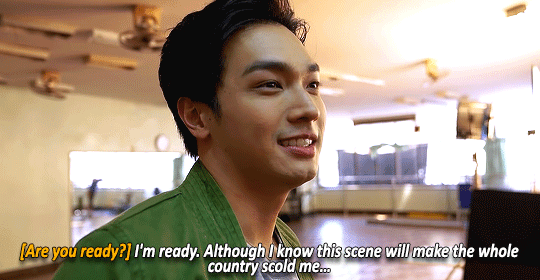
But the truth is he played one hell of "villain" that required a very nuanced performance and he delivered it in a believable and graceful manner. Jai became the catalyst of the entire season and his rather complicated relationship with Teh was the highlight of part 2.
EP 1
From the very beginning it's clear that part 2 is very much a Teh's story rather than a balanced story about two young people's journey as a couple in the next chapter of their lives. It makes me uncomfortable they made Oh-aew clingy and pessimistic without giving him any character development.
The best part is probably the opening scene where they went paper-rock-scissors to decide who's gonna buy condoms. It felt authentic, the expectation, the hesitation, the mischievous act, all fits their characters well. Other times ep 1 was more like two adult kids playing house, literally in an empty giant ass upper middle class apartment.
EP 2
It's great that they poked the femininity vs. masculinity issue through Oh-aew, but stopped right there at the surface. Missed a perfect opportunity to go head-to-head with the controversial topic, start a debate, crush the stigma of femininity, bring something new, be a real game changer of the BL genre, and most importantly give Oh-aew some concrete character development. Part 1 showed us a gay character that's very comfortable with his sexuality and femininity, that's almost revolutionary in Asia, not as a comic relief but a leading role. Oh-aew questioned his own sexual identity once in that bra wearing scene, it's straight out of comfort zone, BOLD, and transgressive. So I expected more from part 2.
That's it? And they're already sophomores? Can't believe Oh-aew's character has been marginalized like this. It's pathetic.
But I love the brutally honest conversation at the end where Teh vented his rage and despair regarding his frustration of acting. He was acting like a dick because he's disappointed, and scared. Teh again was not afraid of showing vulnerability, making the reconciliation very realistic and touching.
EP 3
Dare I say I freaking love ep 3! The unresolved (partially sexual, but not entirely) tension between Teh and Jai was over the roof! And the built-up to their kiss was very authentic, which paled Teh and Oh-aew's much sidelined storyline, including the long anticipated sex scene (still can't believe it happened right after Jai explicitly instructed Teh to do it after the two spent a whole night bonding, like wow! Totally TRANSGRESSIVE and to some extent, kinky.) Teh looked up to the senior, idolized him, wanted to be good for him and make him proud, thirsted for the validation from him, which was mixed with affections. The workshop diary was a brilliant idea to let them open up to each other and eventually bring them close. This was what a meaningful arc of a story looked like. By contrast, there isn't a single moment between Oh-aew and Teh in part 2 that made me go "Damn it's soooooo hot!"
I know Jai/Teh wasn't the endgame but I appreciate the storyline so much. It's a very bold move considering it broke the over-glorified "one true love in one's life" fantasy of its target audience, mostly young cis women. The popular narrative of "you can only love one person through your life/one true love" in romance fictions/chick flicks was totally smashed. And it wasn't written just to stir up things between Teh and Oh-aew, it wasn't a silly fling. Instead, it's meaningful, complicated, natural, and realistic, delivered by nuanced and excellent acting from two young actors. It's hilarious that fans hate Jai with a passion and call him names.
And big news, Jai is bi?! Bravo! He's radiating bi vibes since his first appearance.
I kind of gave up at this point, the season wouldn't do Oh-aew any justice. Like my partner in crime pointed out, the costume design literally threw some "incongruous female fashion pieces" on Oh-aew, made him dye his hair red, without...making any actual point of his personality or his character development. Wardrobe was supposed to make a point in storytelling. Yes, PP wearing pink is cute, and? There's nothing else for Oh-aew. Unfortunately he's reduced to this sulky, crying, and wronged partner in a failing relationship.
EP 4
Oab again was killing it. The tension between Jai and Teh...from the rehearsal in front of Oh-aew to the dressing room pep talk, was incredibly intense and hot AF.
Was it a manipulative relationship after all? Oab was so good at conveying a character with many faces. Jai's a mentor to Teh, also a good friend, their relationship was genuine. He's also ambitious with his own goals, he used, challenged, provoked Teh in a way that benefited them both. It made sense the title of part 2, I Promised You The Moon, was from Jai's script. He promised Teh what the junior wanted the most, a bright future in acting. Teh's unconventional and unspoken feelings for Jai was the best part of the entire season in terms of creative writing, it's complicated, fragile, delicate and completely heartbreaking.
The after talk in the hallway was so well-written. It's funny (Teh joking about playwrights always write about their EXs is gold), intimate yet meticulously controlled, no one lashed out or wept. Both knew what they signed up for and Jai particularly made it clear about his motive and the purpose of the "special workshop" beforehand (or right away.) Yet it's no one's fault that Teh got carried away. He's younger, he's immature, he's more into it, it's totally natural. It's so romantic when Teh's singing karaoke in the bar with Oh-aew, yet he couldn't help but desperately staring at Jai on the floor, knowing he and the man who just turned him down were never gonna happen, they were done, but he's still madly attracted to him and his talent. He fancied Jai, at least the idea of Jai, a playwright, a director, someone knew him better than himself. That hurt beautifully.
EP 5
Teh/Oh-aew endgame at this point was pretty meaningless. Oh-aew as a leading character never got any solid character development over a span of four years. What happened between Jai and Teh wasn't just "cheating", though they surely made it look that way, like Teh's empty promise of "I won't see him again after the show ends". No matter how Oh-aew and Teh eventually reconciled, there's no emotional connection, no sparkle anymore between the couple.
But I knew for a fact they had to. Otherwise it's too much of a risk financially for the series. The creators had to take the easy way out like most traditional romances—one of the most contrived and formulaic trope where the male leading character made a mistake (usually cheating) and realized he's wrong, he deeply hurt the female leading character (Oh-aew was merely a girl substitute in part 2), then he completely changed for hell knew what reasons, started doing every nicest thing in the world to try to "win" the female character back. It has been feeding the emotionally-deprived cis female readers/audience who are frustrated with heterosexual relationship irl for decades. The formula that made romance outsell other genres of fictions combined in the 60s and 70s still sells today, under the name of boys' love. It's pathetic to see Oh-aew confess to Bas that he always "lost" to Teh. Love shouldn't be some kind of game or competition, there isn't winner or loser in love. Love is spontaneous. Oh-aew didn't lose because Teh developed feelings for someone else, and he didn't win when Teh begged him for reconciliation. People change, people move on.
And as predicted, they went for it. The ending was so absurd and tedious.
Overall, Jai's probably the hardest villain to play, he needed to be REALLY GOOD to be "the bad guy", to make his role conceivable. Oab absolutely nailed it with his talent and experience. He's not even my type or extremely good looking yet I'm 100% SOLD. I immediately re-watched the scene of him kissing Teh back hungrily at the end of ep 3 like I used to re-watch Teh/Oh-aew's steamy make out session at the end of episode 3 part 1. Coincidence?
I like some parts of both seasons for the same reason, each challenged and tried to break some outdated/contrived narratives in the BL genre. Part 1 took on the sexuality taboo by showing two same sex characters sexually attracted to each other, no more "I'm not into boys, I just happened to fall for someone of the same gender" or "pure love" bullshit. By staying true to the characters' sexuality and actually showing it with explicit, intense (and beautifully shot) scenes, the gay characters were normalized. They weren't just pure and innocent, no one was. And it created two of most unconventional gay characters in Asian pop culture, Oh-aew, a beautiful boy who's very comfortable with his own sexuality and femininity, not passive at all, taking initiative to pursue what he wanted; and Teh, a sensitive, caring and vulnerable boy who cried a lot, he's confused but also sweet and brave.
Part 2 tackled the "You can only love one person through your life" trope with a very nuanced story of "cheating". Yet neither carried out what they started. Part 1 fell short of a revolutionary piece that stayed true to "adolescent sexual turmoil", dismissing bisexuality and becoming a typical unrealistic BL fantasy in the end. And Part 2, ugh, forced a "happy ending" that almost no one digs. I understand it's extremely difficult and risky to disrupt the established norms of a genre. But sometimes being transgressive and progressive could be the same thing. A story, an artwork, has to challenge something in order to create something new and compelling.
#i promise you the moon#i told sunset about you#ipytm#oab oabnithi#billkin#pp krit#rant post#asian lgbtq dramas#lgbtq#i promised you the moon
17 notes
·
View notes
Note
What's amatonormativity??
I’d encourage you to go to Google or check out tumblr tags and posts on amatonormativity to learn more!
Amatonormativity is the internalized cultural mindset that romance is default and central. It especially conceives of romance as the single most important relationship in someone’s life, to the point it should be focused upon and sought out above any other bond. It treats romance like the universal ultimate solution to any of our emotional bond problems (loneliness, intimacy, trust, support, longevity of relationships, etc.). Amatonormativity is heavily ingrained in many societies, like the mindset I find in people in the United States.
Of course romance isn’t a bad life experience! For many people, it can bring great joy. When people criticize amatonormativity, people aren’t criticizing that romance can be a great thing in someone’s life. The problem with amatonormativity is that it treats romance as the ULTIMATE thing, the ONE solution to our need for emotional fulfillment.
It’s important to understand that amatonormativity has profound negative side effects, whether you’re allo or aro, whether you’re queer or straight, and whatever gender you are. Society takes a lot of things for granted regarding romance and this can stunt our happiness. It stunts our ability to bond with other people around us or find satisfaction within our lives.
Amatonormativity underlies emotionally stunting assumptions like.....
(disclaimer... I will often use language defaulting to the Western cishet perspective, because that’s the mindset of my broader society... I myself am an aroace enby and have more nuanced understandings of gender, gender expression, gender roles, sexual attraction and identity, romantic attraction and identity, etc.)
Automatically assuming that just because a man talks to a woman, the interaction MUST be romantic in nature (this of course intertwines with heteronormativity -- many of my points will intertwine with heteronormativity). It assumes there’s no such thing as “just friends” between people of “opposite” genders. This in turn can result in us losing opportunities to bond to, understand, or properly respect... literally half the human population.
Treating friendships as secondary. Treating friendships as temporary. Treating friendships as more replaceable than romance. Treating friendships as less “deep” and important to our time than romance, even a romance you started two days ago with someone you met last week. By doing this, we lose the chance to grow deeper with someone near us. It limits the potential by which we can bond with another human soul and find happiness.
The belief we are unlovable and not worth anything because we can’t find a romantic partner. I don’t know how many times I’ve seen people disregard their own worth because of this, and it makes me deeply sad. The truth is that our worth is not at all tied to whether we have a romantic partner. We can be so deeply loved and cherished in all sorts of relationships. Of course it’s still valid if you feel single blues because you want a romantic partner, but tying the concept into “I am worthless OR I’m dating” clearly is an emotionally harmful concept. It can result in everything down to hooking up in a relationship that you aren’t ready for or don’t like as much as you pretend you do.
The belief that we are utterly alone without a romantic partner. I notice this often ties into the amatonormative belief that we can only get good physical touch, trust, emotional and physical intimacy, etc. through a romantic partner. I feel this mindset is especially pronounced in cishet men, since USA culture treats masculinity as lacking outwardly expressed vulnerability, and ergo you might not be getting your emotional needs met through your platonic and familial relations. The one “accepted” way of getting your emotional needs met comes through The Girlfriend / Wife.
This belief prevents us from reaching out and finding support through other people in our lives. We can find love and comfort in friends. We can confide about our emotional struggles and find relational intimacy (great trust!) through familial and platonic bonds. Hugs, snuggling, other acts of physical affection are what humans need, and don’t need to be relegated to One Person Only.
Plus... if we assume that our emotional struggles should be fulfilled by One Person Only... that puts enormous pressure on that partner to provide for everything. No one’s that strong. We need support networks, not one designated “save me” individual. It’s pure unhealthiness to mount burdens only on one person, and bottle yourself up otherwise.
I often see this fallacy pop up when people start a new romantic relationship. You might barely know the person, and yet you’re trying to rely on them for everything, and you’re trying to be the person they’ll rely on for everything. You dive deep into the expectations before you really know how to handle it, and in the process become psychologically overwhelmed because of the Huge Responsibilities this role seems to entail. Being in a romance doesn’t automatically mean you’ve reached peak intimacy!
Note: it’s not to say that romance can’t be a major avenue of security. Of course it’s a great way to fulfill intimacy, trust, physical needs, etc. Of course it can become a bond full of loyalty. But romance is actually like any other relationship... a familial relation can be weak or it can be strong, a platonic relation can be weak or it can be strong, and a romantic bond can be weak or it can be strong. The fallacy is that we are treating romance as *THE* way to fulfill all these diverse emotional problems, socking it onto one individual when it might be beyond their single load to bear, and then not seeking out help from the other sources that are around us.
The belief that the only person you can live with is a romantic partner. Living with non-romantic roommates (aka living with friends) is seen as an undesirable inconvenience and something you only do temporarily because you financially have to. It’s seen as an immature youthful thing rather than something an established adult might do. Living with friends long-term out of chosen happiness is not something that crosses the mind of many people... it’s assumed you’ll either move out to live on your own, or marry and go and live with your partner.
The belief that adulthood progresses through a very specific sequence of events. You go to school. You leave on your own. You marry. You get a house. You have kids. There’s a reason it’s common for family to nag you “When are you going to get married? When are you going to get married?” Because clearly you haven’t made an important step of adulthood, an important step in life, unless you get married.
I’ve noticed that for many of my friends, even those who are comfortable with the life choice to not get married... they express they don’t feel “as adult” as their married peers. And many people in society won’t treat them “as adult.”
Harmful beliefs downplaying spousal abuse, like those people who try to argue “you can’t rape your wife / husband / spouse / girlfriend / boyfriend / significant enby / significant dumbass. That’s not what rape means.” Because a sexual-romance is the GOOD thing, right?
AND MUCH MUCH MUCH MUCH MORE!!!
Some people of course have a better handle on their relationships than others. Some people are better at ignoring what society considers most important or most default. Some of what I’ve said above is when these beliefs are treated to their utmost, rather than what some people will do (lots of people have close “besties”, for instance). But amatonormativity+heteronormativity creeps in everywhere in society.
It’s the reason why, in most Hollywood movies, the protagonist is a man and the main actress is his romantic partner. It’s the reason why these two characters might start a steamy romance even before they know each other well; who needs to write ACTUAL understanding between the two characters when they obviously are going to fall in love and fuck?
It’s the reason why advertisements are so sex-oriented (reminder note: society usually doesn’t distinguish sexual and romantic bonds). Advertisements try to make their product appealing by associating it to romance, the Ultimate Desirable. Here’s how to make you look hot so you can attract someone in a romantic-sexual relationship, because THAT’S the ultimate goal of life, right?
It’s embedded in linguistic expressions. If someone asks if you’re dating, you respond, “No, she’s only a friend.” Or. “No. We’re just friends.” Friendship is being treated as lesser. Breakups are treated as inevitably bad even if you choose to be friends afterwards -- because clearly being friends is “taking a step back”, right? Even the word “break up” -- oooo that’s bad sounding! (There have been multiple times I’ve ended romantic relationships where I’ve turned the phraseology on the head and told them it’s a step forward to better, happier, healthier, stronger bonds... and they had to think it through, because amatonormative society forgets this can be the case.) “Friendzoning” is seen as a crime in part because you’re not going to be as intimate with someone as you want to be... despite the fact that having a non-romantic and/or non-sexual relationship with someone could be JUST as meaningful and deep!
I’ve FREQUENTLY seen church study groups that offer only these options: young adult small groups, women’s small groups, men’s small groups, and married couple’s small groups. Because clearly the only “mixed” gender situations out there are when you’re too young to be married, or you’re married.
And frankly, I think it’s one of the reasons why fandom likes to play hook-up with all the characters. Shipping is SO much fun! I love shipping! This is not a comment against the act of shipping! But if everyone needs a romantic partner to be happy...... mmmmm.... yeah let’s rethink what the underlying assumption is here. It’s that default assumption that “romance=happiness, romance=ultimate goal, romance=happily ever after, friendship=lesser.” If two characters in a show don’t canonically hook up, fans can get angry... even if the relationship showed on screen is one with a lot of trust, loyalty, happiness, and intimacy.
I am aroace. I don’t know how many other friends in the aro and/or ace community have talked about how lonely and unhappy they feel, because all their friends around them are looking for sex and romance and ergo don’t treat their friendship deep enough for my friends to get their emotional needs met. It’s easy to feel left out in a world where everyone is looking for romance, and ergo you are never the bond they want to pursue.
There are many ways in which we can achieve close bonds with people. This is why I think it’s important to talk about amatonormativity. Again, I’m SO happy when my friends are happy in a good romance. That’s a good thing!!! But it’s so psychologically destructive, whether you’re aro or allo, to live in a world where romance is considered The One And Only Key to relational happiness.
Talking about amatonormativity has the goal of helping us be aware about how society idolizes romance and/or sex. The goal is to help everyone know we have many options by which to pursue good, deep bonds in a variety of ways. The goal is to make sure we don’t treat romance as the only acceptable way to live. The goal is finding ways for humans to get our needs fulfilled healthily and widespreadly. The goal is to be more comfortable with and more accepting of people who don’t follow The One Righteous Path Of Required Romance, so that we can all be more comfortable with ourselves and the relations around us -- including being comfortable with our romances!
#long post#amatonormativity#heteronormativity#analysis#my analysis#ask#ask me#non-dragons#LGBTQ#LGBTQIA#queer community#aroace#awesome anonymous friend#Anonymous
215 notes
·
View notes
Text
Daenerys Stormborn, Part 1: From Pentos, to Vaes Dothrak, from Qarth, to Slaver's Bay
I've decided since this tiny post; I'll write about Dany. But there's so much I can talk about that I will most likely write between other essays (unless I feel otherwise). Daenerys Targaryen is my favourite character in ASOIAF. She's an incredibly complex character, and one whose fate interests me quite a lot. Of all the endings in the show, Dany's made me the saddest and angriest. Not only did they rush and make her turn a "twist" that happened on a dime, but it fed into the Mad Queen theories that I really despised.
Can't a powerful women with dragons not go mad with power and become prone to hysteria? Also, can said woman not be murdered by her lover/nephew as a way to give said lover more pain instead of having any meaningful end to her arc? And can said woman not have been "an insane tyrant the whole time"? I may one day vent on season 8, but I won't. Instead, I want to attempt to make sense of the ending we saw in the show, and how it applies to the books. Bit by bit, I will build up to Dany's ultimate role in the series. But first, we need to set the groundwork for it.
(CW: Rape)
The Last Dragon
The first we see of Daenerys, she is a very shy girl who was under the thumb of her physically and psychologically abusive brother Viserys. With no agency, she was married off as essentially a marital slave to be raped by Khal Drogo. However, after some meaningful dragon dreams, Dany began to try and take advantage of her surroundings to give herself power. Of course, Viserys didn't like this very much. Dany was everything Viserys wasn't.
Whereas Viserys was incredibly narcissistic and had no real feelings for anyone other than himself, Daenerys shows empathy to those lower than her. While Viserys was prone to violent outbursts of intense rage and did not think things through very well, Dany is more measured, perceptive, and intelligent (not to say she's infallible, nobody in this world is infallible). As Daenerys became more and more loved by Drogo and the Dothraki, Viserys found himself jealous that she was better received than him, the lawful heir to the Targaryen dynasty.
This culminated in Viserys threatening to cut Rhaego out from her, and Drogo pouring molten gold onto his face to kill him. Good riddance, fuck Viserys. Anyways, she then tries to convince Drogo to cross the narrow sea to invade Westeros, but he stubbornly refuses until an assassin hired by Robert attempts to poison her and is caught, at which point he vows to do so. In her first real experience with war, when the khalasar sacks a Lhazareen village, Dany is disturbed to see all the innocent men being massacred and the women being gang raped, so she decides to take the women under her protection, which earns her resentment from some of Drogo's bloodriders.
I don't think Dany was quite aware of what war and conquest would look like until the village, and she was horrified by what she saw. During the sack, Drogo was wounded slaying Khal Ogo, and with Dany's urging, one of the women she took under her protection, Mirri Maz Duur, agreed to heal his wound. Of course, being a maegi, she is hated and not trusted by the Dothraki. Regardless, Mirri heals Drogo's wounds and they continue on until Drogo collapses from a fever, having removed the poultice of his wound.
From there, Dany's hold on the khalasar is weakening. Her power is really tied to Drogo's, as Dothraki society is extremely misogynistic and views women as lesser beings. Desperate to save him, she turns to Mirri for any magic she could use to heal him. This decision is what finally breaks the khalasar, several of the bloodriders try to kill her, and in that time, another one of the women Dany rescued, Eroeh, was gang raped and murdered by Jhaqo and Pono. The result is Daenerys being left with what can't be more than 100 people out of the original 100,000 or so people in the khalasar.
However, Dany suffers another crushing loss; her child Rhaego. While Mirri says that death may pay for life, and she sacrifices Drogo's horse, the real price was Dany's unborn child. She did so because Rhaego was to be the stallion who mounts the world, a prophesied leader of all Dothraki who would become a great conqueror. In addition, Drogo is "healed", but permanently left in a catatonic state. When Dany asks Mirri when he will be back to normal, Mirri says;
"When the sun rises in the west and sets in the east," said Mirri Maz Duur. "When the seas go dry and mountains blow in the wind like leaves. When your womb quickens again, and you bear a living child. Then he will return, and not before."
Dany seems to take this to mean "never", and is heartbroken, so she mercy kills him by smothering him with a pillow.
Throughout the first book, Dany has a series of dreams and visions involving dragons, the most telling of which was her "wake the dragon" fever dream she had during Mirri's ritual. As a result, and to get vengeance for her husband and child, Dany decides to tie Mirri on a stake to Drogo's funeral pyre, as well as placing the dragon eggs with Drogo. Then, when it is lit, and Mirri burns alive, Dany walks into the flames. Everyone thinks she is mad, that she is out of her mind, but Dany seems to think this is all part of her destiny.
And sure enough, when the fire burns out, she is unburnt (save for her hair), and she has three newly hatched dragons. The "wake the dragon" dream also features, near the end, her opening the red door of the house she stayed in as a young child in Braavos, and finding herself under the visor of Rhaegar's helmet, as Jorah repeats "the last dragon". Dany's journey in the first book is about taking control of herself and her family's legacy.
Early on, she realizes that Viserys will never conquer the Seven Kingdoms, and although Viserys originally had Dany marry Drogo to get an army of his own, the khalasar eventually became Dany's army. And when Viserys died, Dany decided it was her responsibility to do what he could not; take back the Iron Throne for her family. And then, at her absolute lowest, when she has lost practically the entire khalasar, her husband, her child, she gains three dragons.
Viserys believed that his name made him a Targaryen, that being King meant he was a true Targaryen. His anger was a tool to assert his dominance as a Targaryen, to get others to bend to his will. He has immense pride for his family, which turned into unchecked narcissism. But for all his talk, Viserys was no true Targaryen, and no true dragon. Dany even thinks this just after he dies.
He was no dragon, Dany thought, curiously calm. Fire cannot kill a dragon.
Dany has brought dragons back to the world, a symbol of the power Targaryens had, back to life. She was not killed by the fire of Drogo's pyre (of course, she isn't fireproof, this was a one time weird occurrence). She is a true dragon, a true Targaryen, who is truly following in the footsteps of her family.
The Lost Dragon
During the Drogo pyre fire (hah), a red comet appeared in the sky. Believing that she has a bigger purpose, and that the comet was sent for her, she and her khalasar follow it, into the Red Waste. Despite thinking this is a sign for her future, she is mostly lost and unsure what to do. With enemies all around, the Red Waste is the only way to go. They find the abandoned city of what she calls Vaes Tolorro, and she sends out her bloodriders to look for what is around.
Eventually, Jhogo returns with three representatives of Qarth; Xaro Xhoan Daxos, Pyat Pree, and Quaithe. They bring her back to Qarth, where she is showered with gifts and given part of Xaro's own palace to stay at. She begs an audience with the Pureborn, the descendants of the kings and queens of Qarth, but they reject her plea for aid in conquering Westeros. Xaro meanwhile suggests marriage, but only as a means to steal her dragons for himself. Quaithe gives very cryptic and vague as hell prophecies to Dany.
With no one left to turn to for aid, Dany decides to seek answers from the warlocks at the House of the Undying, drinking shade of the evening and having numerous visions. When she finally finds the Undying, they seem to be trying to steal her life force, only for Drogon to set them alight. After that, with no way to leave Qarth and refusal to be sent off with any ships, Dany is stuck, and is the subject of an assassination attempt by the Sorrowful Men, sent by Pyat Pree, only for it to be thwarted thanks to Barristan.
On surface level, Dany's ACOK arc is less eventful and straightforward than AGOT; she remains in roughly a single location the entire time, with only two major events occurring (the Undying visions & the attempted assassination). However, after such a journey in AGOT, it makes sense for her story to slow down a bit before speeding back up in ASOS. After finally embracing the responsibility of carrying the Targaryen legacy her brother failed to live to, Dany now has to deal with the fact of how important she is and what her next moves are.
Despite Qarth being so beautiful and splendid, with seemingly everyone ready to provide aid for her quest to conquer Westeros, it is all an illusion. They see someone who is now one of the most powerful people in the world, someone they can use to manipulate for their own ends and gain power for themselves. Quaithe tells Dany as much:
Last of the three seekers to depart was Quaithe the shadowbinder. From her Dany received only a warning. "Beware," the woman in the red lacquer mask said.
"Of whom?"
"Of all. They shall come day and night to see the wonder that has been born again into the world, and when they see they shall lust. For dragons are fire made flesh, and fire is power."
Dany thinks to herself that there must've been a reason the comet led her to Qarth, as part of her belief that she is heavily tied to destiny.
"The comet led me to Qarth for a reason. I had hoped to find my army here, but it seems that will not be. What else remains, I ask myself?"
So what was the reason she was in Qarth? In my opinion, it was partly to teach her a lesson in not trusting people, but mostly knowledge. The House of the Undying is a massive moment in the series, as it lays out many future events of the series before us (and her!) that are very cryptic and hard to uncover. I will one day examine the full scope of the visions of the Undying, but I want to focus on the narrative reason for this.
Daenerys has a strong sense of destiny. The hatching of the dragons, the red comet, the visions, they all have to mean something, lead toward this grand destiny of hers. I think that a lot (but not all) of the visions Dany experiences are relevant to her future, and lay out a lot of what she will experience/do in the last two books. The prophecies she learns (especially concerning being the "slayer of lies", "three treasons", "three fires", and "three mounts") stay with her into ADWD, where Quaithe once again appears and asks she remember the Undying.
Prophecies are also very common in Greek tragedies, and also appears in Macbeth, a tragedy written by Shakespeare, wherein Macbeth seeks out the knowledge of the witches again out of fear that he will lose his position as king. Daenerys is aware that there will be three treasons committed against her, as well as three fires she will light, and three mounts she will ride, and that there are three heads of the dragon. She constantly considers in ADWD whether these prophecies are coming true, that she finds confusing and suspicious, frustrated even.
In short, the Undying is not just a window into the future, but more of an exploration of the effect prophecy has on a young person like Daenerys who so strongly believes in destiny. She also learns in a vision of Rhaegar about something called "the song of ice and fire", which seems to be extremely significant, and that she will be at the centre of the climactic events of the series.
In the end, it is not herself or the Qartheen who get her out of Qarth, but a disguised Barristan Selmy, sent with three ships by Illyrio to bring her back to Pentos. Dissatisfied with her time in Qarth, she decides to return to Pentos with Barristan... but Pentos is not where she ends up, not even close.
The New Dragon
After leaving Qarth and the return west, Jorah, mistrustful of Illyrio, instead convinces Dany to turn the ships to Astapor and buy Unsullied slave soldiers to help in her conquest of Westeros. Stopping by Astapor, she finds a hellish place, red bricks, tortured slaves, and narcissistic slave masters who have no regard or empathy for anyone other than themselves. Disgusted by what she has seen, Dany formulates a plan entirely in her own head; she decides to buy all the Unsullied by giving Drogon over to Kraznys.
Only she didn't. She only did that to gain control of the Unsullied, before burning the masters and freeing all the slaves. As she tells Xaro later in ADWD, despite being surrounded by slaves with the Dothraki and in Qarth, she did not see how horrible it could be until she got to Astapor and saw how the slaves were tortured. She had the power to try to end it, and decided to take it upon her hands. So instead of heading to Westeros, she decides to liberate Yunkai and Meereen as well.
It's easy to be frustrated at Dany's Essos arc, especially since it doesn't really interact with the Westerosi plot where the majority of the action is taking place, but I think it's important that Dany repeatedly is given an option to go to Westeros, but instead stays in Essos. Progressions in real life are rarely linear, and I applaud GRRM for being able to have clear character arcs while not having the progression be entirely linear and staying true to life.
After Astapor, Yunkai fears what will happen to them as she approaches and hires two sellsword companies for aid. Instead, Dany purposefully lies to the Yunkish envoy and the sellswords, and gives the later wine to get drunk on (and an offer to join her) while she attacks at night. Daario, a lieutenant of the Stormcrows, is won over by Daenerys, kills his fellow captains, and defects to her side. Yunkai is defeated, and the slaves are let go. However, unlike Astapor, Dany does not put an end to the Wise Masters. For this, she is hailed by the freedmen as "mhysa!" or "mother". The Second Sons also join Daenerys after the battle.
Then they move on to Meereen, who has decided to crucify a little slave girl for each mile as a marker from Yunkai to Meereen. When she arrives, the Meereenese champion is easily defeated, and Mero, the former captain of the Second Sons, attempts to kill Dany in her camp, but is promptly killed by Arstan Whitebeard, who is then revealed to be Barristan, who reveals Jorah has been spying on Daenerys for King Robert.
Daenerys takes Meereen and crucifies the 162 Great Masters as retribution for the 162 slave girls crucified. When Barristan explains why he did not tell her who he was, she accepts and forgives him, but she finds she cannot forgive Jorah and banishes him. And of course, instead of leaving for Westeros, she decides to stay in Meereen, after learning that Astapor has been left in the hands of a butcher king named Cleon, overthrowing a council she had instilled when she left, and proposing war against Yunkai, which she just liberated.
Worried about what the effects would be if she simply left Meereen for Westeros, she decides to stay in Meereen and rule as its queen. I decided to call this section "the new dragon" because of Daenerys dismantling an institution her own ancestors helped found. The Ghiscari of Old Ghis had slavery of their own, which they ended up teaching to their new conquerors, the Valyrians. Then, after the Doom, slavery continued again, only this time it was now being practiced by the Free Cities, who are in constant trading with the masters of Slaver's Bay.
As she notes, they keep to the Ghiscari gods, and their symbol is of the harpy, a symbol of Old Ghis, but they no longer speak Ghiscari, instead speaking High Valyrian. Slavery was something the dragonlords of Old Valyria engaged in routinely, and that legacy is still all over Essos. In a way, she is undoing the sins of her ancestors past, and trying to make the world a better place and fighting injustice by using her dragons.
In contrast to ACOK, where she seems as yet undecided on what exactly her destiny is, she seems to be taking control of it in ASOS, becoming Mhysa, the Breaker of Chains, a saviour to those who have been enslaved. It is at this point that she starts to gain a serious following, one that I only assume will continue to grow in Essos. Because of her actions in fighting against slavery, she not only becomes a real saviour to the freedmen, but she also becomes a messianic figure to the followers of R'hllor, as a reincarnation of Azor Ahai.
This is where Dany goes from being simply the last Targaryen, the last dragon, and into a legendary, almost mythic, god-like figure. In my future essays, I will expand upon this aspect of her, since it is going to be really important moving forward, but the start of that is here in ASOS. And thus, this will be where I am concluding part 1. AGOT had Daenerys starting low, but eventually learning to rise up and realize she has to be the one to carry on the Targaryen legacy, after knowing Viserys would never live up to it.
ACOK had Dany questioning her destiny, as well as figuring out what her next step is after the miraculous birth of her dragons. And ASOS concludes her act 1 arc, by having her take control of her destiny and becoming a truly legendary figure who is changing the world. In part 2, I will be discussing in depth the thematic and personal struggles Daenerys faces as she is ruling Meereen in ADWD, and what those struggles and their resolution means for her future.
#asoiaf#asoiaf meta#daenerys targaryen#daenerys stormborn#house targaryen#asoiaf character arcs#essos#mother of dragons
10 notes
·
View notes
Note
I was originally going to send this message declaring my undying love for your metas and chapter reviews aND THEN - AND THEN MAKESTE - I READ THE ANSWER WHERE YOU SAID YOU WERE ARO AND THAT MAKES ME SOOOOO HAPPY. I'm aroace and it is SO FRUSTRATING to want to consume platonic or familial interaction between people and CONSTANTLY only get romantic or sexual. THANK YOU SO MUCH FOR EVERYTHING YOU CONTRIBUTE
woooo up top! solidarity lol.
for me it’s like... I don’t know if “frustrating” is the word I would use, but I do wish there was more gen out there. and that’s also something I’ve felt awkward about wanting in the past, because my early fandom years took place in a time where slash was much less of an everyday commonplace thing than it is now, and liking it was still a fairly controversial thing. the internet was a much more openly homophobic place than it is now. like, picture the purity police of modern day tumblr, but if they attacked any kind of non-heterosexual relationship as being sick and perverted and wrong. that was pretty much the general vibe. this was before AO3, and people who wrote slash often didn’t post it on ff.net and only posted it to their own private blogs and/or locked and moderated communities instead just so they wouldn’t be harassed. and there was absolutely no canon representation out there at all, or next to none. it was very much a “[rolls eyes] oh the yaoi fangirls are at it again” sort of thing where non-cishet relationships in fiction and fanfiction were at best not taken seriously at all, and at worst were treated with outright scorn and disgust.
and so like, with this being a common attitude at the time, I felt guilty for not always wanting to read slash myself. like, I don’t mind reading about romantic relationships at all, but for me there also has to be some other kind of element in play as well, or else it’s just not going to click for me. if a fic is just romance, just a lot of pining and slow burn stuff without anything else really going on in the plot, I just get bored and disinterested. I almost want to use the word tired, even though I’m not sure that makes much sense. I just can’t connect to the emotions, and so I disengage pretty quickly. and so I tend to steer clear of time-honored fandom staples like coffee shop AUs or And They Were Roommates, just because for me there’s rarely anything there for me to latch onto. I like angst, but I can’t relate to “so and so doesn’t feel the same way about me”, or “I want to be with them so bad but I don’t know how to confess”, or “they’re with someone else and it hurts like crazy every time I see them and know we can’t be together”, because none of those are emotions that I have ever personally felt, and I just can’t make myself feel them. what I can relate to are things like “this person makes me feel safe”, or “I feel a strong connection to this person”, or “I trust this person more than anyone else” because those feelings aren’t exclusively romantic in nature. I can relate to closeness and caring and love and affection and trust, but what I can’t relate to is the feeling of having a single person occupy all of your thoughts all the time, and very badly wanting to be the most important thing in their life as well, and feeling incomplete otherwise.
but anyway I spiraled away from the point I was trying to get to, which is that for a long time I actually felt guilty about feeling this way. because even though it’s rare to find fanworks where gen/platonic relationships are at the center, actual canon is chock full of said relationships. and so it’s like, what right do I even have to complain when I get to read all the time about so and so being friends, but the people who actually want them to be in a relationship in the actual canon so rarely get to see that actually happen. because that much has not changed in the past 20 years, even though society has become far more accepting of LGBTQ+ relationships. most canons are still far more likely to tease a non-hetero ship -- on purpose, even, hence why queerbaiting is a thing -- than actually commit to it. and so I often feel like I have no right to voice my desire for more genfic, because genfic has never faced the same kind of scrutiny as slashfic. gen has always been acceptable, and there is plenty of canon representation of platonic and non-romantic relationships, and so it’s not something I have any business whining about.
and even now I feel fairly uncomfortable voicing this lol. I write almost exclusively genfic myself, and up until very recently, I’ve always defined gen in my head as being just a lack of romantic or sexual content, rather than being its own distinct category. I think that’s one of the reasons it took me so long to realize I was aro (that, and I’d honestly never even come across the term until just a few years ago). for me, my lack of interest in romantic affection always felt more like a lack of identity rather than an identity in and of itself. I always felt like I was missing something. and for a very long time it never occurred to me that this might be a permanent thing; I just figured, okay, I just haven’t had this feeling yet. it just hasn’t happened for me yet. but eventually it would, and I just hadn’t met the right person, or whatever. but it was never anything I particularly wanted, and I never felt like I was missing out on anything by not having it. I never felt any kind of longing for it or felt incomplete without it. I was actually perfectly content!
but because society treats romantic orientation as the norm and places such a huge emphasis on it, I still had the uncomfortable feeling in the back of my head that if I never fell in love with someone and never wound up having a relationship with someone, my life would somehow be less meaningful and whole. like, we’re raised to think that romantic love is basically the pinnacle of the human experience, the purest and truest emotion that anyone can feel. and at the same time, there’s this idea that a life without that kind of love is just sad and unfulfilling and tragic. and so for a very long time my experience with my own aromanticism was characterized by me thinking of it as a lack of something that everyone else said was very important. and it took a long time to realize that that wasn’t the case, and that it was a valid orientation all its own and not just a matter of me being deficient in some way. and that was actually such a relief to finally come to terms with. I can be whole and complete on my own and still have a rich and fulfilling human experience even if I never experience romantic love, and that’s fine. I’m not missing anything. I’m not wrong for feeling like I’m not missing anything. it’s fine to be content with just me as I am. like, holy shit. and that was such a weight off my shoulders to finally get that.
I once wrote a fic which I was and still am very proud of. it was a genfic, and it had a really intricate plot with a big twist at the very end. and there was a ton of emotion in it, and it got very intense at times, because these were two characters who cared a lot about each other and would literally die for each other if they had to, and I’d put them in a situation where that possibility was very much looming over their heads at every turn. and I really put everything I had into trying to convey that kind of bond as strongly as possible. like I poured a ton of my heart and soul into that fic. and the responses were almost universally positive and kind and made me really happy.
there was one response though, that still sticks with me to this day. it was by and large very positive, just like the others. but it ended with a single sentence that, at the time, kind of just lowkey gutted me. Not gonna lie though, would have loved some slash in there.
like, that just cut me. way more than this person actually intended, I think. I’m pretty sure they just meant it as an offhanded comment, not even a concrit or anything. just “haha would have loved it if they’d kissed though lol.” but it stung. because this was something I’d put every ounce of emotion that I could conjure up into. and even though it wasn’t mean to be hurtful in any way, to me that comment read as “this is still missing something.” because there was no romance, the fic was incomplete. the characters’ feelings were incomplete. even though I’d struggled so much to convey all of these complex emotions which to me were so real and powerful, and even though the comment even acknowledged that I had by and large done so effectively, to me the single takeaway that stuck was that the feelings were less meaningful because there was no romance.
and that felt like a failing on my part. I even apologized for it. and here we are, ten years later, and that comment still pops up in my head any time I feel the urge to talk about a popular ship which I support but which I also enjoy as just a friendship. “just” a friendship. I still feel guilt over that. I still feel this urge to overexplain that I’m not trying to invalidate the actual romantic ship. I worry that I’d be perceived as ungrateful and/or a bad ally if I ever just came out and said “I wish there was more gen” like you were able to say so freely, anon. I worry about people getting offended if I were to say “I headcanon so and so as being aroace” because it might be viewed as an attack on their ships, or as latent homophobia, or something. like I have this paranoid fear that people might take it as me being puritanical and all “oh no, icky sex” or whatever, and so I end up just never bringing it up at all.
and that’s the thing about aromanticism, though; it’s so easy to just never talk about it at all, because for so many people it is just defined as a lack of something, rather than a something all on its own. it’s so easy for it to be something you just never bring up, and which just kind of quietly exists as the boring, bland, inoffensive yet uninteresting lack of a relationship; the default blank slate that most everyone is dying to fill in as soon as possible, except for you. and I’ve gone on thinking about it that way myself for so long that I’m still struggling now to sort out how to embrace it as an actual identity. it’s something I still have a lot of work to do on I guess.
anyway! so that all got very long and rambling and personal, far more so than I intended; clearly I have a lot of pent up thoughts and feelings about this lol. I guess I probably could stand to talk about it more, since the evidence would indicate that I clearly want to. but eh, baby steps. but anyways you are super valid anon and thank you so much for the love and comments. <3
#aromanticism#meta#aromanticism in fandom#personal#long post#ask#anon ask#hey um just an addendum this is a pro aroace post NOT an anti-shipping post#just to make that clear#like you can be for one thing without bashing the other#so if you want to reblog this that is awesome and I'm grateful#but please don't use it as a launching pad for any weird toxic 'shipping is bad' takes please and thanks
136 notes
·
View notes
Text
4 Ways to Breathe New Life into the Pokémon Franchise
I love the Pokémon franchise. It’s because I love it that I truly want new installments of the game to feel meaningful, to make an impact, and to provide players with something new, different, and worth coming back for without relying on complexities that could turn away new players.
As I will talk about in a later blog post, Game Freak seems afraid to stretch Pokémon’s creative muscles any further; meaningful innovation has been petering out since the end of Generation IV in lieu of minigames like Pokémon Contests and Super Training alongside inconsequential time sinks like Secret Bases and Poké Pelago. While I do enjoy the inclusion of things to do outside the main storyline, these additional events and sidequests should not be the only significant additions to new generations of main-series Pokémon games.
The main attractions of recent generations have provided slight twists to gameplay with the addition of mega evolution and Z-moves, but these changes don’t fundamentally change or challenge the way players experience the game on a moment-to-moment basis. And despite the graphical and processing power of recent gaming devices, and even the long-awaited shift of the franchise to a main console, we are still getting the same low-effort and outdated battle animations we’ve been seeing since X and Y. We are continually denied a more genuine battle experience with Pokémon physically interacting with each other through animations that more appropriately suit each Pokémon’s unique identity.
So what can be done? Here’s a short but detailed list of 4 things I would like to see in a new Pokémon game, in no particular order of importance.
1. Let the Player Character Be an Active Part of the Story
When has the player character ever been a consequential part of a Pokémon game? They never speak; they never have any personality whatsoever. They never experience any growth, regardless of NPC’s trying desperately to iterate how much the trainer has grown over the course of their journey. Certainly the Pokémon carried by the player character have some impact on the story, but the trainer?
Let them speak! Let the player character actually interact with NPCs in meaningful ways rather than just listening at all times. Give the trainer a personality of some sort. Don’t just slap a never-changing pleasant face onto the model regardless of tense, frightening, or sinister scenarios (I’m looking at you, Sun and Moon).
Giving the player character a more active role in the story provides intrigue—as a player, it doesn’t feel compelling being pulled from one place to another; it’s not interesting when the only thing pushing me forward is NPCs telling me I need to get the gym badges, or stop Team Rocket. It would be much more interesting if the Player Character had some imperative reason to pursue these endeavors, rather than get involved simply because “it’s the right thing to do” or, worse, “it’s the ONLY thing to do.” I want to watch the character I’m controlling grow as a person and make choices that have positive or negative consequences on people they care about and the places they visit, rather than be a perpetual observer of events with no real stake in the game.
2. Trainer Levels
Speaking of the player character, create a leveling system for them. There are so many possibilities for a system where the trainer more actively impacts gameplay. For instance, there could be a class system and each class can have unique skill trees that provide access to passive and/or active abilities that improve how the trainer interacts with the world throughout the game. It could be required to choose your path at the beginning of the game, or perhaps you can access them all throughout the game, but can only have one active at a time.
Here’s a list of example possibilities:
Explorer: The explorer class specializes in travel, as well as tracking and catching new Pokémon—this tree can be subdivided into those paths: Travel, Tracking, and Catching. This tree provides skills that assist them in accessing otherwise inaccessible locations, increasing encounter rates with rare Pokémon, and specializing in different types of Poké balls to improve catch chances. Experience for this class is gained through catching Pokémon, encountering rare Pokémon, and exploring (walking in new places, finding treasure, accessing hidden areas, etc.).
Combatant: The combatant class excels at offensive battle prowess through its three branches: Type Affinity, Commands, and Reputation. This tree allows a trainer to specialize in certain Pokémon types (up to 2) to improve their STAB damage. Eventually, you can get a skill that provides STAB for your specialized types even for Pokémon not of those types! You gain access to in-battle shout commands that provide momentary buffs to your party, like improving damage, resisting a big attack, or improving critical hit ratio. A strong reputation will allow you to avoid battle even with trainers who have caught your eye; and in battle, an enemy Pokémon may flinch due to your intimidating presence. Experience is gained by knocking out Pokémon, winning battles, using moves of your type specialization, and issuing commands.
Breeder: The breeder focuses on developing deep relationships with their Pokémon. Skills of this class can be divided into the Breeding, Bonding, and Healing branches. Through this tree, trainers can hatch eggs more quickly, improve high IV chance from newborn Pokémon, develop friendship levels more quickly, etc. Bonding provides Pokémon with beneficial defensive capabilities during battle, like providing a chance to survive an attack that would otherwise bring HP to 0, and having a strong will to resist abnormal status effects like paralysis and confusion. A Breeder’s knowledge of caretaking allows for healing outside of battle, and can even teach Pokémon how to slowly recover in-battle. Experience is gained through hatching eggs, developing friendships with your Pokémon (through feeding/petting, etc.), participating in Contests/minigames, and having Pokémon in your party with whom you have developed a close relationship.
The establishment of a class system like this, where experience is gained through different means relevant to each class, incentivizes players to participate in those aspects of the game, and provides extra rewards for players who already want to get involved. It makes the trainer feel like a relevant and impactful part of the team, rather than a hollow vehicle strictly used to lug the real heroes—your team of Pokémon—from battle to battle.
And for those who think the inclusion of such a mechanic would trivialize the content, I have several suggestions: first, they could easily make the game content more difficult to compensate. Second, they could mitigate the strength of these class skills during key battles like Gym Leaders, the Elite Four, the Enemy Team (Rocket, Galaxy, etc.). Third, NPCs (especially the aforementioned key NPCs) could have access to these skills as well. Remember, I’m asking for significant changes, and this would provide something new, interesting, and impactful.
3. Battle Animations
Update them. It’s that simple. Let Blastoise shoot water out of his water cannons rather than out of his face. Let Scorbunny run up to its opponent and give it a nice kick! Get rid of the old, outdated animations of a drawn foot—we now have well-rendered 3D monsters on gaming systems capable of handling the graphical processing necessary for this to happen. Give each Pokémon a more unique identity with their animations; make them feel like they’re actually in a battle with one another. It’s time.
I acknowledge that providing significant animation updates for the 800+ models is an enormous undertaking that would require a massive amount of time and manpower to make possible. To this I say: spend the time doing that rather than developing Dynamax or whatever. Spend the time on more significant animation development instead of wasting that time on another gimmick that isn’t going to significantly impact gameplay anyway.
To be honest, this point alone would be enough to convince me to buy a new Pokémon game.
4. Populate the World with Pokémon
I know that the Let’s Go series and Sword/Shield did this a little bit, and while it certainly wasn’t executed perfectly, it was fun running around and actually seeing all the Pokémon that inhabit it. Spawn rates in both games were often a bit too high, resulting in cluttered areas. Adding aggressive Pokémon would further enhance the immersive experience—being required to sneak around certain stronger Pokémon could be a really fun mechanic and provide tension; it was a bit too easy to avoid Pokémon in Let’s Go and in the Wild Area. While it was nice to get through Mt. Moon without encountering a single Zubat, imagine instead running through a section of the cave with a trail of 15 Zubats on your tail? Make me work for it a little!
Ultimately, I want to see Pokémon behaving more naturally in their habitats, and not just in sections of the world that I can’t get to. I want to run into a Caterpie hanging from a tree, or a Fearow fishing for Goldeen, or a Pikachu grooming itself. I want to interrupt Pokémon from their lives, not run into a giant gaggle of automatons circling tiny areas for no reason.
So there it is: a look at just a few things Pokémon games could include to make things more interesting and breathe new life into an aging franchise. These changes would require work, but any new game should—I would hate to see Pokémon continue the troubling trend of easy and/or insignificant content when there is so much potential to do so much with what they have.
With all that said, I do want to offer a bit of praise—Sirfetch’d and Galarian Ponyta are pretty awesome, and Galarian Weezing is perfectly ridiculous. But I ask that you keep in mind what your money is telling Game Freak when you purchase their games: it tells them that you don’t mind the severe lack of innovation and improvement. It tells them you don’t mind Scorbunny hopping in place as a giant, orange, human foot strikes its opponent. It tells them that you’re willing to fund their copy/paste animations from 6 years ago, their uninspired gameplay updates, and their ever-increasing focus on gimmicks and minigames.
As for me, I will continue holding Pokémon to a higher standard and hoping that, eventually, Blastoise will fire water from his cannons.
4 notes
·
View notes
Text
PROCESS, ONE: A READER’S JOURNEY
“The essays in this book were memoir until they couldn’t stand to be memoir anymore.” —Leslie Jamison
Had I read that quote even only six months ago (the book to which she refers is her much-lauded personal essay collection The Empathy Exams), I wouldn’t have known exactly what it meant.
How can a piece of writing evolve from memoir? In terms of simple, unvarnished truth-telling, I thought the memoir, as a genre of literature, was pretty much the vessel. Yet here a case is being made for something that sounds like the opposite: it seems one can go beyond even the once terminally-regarded memoir.
Let me think about this further, about my confusion. Maybe my framing is off. Maybe it’s not an issue of evolution or reduction. It’s not that the personal essay is somehow purer than the memoir, as far as autobiographical writing is concerned. The issue is not one of authenticity. It’s about application, or even misapplication, that the quest for truth for which one naturally uses the data of one’s own life could, depending on the circumstances, be more appropriately undertaken in a different genre. The two genres are merely looking at different subject matter. They’re examining completely different lifeforms on the slides, but they’re using the same authentic microscope, as it were.
I relate to the sense of frustration in the Jamison quote, that there’s a feeling that the mission she started out on—writing a memoir—became so inadequate for the real task at hand that it became unbearable, that the pressure of working under a false guise gave way to a different form of transmission.
The memoir became a personal essay collection. It had to. The questions she was exploring could not be undertaken by simply telling the story of one’s own life. Personal data was necessary for the full picture. But she needed other sources, the experiences of others, the realities of phenomena outside of her normal experience, even as they were phenomena that ultimately she ended up relating to in a deeply intimate manner. In her collection, she let us into those experiences, and then we were able to relate, by dint of her fearless storytelling and personal excavations.
Now I’m getting it: a personal essay is fixed on some question and that is what drives the exploration. Personal, say, autobiographical, details are needed for the exploration, and this can vary depending on the subject. But the focus is the external question. That is the different lifeform on the slide. It’s about the question being pursued.
I.
But first, a look at where I started on this journey, with the memoir itself.
The memoir as a work of literature was my singular focus while I was crafting my book proposal a couple of years ago. Simply put, it was what was on the table. Owing to my provenance as a musician and an actor, and my express interest in writing about my life, the genre of the memoir naturally became a thing for me.
So I dove into acquainting myself, not with examples of celebrity memoirs or memoirs by politicians—perhaps the two most popular varieties—but with examples of the finer possibilities in those genres which—big surprise—happen to be written for the most part by writers. I found myself falling in love with the exercise of memoir writing, as opposed to, say, the gratuitous voyeurism that is often offered by the popular variants of the genre.
For me, what became valuable was the quality of the writing; most of the time I was reading the life stories of people with whose work I had, outside of the memoir being read, little to no familiarity. These windows into life were captivating in their own right, these portals into raw experience, the possibilities of narration within the genre of nonfiction, the enlightened self-awareness made evident in sculpting large-scale timelines of one’s own life.
----------------------------------
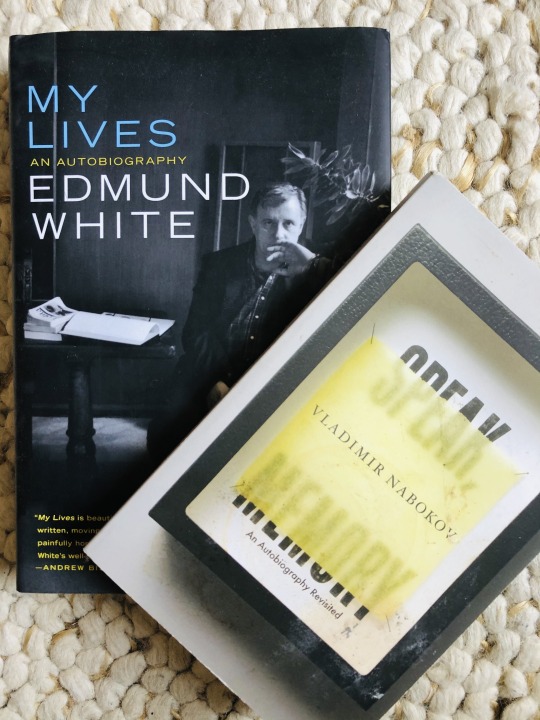
It’s difficult for me to overstate the degree to which these two books have influenced me thus far.
Nabokov’s memoir is well-known. It’s a work of literature in its own right. It is a great example of the possibilities of the memoir to accomplish something other than realism: the whole thing is a kind of Proustian meta-narrative of his childhood and abrupt departure from Russia after the revolution, like a dream of family life written down. Mary Karr, in The Art of Memoir, heads her chapter on this book, “Don’t Try This at Home: The Seductive, Narcissistic Count.” Indeed, the book reads somewhat Transylvanianly, a bold, exotic yarn full of strange characters unfurled for an audience unfamiliar with that way of life. It reads as alluring and dark, and, yes, quite vampiric. But it is also profound and gorgeous.
While it’s not really a memoir, more of an autobiography, and also not often regarded as exemplary of the form, My Lives, written by Edmund White is an incredible tour de force of portraiture of the most important people in his life, his therapists, his parents, his lovers, his friends, his subjects, they all get a chapter dedicated specifically to them. Imagine knowing a world-renowned painter who decides he wants to do a string of portraits of the most important people in his life and you are one of them. That’s what this is, in literary form. It’s less a story of him than of these people, but, by the end of the book, you, of course, end up knowing a lot about him. His ability to make you see the things that he is looking at, in a very concrete, physical way—the curves of a body, the angles of a face, the ambience of a train station—is unparalleled in my view.
Is there a difference between an (a) autobiography and a (b) memoir?
I think the difference is about scope. The autobiography is explicitly a functional genre that attempts to document a person’s entire life. It is a biography that is written by the person whose life is being written about. It does not usually try to invoke any literary devices and is intended to serve as an ancillary to consumption of the subject’s work outside of the autobiography. It is a kind of “reader” of the subject’s life. It’s main purpose is not to be written well (although if it isn’t it is a grave mistake), it is to convey the near entirety of the subject’s experience on earth.
By contrast, good writing is a bit more called-for in the memoir; otherwise the whole premise falls apart. The memoir, in carving out a specific “slice” of a person, either a period of time or some type of encounter or some activity that they always do, is explicitly intended to amplify and interrogate aspects of being. In this way, the memoir has more potential for inspiration and edification irrespective of the reader’s interest in the subject’s life outside of the memoir. This, to me, is the crucial difference.
For the most part, I am not explicitly a huge fan of the work of the writers below. But their memoirs have touched and inspired me. I don’t think I would have all that much interest in reading the autobiography of, say, Joan Didion. (I might, I can’t be sure, of course). But my point is that I’m not looking for her autobiography, whereas there’re a lot of Didion fans out there that would be waiting for said autobiography.
In this way, autobiography is a kind of fan service, whereas the memoir is a thing unto itself. It is a work of literature written for the purpose of refracting aspects of being alive. To appreciate that type of writing you need not be familiar with anything else that person has done on this planet, anymore than that it is necessary to be familiar with Herman Melville’s entire oeuvre in order to love and appreciate Moby Dick.
It was with the consciousness of the memoir’s self-sufficiency, the irony of its ability to communicate, in its more specific mode, even more broadly than the supposedly more capacious autobiography, that I continued my exploration of the genre and began taking notes for the writing of my own memoir (which is now a personal essay collection, but more on that later).
----------------------------------
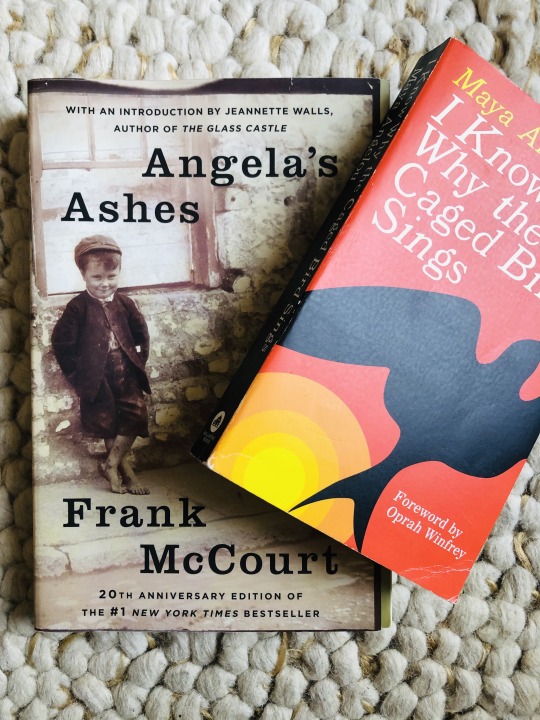
Two classics of the genre, here.
Many of us have read Maya Angelou’s book in high school. Both focus on the same thing: a period of time starting from birth and leading just up to late adolescence. Both are written like traditional first-person stories with beginnings, middles, and ends, and, were it not for our knowledge of their source material, might easily pass as romans a clef. I also think that both are examples of “misery lit,” although I think that that genre is overly hip and reductive for Angelou’s work, which is about so much more than just her misery. But they both focus on their childhood traumas in such a plain, unadorned, simple way, it is shocking and, for those of us struggling with these same issues, healing.
----------------------------------
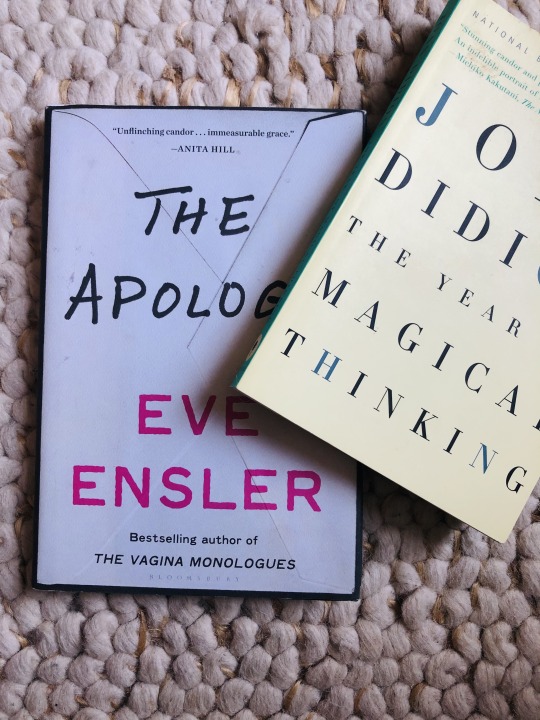
The Apology and The Year of Magical Thinking are examples of how the memoir can focus to a degree of incredible specificity. Both focus on pain but are concerned with different parts of experience. Didion writes only about one year of her life, while Ensler writes about almost the entirety of it, but with a focus on a single, prevailing experience. Both are harrowing in completely different ways and both are exquisite in the way they lift up their struggles to find meaning and truth, things that pertain to the reader’s own experiences and which he or she may also come into touch with in reading these books. They truly are gifts in that regard.
In a manner of speaking, these two books are like two, very long, book-length personal essays. They rigorously explore and interrogate their premises and do their best to extract whatever possible that is meaningful out of that exploration.
----------------------------------
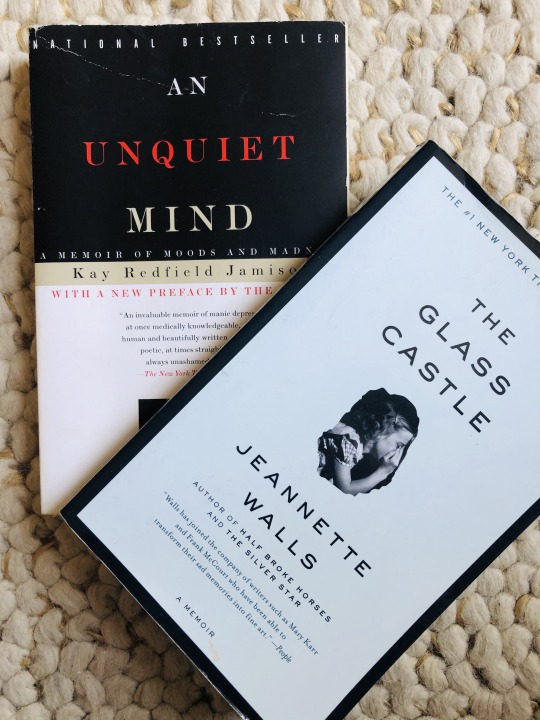
More “misery lit”! I actually don’t mean to be reductive in saying that. Both of these are fabulous stories concerning completely different encounters with mental illness and they are far beyond some hipster term of art. But there is a lot of memoir writing out there that explores the darker ways some of us were brought up and I don’t think there’s anything wrong with simply naming a certain type of writing that courageously explores how our childhoods might have been compromised.
In The Glass Castle it’s about her father’s mental illness and in An Unquiet Mind, it’s about the author’s own journey discovering and treating her bipolar disorder. Walls writes her story very much like it’s a novel, like Angelou’s memoir, and, also like Angelou, she writes it from the perspective of her child self and it is a compelling account as a result, full of tragic innocence and complicated encounters far beyond the reach of a child to properly grapple with.
Jamison’s book is very clinical, although she recounts her episodes frankly and shockingly and really brings you in to her subjective experience of insanity. These two books—not to mention Eve Ensler’s—have given me the courage to begin exploring my own encounters with mental illness and childhood trauma and to commit those experiences to writing.
----------------------------------
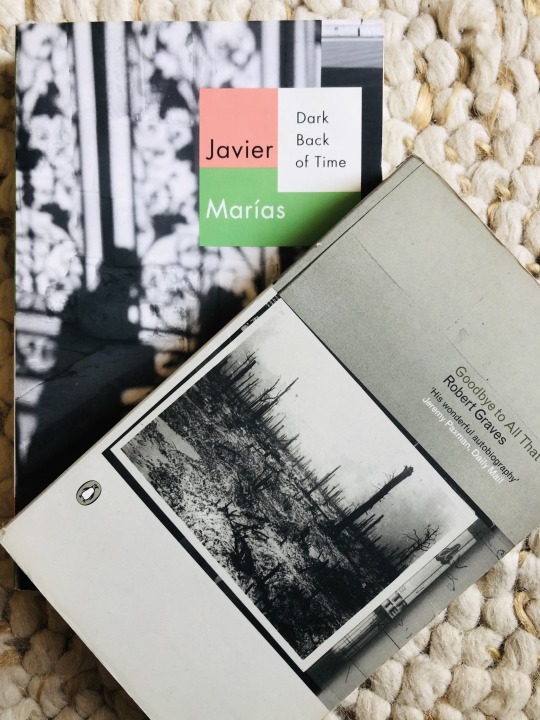
As I continued to research I started coming upon a very interesting type of memoir, the experimental memoir. That’s really interesting I thought. How does one write a memoir as a form of experimental art?
Not that this one is expressly experimental, but Robert Graves’ book is slightly off-putting in that fecund, experimental way: the bulk of it is dedicated to his experience in the trenches and it’s told with grit and harsh realism. But it starts with his schooldays and ends briefly, and curiously inconclusively, with scenes of fatherhood and tutelage. It’s a rather unique rendering of a life. Towards the end he admits that his original idea was to use the notes that he took on the frontlines for writing a novel but changed his mind after realizing that he would be desecrating his experiences and his memories and his sacrifices by layering a plot and storyline onto them. He then decided to write it simply as a factual account.
Dark Back of Time, however, is a full-on experiment in autobiography and it is always slipping in and out of reality, imagination and historicization. He spends a large amount of time writing about an old soldier who died accidentally on a hotel balcony in South America but he gets to this through talking about the reactions that his peers in Oxford had to one of his novels which they suspected made use of their lives. Truly an eye-opening experience to read autobiographical material refracted in this way.
----------------------------------
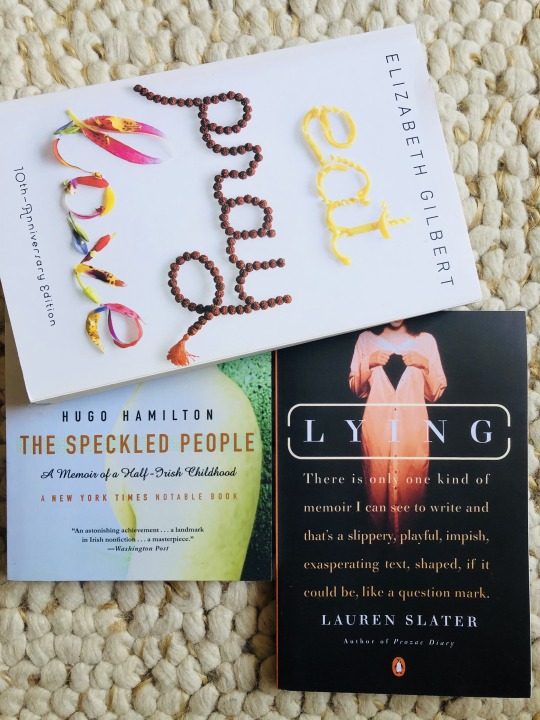
I haven’t read these three yet. They are “on deck,” as it were. Eat, Pray, Love needs little introduction, obviously. The Speckled People was highly recommended by a fellow writer and Lying came up in an online search as a prominent example of the experimental memoir.
At this point, it was already clear to me that I was writing a different kind of memoir than any of these examples. I realized that I was in effect writing personal essays without knowing it. I knew very early on that I wanted to eschew responsibility for an overarching narrative of any sort. I wanted to commit myself to specific topics that could be covered discretely in one chapter each. When I read the Graves’ passage regarding the desecration of his time on the battlefield, I thought of my own “war stories” and thought similarly that trying to give them a plot, while not exactly a “desecration,” would feel unnatural and inauthentic. What was feeling natural was to pick separate experiences in my life and devote a chapter to those I felt were strong enough for further elucidation. The time I got stuck on a mountain overnight with a friend. The shock of coming to NYU. The decision to leave the music industry. There were so many other parts of my life that seemed to deserve specific treatment in this way. I naturally started coming upon essay collections as a result.
II.
I took an online course by Alexander Chee called, “How to Write an Essay Collection” and afterwards it became much clearer what kind of book I wanted to write. I read about half of his reading list for the class and, along with the volumes I’d already dug into, I learned what a personal essay really was and what it wasn’t, and knowing this difference demonstrated to me quite clearly that the book I was writing wanted to be an essay collection in the truest sense of what an essay really is. The Leslie Jamison quote at the top of this blog post became true for me as well. My memoir could no longer stand being a memoir and had become a personal essay collection.
During the class, Alexander Chee recounted an irony regarding his own personal essay collection. He said that he found it curious when readers of his book would tell him that they found so much of him in it. “There’s actually not very much of me at all,” he said; and he mentioned this in order to illustrate what a personal essay collection is and what it isn’t. The reason why there’s not that much “of him” in his essay collection, nor, for that matter, why there isn’t much of any author’s life in any of their personal essay collections, is that a personal essay, despite being “personal,” is primarily geared towards externals not internals. “Pity the personal essayist,” the author Sloane Crosley writes in her New York Times review of Jamison’s latest essay collection, Make it Scream, Make it Burn, “fated to play with a reader’s tolerance for that most cursed of vowels. Too many “I”s and you’re self-absorbed; too few and: Where are you in this piece?”
Self-absorption as a liability in writing is understood enough, though, when it comes to autobiographies and memoirs, the liability becomes unavoidable and, if anything, necessary. We read those books exactly for the purpose of the big drop into an author’s psyche, willingly diving down the subjective abyss, basically swimming in “I”s (the best ones allow us to do this gleefully).
Not so in a personal essay, where the restriction on egoistic license holds. And yet: how do we include and implicate ourselves into the topic? without stepping on traps of self-absorption? This is what Chee was talking about when he said that there wasn’t much of him in his essays: not that he didn’t implicate himself in his narrations—he very much did—but that he skillfully observed this precarious balance.
That balance is undertaken quite differently depending on the author (and in my synopses of the collections I’ve read recently I’ll try to speak about how they’ve assigned “percentages of self” into their essays, what the “lean-to-fat" ratio is, for example, when “fat” could be understood as the strictly autobiographical portion of the essay). It can also vary according to the essay. In some cases it’ll be necessary to fully implicate oneself. In others, perhaps only a passing mention of the author’s impression of the events is needed. But there’s an essential aspect to what makes for a great personal essay, irrespective of ratios of personal to objective, that Charle’s D’Ambrosio captures beautifully in the introduction to his own essay collection:
My instinctive and entirely private ambition was to capture the conflicted mind in motion, or, to borrow a phrase from Cioran, to represent failure on the move, so leaving a certain wrongness on the page was OK by me. The inevitable errors and imperfections made the trouble I encountered tactile, bringing the texture of experience into the story in a way that being cautiously right never could.
This is kind of a Copernican revolution to me. I mean, it had never really occurred to me that you could be wrong and that would be a good thing. In writing I had always striven to make sure that I didn’t insult researchers, journalists, experts and scholars by misrepresenting the truth. Yet, here was basically a license to get it all wrong and admit it on the page and have that be a virtue of the writing.
What this tells me is that what remains key in the personal essay is not some authoritative stance, but the very uncertainty of the perspective, and how that might invite opportunities for a much more intimate relational structure with the topic matter on the part of the reader. This isn’t about ingestion (of data, of info, of ideas, etc.) but about contact. I see that as being very similar to the relationship between reader and author in a memoir, this premium on relation. The only difference—and for me, a very consequential one—is that the primary target of a personal essay’s sight is not the self qua self, but some implication with the content of reality on the part of the self. That intersection is what fascinates me more at this time than simple self-narration.
In this way, a personal essay can kind of be like a stop sign, a signal to halt the gyrating (mostly online) world, with its hyperlinks and ads and other pseudo-references. In fact, in his brilliant collection Proxies, Brian Blanchfield takes on this very task and turns the internet off when writing each of his essays in the collections. In order to take solace within the much more subjective account housed within the pages, an account at once open and tentative, based as it is in doubt, and hermetically sealed, shunning the greater world’s insistence on certification and realism, the essay becomes a prismatic utility for investigation, where perspective and subjectivity are king and certainty and objectivity are actually limiting.
The memoir offers something very direct to the reader: the author’s own struggle with, or journey through, some issue or period in life. The author is the chief protagonist in the drama, the star of, say, the cinematic adaptation of the book. The issues swirl around the protagonist but the camera stays trained on him or her. What I started to notice was that my mental gaze was always scudding away from the protagonist (me) and over to what else was in the frame. And so the personal essay as I began to learn about it became a much more appropriate vessel for these concerns, even as I knew that I would need to implicate myself in the action, keep myself in the frame. Striking that balance in a way that is both specific to me and my experiences and yet observant of the proper limits of the genre, so as not to veer away and “regress” back into memoir, has become my chief objective with each of the essays that I’ve been writing.
----------------------------------
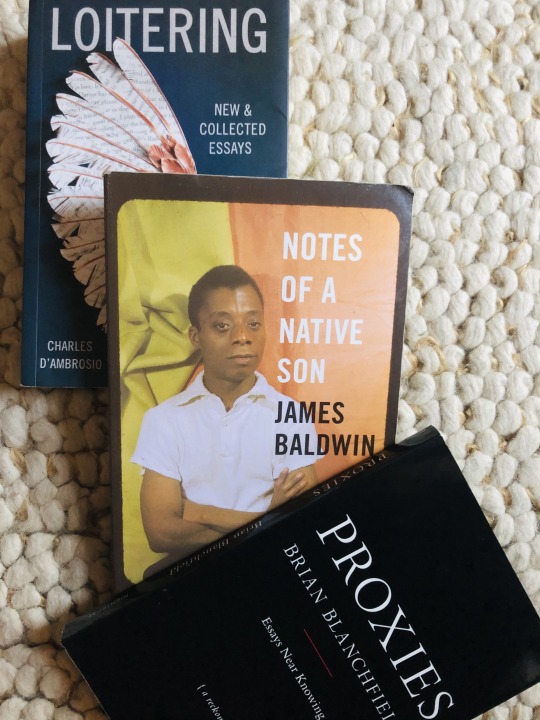
These three collections might be my bible for this project. Each are very different in style and application, but each is similar in that joyous experience of reading a paragraph and being so stunned by the insight that one has to turn the face away from the page for a moment (or two) to let it sink in. Baldwin is, of course, the king of this sort of thing. There were times while reading his essays when I actually had to straight up close the book and put it down in order to absorb what was going on. The title essay which is about Harlem, his father, and his early awakening to the depth of his country’s racism, is perfection on both the level of content and form. It does what an essay does best: leave you with the unequivocal residue of human feeling twisting around the grander issues with which that essay is concerned.
Each essay, in all of these volumes, is like a discrete nugget, a piece of writing, contiguous, open and alive, that can be read and reread, like an oracle you visit throughout your life, which, using the same words, speaks to you anew each time.
Ambrosio’s essays are absolutely nimble and virtuosic; his language is muscular and sinewy; his sentences are lean and long and you can ride them effortlessly and when you finish them and their paragraphs, you are left with an image of a truth that was planted in your sight without you knowing. It’s an exhilarating experience.
Blanchfield’s essays are a revelation of subjectivity. This volume was part of Chee’s reading list and I can’t express enough gratitude for having been directed to it. Perhaps Blanchfield is the master of nesting the autobiography within the confines of an essay. When he toggles between the external and the internal, you don’t notice it. It’s effortless. His ability to tell a giant story in one paragraph is inspiring. The tone and delivery is somewhat sacral, he’s a poet, after all. But it is also delicate, graceful, poised and elegant. And deeply personal. How someone can title an essay “On Frottage” and turn the reader’s attention to the true significance of the topic—AIDS and the gay scene in the 80s and 90s—and all of the social significance intertwined in it, along with implicating himself in a nakedly autobiographical way, is beyond me, but I am happy to be in the audience for it.
----------------------------------
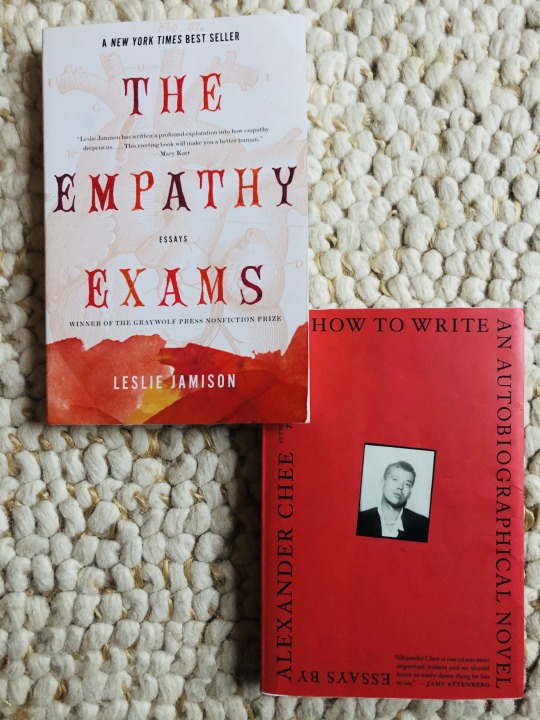
What I love about these two collections are their stealth and form. Their stealth comes from how they read, not so much as casually but as without artifice or adornment, and how this aspect lets the reader’s guard down, only to have some extremely penetrating conclusion arrive at the end of each essay, in a manner that the more plainspoken style did not necessarily anticipate. Chee’s prose particularly comes across as either supremely and dryly witty or as modest plainness, but when you finish one of his essays the takeaway is anything but those things; it is profound. Jamison as well. As for their form, they tend to do some adventurous things. One of Jamison’s essays uses a kind of diagram of storytelling which she learned in a writing class to “tell the story” of a traumatic episode involving a horrific episode of violence she experienced in South America. The essay is called “The Morphology of a Hit.” It’s a perfect example of something else that I really love about personal essays which is their ability to take leaps in form when that form enables a type of storytelling that otherwise isn’t possible. Chee does this very thing in a somewhat humorous essay, the titular one of this volume, which is just a long list of life hacks and writing tips. I’m really grateful for the insight that this man has given me into the writing process. My copy of his book is signed, as I first became aware of him at a reading of his with Edmund White at NYU which my good friend invited me to. So I’m very grateful to that friend as well! He also introduced me to Edmund White so it’s a double whammy!
----------------------------------
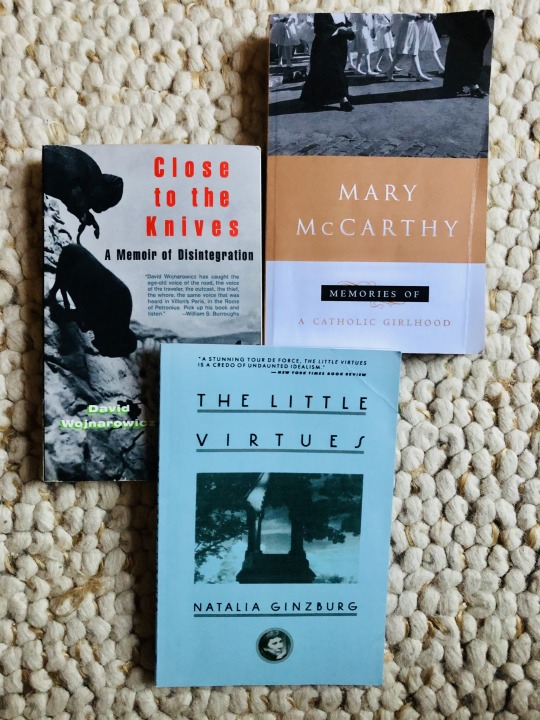
I would’ve never encountered these collections of my own volition without their inclusion on the reading list in Chee’s course, but I’m very happy that I read these. McCarthy’s essays are quite old, dating to the 50s and 60s, I believe, when they were originally published in The New Yorker. They’re all centered around her childhood years, either living with her grandparents or in an orphanage and they are remarkable portraits of intimacy and observation. The same with Ginzburg’s collection, although she writes in a much more enigmatic style. What inspired me most about her essays was how simultaneously aloof and vulnerable they are: she has a way of, say, writing about England, without ever even mentioning the name of the country, yet contriving a recognizable and incisive portrait of it, all from the vantage point of her own experience of the country during a certain time. Finally, there’s really nothing quite like Wojnarowicz’ book. It’s slightly Beat in tone, sometimes surreal and ecstatic, and then progressively more plainspoken and political. But it is all so very raw and pulsing with the heat of experience and desperation and anger. Wojnarowicz was an incredible artist, a sculptor and photographer and he lived in the East Village of the 80s and reports from the frontlines on the AIDS crisis. His work bears the stamp of a deeply tuned in artist confronting the hypocrisies and injustices of his time.
----------------------------------
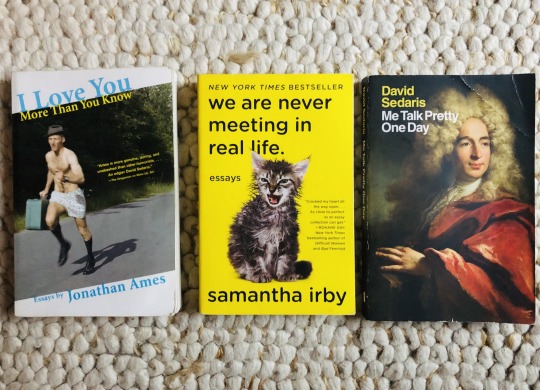
I put these three together mostly because these collections are explicitly comedic, although each has its own manner of using humor to communicate a deeper message. Jonathan Ames is well-known as a very funny novelist and the creator of the TV show Bored to Death. His essays are very short and very direct. There’s almost no commentary and he just narrates the events. The approach of leaving room for not knowing is very noticeable in his work, as he often qualifies his observations with humility and openness. The work comes across as very tender as a result. Irby is laugh-out-loud funny. I don’t know how she does it but she has a way of sending herself up and making fun of herself and her limitations that is both funny and painful at the same time. Commercialism, body positivity, and personal achievement are only some of the themes that are explored through that lens of self-effacement. Her ability to put herself under the most lacerating gaze of the authorial microscope and coming out the other end of that examination as a strong individual is unparalleled. I consider this volume must-reading material. In terms of exquisite construction and intelligence I would have to put Sedaris up high on the list, though his work is popular enough and his collections prodigious enough that his reputation for that kind of writing needs no further illustration here.
----------------------------------
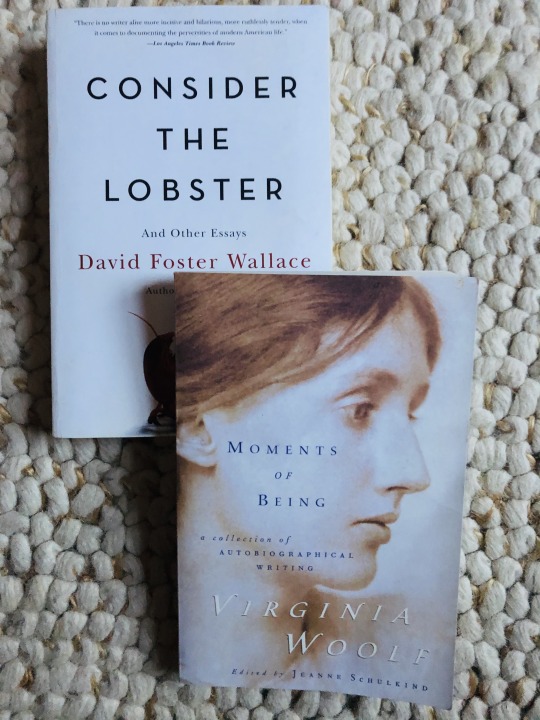
Virginia Woolf is popular as an essayist for collections published much earlier than Moments of Being, such as The London Scene. The essays here are actually very raw and unedited and so very sprawling, though obviously of high literary quality. She wrote them down like diary entries and then they were found after her death. They feel similarly to McCarthy’s essays in their naked observations of early childhood and family life. Juxtaposing this collection with DFW’s Consider the Lobster is a bold choice on my part, but it’s for the purpose of elucidating my previous point about that delicate “lean-to-fat” ratio I spoke about earlier in this blog post. Woolf’s posthumous collection is “all fat,” one could say, in that her focus is almost exhaustively on her own life and personal upbringing and subsequent marriage. These essays are basically memoir writing in the guise of the personal essay. DFW’s essays, by way of intense contrast, are almost “all lean,” in the sense that he spends almost no time talking about his personal life. The closest he gets to that is his essay on 9/11 where he goes over the details of where he was when it happened. The rest are what you’d expect from the author: penetrating accounts of the subtleties and hidden motivations of the cultures and people he investigates. He is basically like the most intelligent wartime journalist where his “wars” are the John McCain presidential campaign of 2000, the AVN Awards Ceremony, or the Maine Lobster festival.
----------------------------------
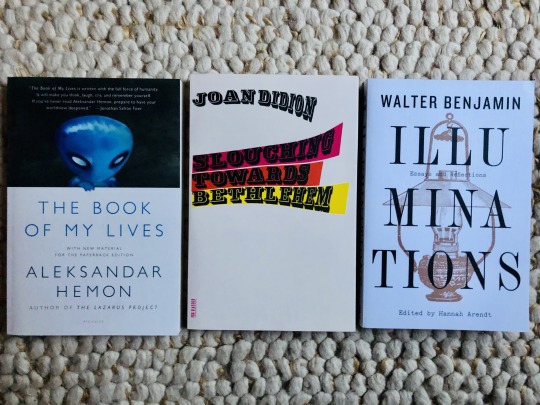
I have yet to read these collections but I’m very much looking forward to them. Hemon’s essays are about his upbringing in the war-plagued Balkans of the Nineties and subsequent emigration to the US. Didion’s basically needs no introduction as its de rigeur for essay writing. I’ve included Benjamin’s because of his critical insight. He’s not writing about his personal life, but his gifts for analysis will be really helpful to be exposed to for anyone undertaking the task of writing a personal essay. I have not included a picture of Susan Sontag’s collection Against Interpretation because it’s on order, but that one is also on deck. As are two other collections not pictured: Mary Oliver’s Upstream and Rebecca Solnit’s Hope in the Dark.
#charlesdambrosio#leslie jamison#james baldwin#vladmir nabokov#edmund white#frank mccourt#maya angelou#eveensler#joan didion#kay redfield jamison#jeannette walls#javiermarias#robert graves#elizabeth gilbert#hugohamilton#laurenslater#brianblanchfield#alexander chee#david wojnarowicz#mary mccarthy#natalia ginzburg#jonathanames#samantha irby#david sedaris#david foster wallace#virginia woolf#walter benjamin#aleksandar hemon#writing#memoir
17 notes
·
View notes
Note
hi! sorry if this has been asked before but how did you become an alan scott fan? and what is your favorite era in comics? (i mean like your favorite era where alan is in, for his characterisation etc). and do you like any other green lanterns? from earth or in general? wow that's a lot of questions, sorry! but thanks in advance <33
THIS IS SWEET, THANK YOU!! i don’t personally, at this point in time, consider alan a green lantern that’s in any way associated with the corps BUT when we (that’s me and @slaapkat, dream team/partners in crime) were throwing around ideas of a gl cosplay that’s actually comfortable to wear and isn’t guy gardner, it occurred to us that alan was the most reasonable in the world and i think at some point while katie was in the process of making her cosplay i had the bright idea to do some research & said research led to me spending like two whole months reading all of alan’s 1941 solo and all of all-american comics and slowly realising that. hold on. this is the greatest character ever created
and this was all like. whew. a whole year ago i think (maybe a year and a little bit?) and in the meantime i’ve read every single alan appearance and i STILL think no one in comics history measures up to him. i distinctly remember us joking about alan being a gay old man even before properly getting into any of this but it’s an inside joke that’s now lost to time as we suffer from old man syndrome ourselves <3
my favourite comic eras also coincidentally coincide (how do you like that?) with my fav alan eras because he’s been present for like, the medium’s entire history. i couldn’t choose just one but it would definitely have to be the golden age (gl solo, all american comics, comic cavalcade), the seventies (paul levitz/gerry conway/keith giffen trifecta of the only living writers to understand alan in any meaningful way) and the nineties (sentinel my beloved). i feel like all of those are the literal peak of alan’s characterisation and also very neatly trace his progress from deeply traumatised young man with occasional bouts of homicidal mania to bankrupt ceo suffering multiple breakdowns to Man Actively Setting You On Fire. and i’ve never loved anything more
it’s also worth nothing that 99.9% of alan’s appearances are consistently in the best comic books i’ve ever read and for me, he’s been the gateway to the very best of what the industry has to offer. i can’t count the number of times i’ve checked out a series just for a one-off appearance from alan scott and realised the whole thing’s worth reading. all my current all time fav books were found that way!
i DO like other lanterns too but no earth ones besides hal, whom i love in the very specific conditions of parallax being both acknowledged & written well. otherwise i love sinestro, soranik, lyssa, arkillo, katma & even arisia on occasion and im wildly excited to see whats coming up in gl 2021 considering how ideal the first issue was. ultimately alans the One and Only tho because he made me realise i’m really gonna be a lifelong comic book fan now that i understand there really are stories out there that go beyond my wildest dreams
5 notes
·
View notes
Text
no man can know his destiny...
...because if we told him what it was, he might decide to tell destiny to bugger off!
all right, folks. i am obviously eight years late to this party (party? maybe not party; that’s...maybe not the best word), and i am aware that everybody who was ever in this fandom has probably already consumed all the finale reaction posts that they ever needed to read. i am putting this S5 finale round-up together for my own purposes anyway, because now that i’m no longer avoiding spoilers, i want to make sure i get all of my own thoughts down on paper before i accidentally run into anyone else’s.
fair warning before anyone decides to invest their time: this post is sixteen single-spaced pages long. i am putting it under a cut here, so feel free to scroll on by.
with that said, off we go!
in a land of myth and a time of magic (i fell in love with a ten-year-old tv show):
so, to preface this, i think it’s pretty fair to say that i very rarely complain about merlin.
i watched the first episode of merlin on a complete whim - i was by myself, on a trip to atlanta, and despite the fact that i usually never sit down and just decide to watch random tv, i was scrolling around on netflix before bed and saw merlin and thought “oh hey, that’s always been on my list as something i thought i might like.” i clicked it. i watched it. i thought it was going to be a silly, fun, low-investment show i could use to fill the spare time on my trip.
it was silly. and it was fun. it was not low-investment. i fell in LOVE.
and i know this comes through in the way i write about it, like - the vast majority of the blogging i have done about merlin has come from a place of THIS THING IS GREAT AND I WANT TO TALK ABOUT IT BECAUSE IT’S GREAT. sometimes the story will go places that stress me out or make me sad, but usually that hasn’t impacted my enjoyment, because generally, when i evaluate stories, i react more to my perception of the story’s integrity, as opposed to whether or not i personally ‘liked’ the ending. so i might personally prefer stories that don’t end in tragedy, but if the story has earned its ending, with integrity, then i won’t feel any desire to criticize it. i will talk about how sad i am or how low it made me feel, but if the story has earned its ending then i can’t - i just can’t argue with it. i have to respect it.
and i think i’ve demonstrated that well enough in all the other blogging i’ve done about merlin. with 5.10 and 5.11 particularly; i felt those episodes were impossibly tragic and dark and SO unhappy, but i respected the storytelling, despite this. i wasn’t hopping on here to make posts like ‘ugh this is getting so dark this episode sucks!!!’ i was writing about the story they were crafting - which, yes, WAS getting dark, certainly - and about how impactful it was (even when that impact was just “OUCH”). i was still deeply engaged, at that time.
so - i think i have earned the right to say honestly that the following analysis does not come from a place of ‘this was SAD and that makes it automatically CRAPPY!!!’ that’s not how i assess things. 5.10 and 5.11 were devastating, but i respect them. i loved watching them. i would watch them again. i thought that the show had the potential to pull off something masterful, after those two episodes.
but the one thing this series has always struggled with a little bit is follow-through. bbc merlin is at its finest when they aren’t afraid to go barreling after the moral ambiguity and complexities that their show inherently contains (‘to kill the king,’ ‘the sorcerer’s shadow,’ ‘the disir,’ ‘the kindness of strangers,’ ‘the drawing of the dark,’ to name just a few), and they achieve real greatness in those moments. but they sometimes pull back from the difficult questions they pose. and i can’t tell if it’s that they’re deliberately chickening out, or if it’s just some variation of carelessness or ineptitude that makes them fumble the ball, but the end result is that they hit these amazing highs of “wow, i can’t believe we’re finally going there; we’re addressing the central conflict” and then all the complicated questions they asked just get dropped.
it happens in ‘the sorcerer’s shadow’ (which is an amazing episode otherwise), when kilgharrah kind of...word-of-god handwaves away merlin’s conflict, saying ‘we just gotta wait for arthur to be king, that’s the right way to go about this.’ and they double down on this by having merlin say that it was gilli, not merlin, who had betrayed their kind - which is just not - that is not what that episode had been saying, up until that point! the entire point of that episode was that yeah, merlin has in fact gotten himself into a position where he’s made a morally questionable decision to serve a regime that oppresses him and others like him. they show us how conflicted he feels when he’s confronted by this reality. they show us that he knows it’s true. it was brilliantly done - and then they pulled WAY back.
but even then i don’t think it was like...unforgivable, at that point. it doesn’t break the story’s integrity; i can definitely believe that merlin would take that tack - i’m not sure he’s quite ready to confront/accept the reality of his situation at that point. so i get it. it wouldn’t be a big deal - if the show had eventually addressed/followed through on this conflict in the end.
and i think the same is true of the episodes leading up to the finale. they were dark and complicated and tragic, but they were telling an important story; and none of the terrible things we saw happening to the characters were dead-ends, story-wise. there was a place for that story to go. there was room for morgana to have her arc resolve in a meaningful way. there was room for mordred’s arc to do the same. the place in which we found ourselves at the end of 5.11 was as dark and complicated as merlin had ever been, and it was still bursting with potential.
and then you watch the finale and it’s just - empty. i described it as a paper castle in some other post, and that’s what it felt like. no substance. it was like they stuffed us on a bullet train and whizzed us past material that should have taken an entire season to handle, and you didn’t see any of it or feel anything because the trip took ten seconds and the scenery was a blur.
it honestly felt like they thought they had another season coming and then someone popped in and told them “actually you have to wrap this up in two episodes.” i can’t think of another way to reasonably explain how dramatically the quality of the storytelling downshifts between 5.11 and 5.12. i wasn’t watching the show then, so i don’t know, but it’s - at least if that had been the case, i would UNDERSTAND what had happened. it’s just insanity, otherwise.
so anyway, with all that said, here are my own reasons for why i think the last two episodes were objectively bad writing, as opposed to just writing i don’t personally like. nobody is obligated to agree with me on any of these points, but i’m also not putting them up here to debate them, really - i truly believe that almost everything i watched in the last two episodes was poorly-conceived.
(there’s an entirely different discussion to be had, of course, about the relative merits of ending your, uh, hopeful fantasy story on a bummer of a death knell, and i might touch on that later, but that’s a little bit more subject to personal preference, and honestly, it’s not the point i’m trying to make here, because to be frank, these episodes are bad without even getting into who lives and who dies.)
i. plot contrivances: EVERYWHERE.
i don’t mean plot devices. plot devices are important, in a story. a plot device is something like how merlin throws excalibur into the lake in 1.09, and then is able to retrieve it in 3.13 because of a choice he made to show someone compassion in 2.09, and thus he is able to save the day and defeat the undead. excalibur is a plot device, in that scenario - the ability to use it in 3.13 unfolds organically.
a plot contrivance, on the other hand, is artificial. it’s unnaturally convenient. it doesn’t feel convincing. it’s what you reach for when you can’t think of a way to make something happen, but a writer is supposed to look at these things when they edit and think ‘hey. if i can’t make this happen without it being contrived, maybe it shouldn’t happen. maybe i need to look at this again.’
so like, from the very beginning of 5.12, we have:
the face-sucker slug. never seen one before. never heard of it before. never given any indication that any such creature ever existed. never given any indication that “stealing” magic was something that could even happen. no idea where morgana found it. created for and introduced in this very episode, just to give merlin a reason to go to the crystal cave; removed from the episode ten minutes after it’s introduced, forgotten.
gwaine’s sudden girlfriend. NEVER SEEN HER BEFORE. NEVER HEARD OF HER BEFORE. NEVER GIVEN ANY INDICATION THAT ANY SUCH CREATURE EVER EXISTED. where does she come from? why do we care? (surprise: we don’t.) created for and introduced in this very episode for the sole purpose of explaining how morgana could get the information she needed to interfere with everyone’s plans, which was a contrived idea in and of itself, because it relied completely on making gwaine act like the kind of dope who tells a civilian military secrets.
you just. you can’t. if your plot point can’t function without a) introducing a brand new character in the penultimate episode of your show and b) forcing a long-standing character to do something they just wouldn’t do, you can’t use it. you just can’t. you have to figure out something else.
this lady’s very existence is nonsense. absolutely, utterly contrived. to waste that much time on a character we’ve never seen before and don’t care about, in the last two hours of your five-season show...incredible.
morgana’s army. they outnumber camelot’s forces “five to one.” where did they come from? how did she amass such a force? in season 4 she was losing all her allies - the episode with annis and caerleon was specifically designed to show us how people were turning from her methods and aligning with arthur. and then she spent two years in a pit. how did she amass such a force in such a short period of time? what could she offer them? why do they fight for her? there is no explanation of who the “saxons” are or what they want - the show just needed an army for camlann.
aithusa. aithusa was, apparently, just a vehicle to enable mordred to obtain a blade forged in the dragon’s breath. beyond that, he served no purpose. he literally just vanishes, along with that entire storyline - the future of the dragons, everything - just dropped, forgotten, never mentioned again.
morgana in the crystal cave. “gee, i finally caught merlin, the guy who’s supposed to be my doom. i think i’ll just...trap him behind some rocks. wouldn’t want to kill him, while i have him completely powerless and at my mercy. how then would he escape from this super powerful magical cave and ensure that the next step in this impossibly weak plot unfolds?”
the crystal cave itself. what is the entire point of this detour? killing time while arthur and merlin are separated? i mean, the whole “merlin loses his magic for all of five minutes” thing was a contrivance itself, just to ensure that merlin and arthur had a reason to be separated during the battle. but even putting that aside, once merlin is in there, and balinor says ‘you have to go into the light to discover who you truly are, you have power of which you cannot conceive’ - what purpose did that serve? all we see merlin do once he gets to camlann is call down some lightning. he’s done that before. he...he did that in season one.
the entire detour in the crystal cave changed nothing. it was a contrivance to mark time so merlin didn’t arrive at camlann at the same time as everybody else.
arthur at camlann. the idea that we are supposed to believe that arthur somehow finds himself all alone on that battlefield, long enough for mordred to sneak up on him and stab him and for him not be found by a single other human being until merlin shows up. he is the KING. there is no conceivable circumstance where his army lets him go wandering around by himself after the battle has been mostly won. it doesn’t make sense. it isn’t believable. it’s a contrivance to make sure mordred has an opportunity to get him.
“only the sidhe possess such magic.” the SIDHE????? you guys. the last time we saw the sidhe was in that gooftastically wonderful filler episode where a pixie wanted to bone gaius. you can’t - you just - you can’t center your entire ‘this is how we save arthur’ plan on a race of beings that we haven’t heard of since early season 3 and which we never knew anything more about than that they once possessed a farting princess.
“not without the horses.” are you telling me. that the reason they don’t make it to this fabulous isle in time. is because. their horses. were conveniently scared away. that’s what killed the glorious once and future king. the horses ran off.
and the horses conveniently ran off because they were conveniently scared away by morgana, who conveniently happened to show up because she was conveniently put in a position to extract information from someone who conveniently knew where arthur was going - all of this, of course, predicated on the impossible-to-believe assumption that a) gwen would ever tell anybody where arthur was going, when the stakes were this high, when nobody needed to know and camelot had already fallen prey to spies multiple times, and b) that gwaine and percival would, if they did for some reason know where arthur was headed, be so foolish as to literally serve themselves up to morgana on a plate, when they know that the whole point of this scheme is that they WANT morgana to hang out in brineved wasting her time in order to allow arthur to reach the isle safely.
I SAY AGAIN: if your plot point cannot function without making characters do things we just do not believe they would do, you can’t use it. you can’t. you have to revisit what you’re doing. you can’t just make anything happen that you want to in order to drive the story to the place you want it to go. it has to make sense.
kilgharrah. is called just in time to deliver a pat explanation of the ending, but not in time to shuttle arthur over to the isle? merlin could have called for a ride ages ago. merlin and arthur weren’t traveling fast, or far. it’s not like kilgharrah was having that much trouble getting around. we see that he handles carrying the two of them just fine. we see that he flies away, zoop, no problem. there is no reason for him not to have been called even a single hour sooner, other than that the plot demanded that he could not be, because the plot demanded that arthur not get there in time.
it breaks the boundaries of disbelief. it takes you right out of the story. it reminds you, inappropriately, that all of this is a thing someone planned (poorly). all of it is contrived.
ii. dropped plotlines
i can’t believe i actually have to say this.
i’ve seen tv shows tank before, but usually, when tv shows tank, it’s just that the quality of their writing has declined, and they’ve resorted to resolving their plotlines in ill-conceived ways.
i have never, in my life, seen a tv show DROP all of its major plotlines before it ends. i have never seen a tv show just. FORGET. to address their premise. never. i still can’t believe it actually happened. i’m sitting here trying to remember if the merlin finale was actually some kind of anxiety-induced fever dream i had while i was gearing myself up to watch the last few episodes.
merlin bbc had, at its outset, two major plotlines. these would be supplemented later by other throughlines (many of which were also dropped), but the two major ones always stayed the same, one for arthur and one for merlin:
for arthur, the question of him one day becoming the greatest king in history and uniting the land of albion
for merlin, the question of him one day liberating the magical community from oppression and being able to live free from fear
those were the two constant throughlines in this show, from episode one. the struggle to unite the land of albion, and the struggle to make the land a free and just one for ALL of its people, not just those without magic.
this show, somehow, ended without actually addressing either of these things.
it’s amazing. i don’t even know how they managed it. somehow, this show ended without actually ending.
to elaborate on this (and other dropped plots):
a) the once and future king: we never see a united albion. the show is driving at it, in seasons 4 and 5, when arthur makes peace with annis in S4, and then gets annis’s permission to travel through her lands in 5.01, and then helps Mithian’s father in S5, and makes peace with odin in 5.04, and then tries to make peace with the sarrum in 5.08, and it’s all making sense, and you expect that plotline to continue until we see its eventual fulfillment at the end of the show. you would expect, if this were supposed to be such an important thing, that the big struggle at the end of the series would have been all the peoples of albion united together against a threat.
but we never see any of these kingdoms again. we never hear a peep out of them. no one ever mentions them. it’s like they all just vanished into the wind. as far as we’re aware, camelot fights morgana’s army on their own - it’s like annis and odin and godwyn and rodor and those five kings that came together to sign the treaty in 2.10 never existed.
the dragon says at the end, “all you have dreamt of building has come to pass,” but we’re just like - WHERE? we literally didn’t see it! it was never shown to happen! you can’t just say that the most important outcome of your five-season series happened when it never did! it demonstrably NEVER DID! you can’t…..oh my god, you can’t...try to end your show offscreen, lol; i don’t know what else to say!
look - this is something i wrote before i knew how the series ended, when i was considering the possibility of arthur dying:
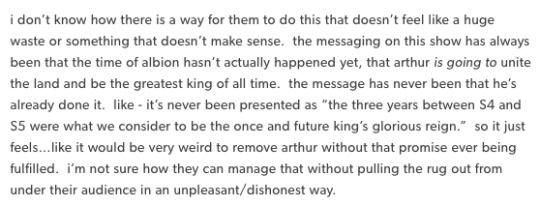
i wrote that before i even knew what happened. that’s not the result of, you know, retroactive complaining because they killed a character and i didn’t like it. i was doubting the idea that they would even be able to kill arthur, because i legitimately didn’t believe the show had shown us the uniting of albion yet (and they hadn’t, lol).
it just...it truly doesn’t make sense. something got tangled as they approached these last episodes. in 5.10, finna tells merlin, “without you, emrys, arthur cannot build the new world we all long for,” indicating that it hasn’t been built yet. but that scene takes place just a few weeks before the finale - you’re saying “the new world” hadn’t yet been accomplished at that point, but now, a few week later, it has? arthur didn’t DO ANYTHING in that interval! we saw camelot fight off a bunch of invaders (alone) like they’ve done a billion times before. there was nothing to hint that now albion is united.
and if finna was referring to the “new world” meaning a magical world, i mean - arthur didn’t do anything to build that, either. he died.
something happened. some wire got crossed. i don’t know what it was, but it meant that the show ended without actually closing out Main Plotline #1.
b) one day, we will be free: this show also somehow managed to end without addressing the plight of the magical community, which was THE central conflict of the show for all five seasons. more than that, it was the show’s premise - it was how they crafted their entire idea; it was one of two defining features of their pitch to BBC: that they would “wind back the clock” to when the characters were young, and that magic in this universe would be outlawed.
they literally abandoned the show’s premise. the episode directly preceding the finale was entirely about camelot’s wrongdoing and the right of magic-users to stand up and fight for their rights. it is not a crime to fight for the right to be who you are. and then we literally never heard a word about this struggle again. it was dropped like a hot sack of bricks.
IMPOSSIBLE.
and yet
it’s just left, twisting in the wind. we have no idea what happened. the one and only glimpse of camelot that we get at the end of this show has nothing to do with magic; it’s grim and somber people chanting ‘long live the queen’ in the throne room. and then we’re gone from that place, forever, never to return. it’s like they don’t even remember that ‘freedom for magical folk!’ was the driving source of conflict for the entire show. you would never have known that “magical oppression” was ever a feature in this show, if you just watched the end. camelot’s wrongs are never addressed, never referred to, never amended. the fate of the magical community is never hinted at. we don’t have any inkling of what happened to those people. we literally do not even have any indication of whether the magic ban was lifted.
it’s like none of that ever existed. it’s like the show just FORGOT its entire premise.
this truly might be the most unbelievable thing about the finale, for me. i’m still having trouble wrapping my head around it. in a roomful of writers and editors and producers, not a single person pointed out “hey uhhhh...we haven’t actually resolved either of our plots?”
i was exposed to enough vague reactions from fans to expect the finale to be disappointing. i assumed that the show would resolve its major plotlines in ways that i either didn’t approve of or found unsatisfying.
i did NOT expect them not to resolve their major plotlines at all.
i have never seen a tv show literally forget to end. never. never seen that happen before in my life.
c.) i am the last of my kind: the reveal of merlin as a dragonlord ushered in a third important plotline - his responsibility to the dragons, his duty to protect them and help them thrive. and the question was always ‘all right, so as a dragonlord, how is merlin going to ensure the survival of the dragons as a species, since they’ve been almost exterminated - .’ and that was also dropped. like a hot potato. like it never was. we never get clarity on what the heck was going on with aithusa, and then at camlann, aithusa just vanishes. gone. literally never to be seen, mentioned, or wondered about again.
d) i am old, merlin: this is a smaller thing, but in 5.10 the show starts this subplot about kilgharrah being unwell and merlin suddenly confronting the idea that kilgharrah is not, in fact, immortal. and it was actually very poignant and made me emotional despite how kilgharrah kind of drives us insane. they set us up for the idea that we are going to lose him. they set us up to expect that we will eventually see merlin arrive at a place where he doesn’t have that voice in his ear anymore, kind of like when luke goes to cloud city and obi-wan can’t help him.
but then, in the finale, kilgharrah just shows up like he always does, and there’s no mention of anything that came before. he’s fine.
it’s - it’s inconsistent, it’s not appropriate; there’s no emotional throughline. the exchange they have in 5.10 is such a beautiful moment, when a wavering merlin asks “what will i do without you?”
and kilgharrah says, like it’s the simplest thing in the world, “you will remember me.”
that’s such a powerful thing. for someone like merlin, for someone who has lost so many people who mattered to him - you can feel that line expand to cover miles and miles of ground. it’s about more than just kilgharrah.
but having kilgharrah then show up at the end of the finale to deliver his neat little explanatory summary the same way he always does dilutes that previous moment down to almost non-meaning. there’s no emotional consistency. they emotionally prep us for this figure’s departure, and instead he shows up, the same as always, with no reference to the fact that a few episodes ago we were getting ready to watch him leave us.
it’s not good writing. it just isn’t good writing.
iii. i want you to always earn your ending
i think it’s hard to come to grips with the idea that bbc merlin was specifically a show whose kind of...big premise was being a deliciously torturous slow burn up to some massive and long-awaited reveal, and then it fizzled just before it gave the audience what it had been leading up to for five seasons. it’s really just...wow. i’ve seen shows fizzle before, obviously, but the fact that this one was specifically built on the idea that you were waiting for something momentous (and inevitable!) to happen - which then doesn’t happen? that’s just...hoo boy.
the long-awaited, promised “payoff” doesn’t happen in any way that is convincing or satisfying or remotely plausible. it’s a little walk in the woods, and it ultimately doesn’t matter, because as soon as it’s over, so is the show, and everybody except merlin is long dead.
not with a bang, but with a whimper, indeed.
for a show that had its audience waiting on tenterhooks for five seasons for merlin’s secret to be stripped away, the fact that the show’s biggest “payoff” ended up carrying so little weight and feeling so unconvincing is truly a shame. there was no way for the show to give this concept the weight it deserved by flying through it in thirty minutes. the audience knows that there’s no way this could have been resolved so quickly, so everything that happens between the “reveal” (such as it was) and the end feels...false. it doesn’t seem real. it’s not believable. it feels (again, to use the word that truly sums up the entire spirit of this finale) contrived. rushed and squished together to be neatly tied up in the time they had available.
and that’s poor craftsmanship. stories shouldn’t feel like ‘well, i needed to reach x destination no matter what, so i made this that and the other thing happen to ensure that we got there.’ a reader/viewer shouldn’t be able to sense the presence of the author. they shouldn’t be able to feel the hand of god reaching in and arranging pieces to force a conclusion or extract an emotion that hasn’t been earned.
stories, if they are crafted appropriately, should feel like they have no author at all. like they just are. like everything that happens is the natural next step to whatever came before, as if events could not possibly have unfolded any other way. and i don’t feel like the “reveal” and arthur’s reaction to it met those criteria. all the supposedly super sad and emotional moments they were having at the end made me feel absolutely nothing, because the things arthur says don’t feel real. they haven’t been earned in-story. i felt like i was watching that sequence from a hundred miles away...just like...clinical. removed. like i was taken completely out of the story. like i was in the lighting booth of a theater watching some scripted scene play out below me.
(and this might be the time to mention that this has NOTHING to do with the actors. the entire cast was killing it. they were AMAZING. their performance threatened to wring emotion out of me even despite me being completely unconvinced by the idea of what was happening.)
but that aside - how can you stay immersed in something when you can feel the creator’s hand coming down and forcing a resolution that doesn’t make sense, that hasn’t been earned? it snaps you right out of the suspension of disbelief that all stories require you to maintain in order for you to engage with them. the writers needed arthur to say these things sometime before the end of the show, and so he says them, regardless of whether or not it would ever actually happen like that. but i didn’t believe it, because it wouldn’t have happened like that, and so the emotional impact was zero.
here’s the truth: you can’t use lines like “i want you to always be you” and expect me to get weepy about it when you haven’t earned that kind of resolution. it’s a false tearjerker. the writers are relying on our previous emotional attachment to these characters and our burning desire to see merlin validated in order to slip a contrived resolution past us without actually doing the work to make it plausible. they’re playing on our affections in order to cover up the structural shortcomings of the story they cobbled together.
i don’t like when a story tries to manipulate me like that. i’m not going to play that game.
iv. you are destined to be albion’s greatest king (*thor face* are you, though?)
i think there are probably some people out there for whom arthur’s death would have been a dealbreaker no matter what the rest of the story looked like. i respect that.
i’m in the camp where i could have accepted the ‘legend-compliant’ ending, if only it had been earned. as it is, arthur is never allowed to fully realize himself before he dies. the show keeps saying, and i quote, “one day you will be the greatest king this land has ever known,” but arthur skips off to avalon after having reigned for a whopping total of three years, during which time he is not shown to accomplish the only goal that was prophesied for him (uniting the land of albion) and during which time he also becomes further entrenched in his father’s anti-magic views (along with the hypocrisy of using magic for his own purposes), as opposed to ever seeing the error of his ways. he doesn’t right his father’s wrongs. he doesn’t usher in justice and freedom for all camelot’s people. he doesn’t change the status quo in camelot much at all, to be honest - and then he dies. and they try to tell us “there will never be another like [him].”
how? how can that not fall completely flat? he hasn’t accomplished his goal yet! he hasn’t become what they’ve kept telling us he will become.
so i can understand the ultimate plan of arthur shuffling off this mortal coil and being prophesied to return, and i could even accept that as an appropriate ending, but not when it hasn’t been earned. the way it actually unfolded, watching this moment feels like we skipped a season somewhere. it feels like a sham.
we’re being asked to give arthur credit for something he did not actually achieve, and it makes the whole thing feel like a farce.
v. gratuitousness and inconsistency
i had no emotional reaction when i realized they had actually killed gwaine.
that is insane, because you know how much i love him. but his death was so ridiculous that I actually started laughing in disbelief. and that in and of itself should be a sign that something wasn’t working. when your emotional beats are landing this wrong - falling this flat - something has slid fundamentally sideways with your storytelling.
i laughed when they killed my favorite knight! but what other reaction was i supposed to have? it was laughably silly! the premise itself was already foolish - that gwaine and percival would even come out here and endanger arthur in that way - and then gwaine dies because morgana used a nathair to extract information from him? we’ve seen morgana use the nathair twice before! she tortured elyan with it. she used it on alator. neither of them died. it’s never been indicated that being tortured with this creature will kill you. which isn’t to say that it can’t be the case, but from a writing perspective, if you’re going to use a sudden inconsistency to kill a major character, it’s noticeable! it’s jarring! and it makes us feel, once again, that the writers just grasped at any little thing they could think of to make what they wanted to happen happen.
and then there’s the whole question of why they wanted gwaine to die in the first place. what purpose did it serve? gwaine didn’t have to die in order for morgana to get the information the writers wanted her to have. and you’d assume that if they still killed him after that, that there would be a reason for it, or that it would at least...matter, somehow, but - WE LITERALLY NEVER HEAR ABOUT HIM AGAIN LOL. i wasn’t even sure he was dead at first. that’s how insignificant it felt. i felt like zuko in the ember island players.
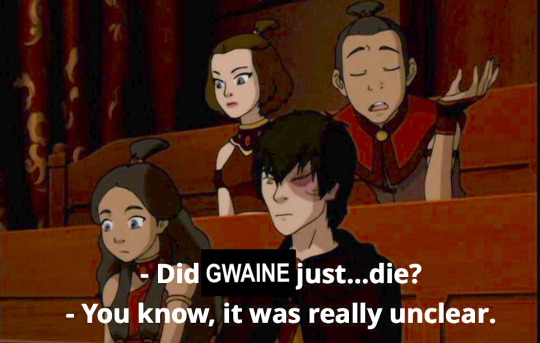
that’s it. we never see him or percival again after that scene. there’s this weird moment where percival examines a footprint and the implication is that he’s going to follow morgana or something, but then it never happens. it’s like the showrunners ran out of time and were like ‘ok well, we just won’t be able to get back to that dangling thread.’ they gratuitously axed their most developed knight and then forgot they did it.
that’s why i laughed. it was so unbelievably bad - there was literally nothing else for me to do.
vi. let the bodies hit the floor (but like, anticlimactically)
i don’t feel like i need to examine mordred and morgana’s fates too closely, because i suspect the subject of “they deserved better” has already been done to death, and that’s kind of a different conversation than what i’m dealing with here. i’m not here right now to argue that they should have lived (though of course, yeah, i have my opinions on what would have made a better story), i’m just here to deal with how ineffectively the story we did get was executed.
one thing that amazes me is that when i watched the S5 deleted scenes, i realized that the showrunners did in fact originally have the right ideas about making morgana and mordred’s arcs deeper/more nuanced, but somehow these ideas never made it into the final cut. there are two deleted scenes that change so much about what could have been - one where arthur and merlin are talking about morgana and arthur is expressing regret and confusion about what happened to her, and merlin says it’s not arthur’s fault, that “there were others better placed to help morgana,” indicating his own guilty feelings.
and the other one was after mordred defected to morgana, where he has a whole conversation with her about how he thinks there is still GOOD in arthur!!!! he’s uncertain about what he’s doing! I JUST
i can’t believe
they had the seeds
of this better story
and they consciously decided not to pursue them. it’s not like they didn’t have the idea. it’s not like they just never thought of it. they thought of it, filmed it, and deliberately removed it. unfathomable.
it’s also pretty remarkable that the big baddie they’ve been touting for the last three seasons just pegs out from a stab wound in about 5 seconds as we’re being hustled on to something else. there is no space devoted to morgana’s death scene (such as it was…). it’s a parenthesis. it feels like, ‘oh we gotta get this out of the way quick hurry up let’s move on.’
and the thing is, i am not wholly opposed to the idea of morgana ultimately destroying herself - it’s not necessarily my first choice, but there are ways they could have gone that route and still told a meaningful story - but if they wanted to go that way, her death would have to matter. it would have to be treated like the terrible failure it represents. it would have to be given the weight of tragedy.
but structurally, the way this scene is set up, there is no way for this to happen. the viewers are already hyper-strung out on tension, when she appears, because they’re suddenly starting to get this horrible realization that one of the show’s two central characters might actually be about to die, but nobody wants to stop clinging to hope despite their bad feelings so there’s just this desperate, screamingly loud ticking clock running in the background, and when morgana shows up in the middle of that clenching fear, there’s absolutely no way her death can receive the attention she deserves. the audience doesn’t have room for something like that. they don’t have room to feel anything on top of what they’re already feeling. they’re already about to explode. they’re already maxed out on investment. they can’t focus on her; they want her to disappear because something more urgent is going on.
and so the show hustles us past her, and her death is just this blip. it barely registers. if you sneezed, you would miss it.
(and then mordred, for his part, doesn’t even have the benefit of a structural problem to explain the anticlimax of his death. he just gets taken out like the trash. for a character that they just spent all this time developing and making sympathetic - boy.)
i think...the thing, ultimately, is this: if this show truly felt that what they had to do was take their previously hopeful premise and stun their audience with the death of the hero, then they should have understood that trying to stack other things on top of that is too much. trying to squash morgana’s death right up against arthur’s is foolish. it’s ridiculous to expect your audience to be able to process morgana’s death and arthur’s in-progress dying at the same time. these two things happen within two minutes of each other. the audience has been following these characters for five years. it’s unreasonable to expect your audience to hold so much emotion at once.
vii. you’ll just have to trust me
the last thing i want to say is a more general thing.
the rest of this analysis focused on the ways in which the finale is poorly-crafted, rather than on my personal feelings about who they did dirty. it’s not really about my own personal thoughts re: the merits of killing gwaine and morgana and mordred and arthur or stranding merlin across the centuries; it’s about if these things (and all the other things in these episodes) were done effectively, and the answer, sadly, is no. the show could have killed all these people and still written something i would have respected (even though it would have been devastating), but that’s not what happened.
but here, at the end, i think i can make room for a little sentiment.
so what i want to reflect on here is this: ultimately, i don’t end up rejecting stories just because they do things i don’t like. the pre-finale episodes were filled with things i didn’t like. i hated how merlin turned mordred and kara in instead of letting them run. i hated how he let the execution proceed. i hated how arthur refused to see the injustice of his own actions. i hated how merlin was getting so wrapped up in ‘make sure arthur doesn’t die’ that everything else was fading away, that he was doing things he could never have done in good conscience before. but i was still deeply wrapped up in these stories, because i believed they were plausible and true. i accepted them. it made sense to me, that these things would be happening, dark and unpleasant as they were.
i don’t start rejecting stories just because they go places i don’t want them to go. i start rejecting stories when i feel they’ve betrayed my trust.
writers and readers/viewers can only ever move together if they trust each other. i allow stories to take me places i don’t want to go because i trust the authors to keep me safe while we travel. i know that they may take me somewhere i don’t want to be, but i trust that they will never take me somewhere i don’t need to be. i trust that they are taking me somewhere intentionally, with the story’s integrity in mind. a creator i trust can take their story anywhere, because i know they will take care. a creator i trust can end their story tragically, because they remember that i am experiencing it alongside them. they don’t surprise-punt me off the edge of the cliff so i can crash, alone, into the painful conclusion. they carry me the whole way, and by the time we get to the end of the line, we can both look back and see that the road that led us here was straight and true. i don’t fault them for taking me here. it was the right place to go.
the end of merlin didn’t feel like that to me. putting aside the fact that it was all so contrived that it didn’t even feel real (illustrated clearly enough in the ten pages above) - the truth is that even if it had displayed the highest quality writing in the world, the way this show ended felt like the audience had been abandoned. the bond of trust between the creator and the consumer was severed. the show forgot to take care.
i’m a ‘galaxy far far away’ girl first and foremost, so i’ll borrow an excerpt from the world according to star wars in order to make my point:
kasdan: i think you should kill luke and have leia take over.
lucas: you don’t want to kill luke.
kasdan: okay, then kill yoda.
lucas: i don’t want to kill yoda. you don’t have to kill people. you’re a product of the 1980’s. you don’t go around killing people. it’s not nice.
kasdan: no, i’m not. i’m trying to give the story some kind of edge to it…
lucas: by killing somebody, i think you alienate the audience. (x)
i think merlin forgot this.
i’m not saying that merlin shouldn’t have killed anybody at the end of their show. i’m not even saying that they shouldn’t have killed arthur. i’m saying that they forgot to take care.
merlin bbc betrayed their audience. you cannot take a show whose underlying theme has consistently been the promise of better things and then turn around and end it like that without taking special care of the people who are watching. you cannot just take an audience who has spent five years listening to someone bright and full of unflinching hope say - without any indication that anyone should doubt the certainty of this statement - “one day things will be better” and expect them to walk into this kind of ending safely.
by killing someone, i think you alienate the audience. and this doesn’t mean that nobody can ever die. but it does mean that if you’re going to kill someone, you have to understand that there is going to be an automatic pain reaction from your viewers/readers/etc, and if you want to maintain their trust, you have to take so much care. you have to be sure that you know exactly what you’re doing. you have to be sure that it’s the right thing. the only thing. you have to make sure that it doesn’t betray the fundamental promises you’ve made whilst crafting the rest of your story.
the end of merlin is truly stunning in a) its utter reversal/unfulfillment of every major promise that comprised its premise and b) the casualness with which it throws its characters away in the last episode. it’s not just “killing someone.” it’s a slaughter. we have to watch almost half the cast die onscreen, and then at the very end literally everybody is dead except merlin himself.
and this is merlin! not game of thrones! merlin is a “family show;” that’s what the writers/directors/producers keep calling it when you listen to the episode commentaries and they talk about how they can’t show certain things or make it too bloody. they wanted to follow in the tradition of “big, kind of epic family-entertaining shows, that—across generations—work on lots of different levels.” but i cannot imagine a young person who has watched this show for five years coming into the finale to see mordred and gwaine and morgana and arthur violently executed, and to see gwen in mourning, and merlin anguished and then more alone than he ever was even when he was hiding his secret, and then, whoop, there’s the credits, that’s all folks. aren’t you glad you got on this ride?
the show ends without fulfilling any of the promises it made repeatedly for years. the liberation of magic, the uniting of albion, and, for merlin, especially, the long-predicted day when he would be known and recognized for who he was - all forgotten. all abandoned. the finale finishes without giving the audience any of the things that they have spent five years being told to expect. the show rewards five years of emotional investment with death and desolation. it breaks all of its promises. it doesn’t take care.
i was lucky enough to have been so disconnected by how shockingly bad these episodes were that i mostly sat there shock-laughing at them in disbelief, the first time i watched. but going through them again to put this write-up together was just like - that’s when a deep sadness kicked in, for me. not at the ending itself, exactly, because, as i’ve said before, it was so poorly put-together that i can’t even see it as real. but just - at the idea that i still had to see it, period. that i had to witness this thing that i loved so much descend into this misery, for all that i didn’t recognize it as something plausible or true. that i still had to watch merlin drag arthur all over creation, still trying, still scrabbling for that sliver of hope, only to have arthur bite the dust like ten feet from their destination. that all merlin ever wanted in his life was to be accepted and loved for who he is, and that he put all of this on hold so he could (supposedly) bring about a world where it would be possible, and then he never gets it. that a life of hiding himself and believing that everybody around him hated who he was inside - that was as good as it was ever going to get, for him.
the writers just - piled it on. ‘you can watch mordred die, even though we just went to all this effort to make you root for him! and now you can watch gwaine die (why????? we don’t know!!! it doesn’t change the story, but why don’t you watch it happen anyway!). and now you can watch morgana die! but don’t look too long, because arthur is dying! and now you can see camelot cold and in mourning - but only for one second, because now you can see merlin, who we never showed meeting any of his friends ever again, wandering around as a solitary old man thousands of years after everybody else is dead and the universe we spent the last five seasons living in no longer exists!!!!!!’
unbelievable.
it doesn’t upset me in the sense of “it’s so terrible that the story ended that way” because i know it didn’t, really. it was contrived and false enough that i laughed through most of the episode. i know it isn’t the way things would have gone, and i won’t have any trouble forgetting it; whereas if it had been well-done, i wouldn’t have been able to dismiss it so easily. but i still had to watch it, regardless. you’re forced to watch it, because you care, and the creators know you care enough not to look away, and they use that trust to keep you glued there while they gut-punch you over and over and over again and then peace out without concluding any of their plotlines, saying, “isn’t it clever??? we really fooled you, didn’t we? technically, we fulfilled the prophecies - nobody ever said any of the characters would get to enjoy the new world they would build! i bet you’re so surprised!”
it leaves you stunned.
it’s so...mean.
it’s so careless.
i don’t have any desire to subject myself to that a second time. after i’m done with this post, i know i’m never going to watch those episodes again. they weren’t good, first of all; and if you need more clarification on that, please see the first ten pages of this document. but more importantly, i don’t feel the need to subject myself once again to the callous disregard for the trust i gave this show’s creators.
if i’m supposed to trust a creator to carry me over rough terrain, i’m trusting them to carry me all the way to the end. they can’t violently dump me to the ground two feet before the finish line, run me over with an ATV, and then expect me to willingly climb back into their arms.
viii: if you want something done right
in conclusion, i guess the one nice thing about this is that we can crawl the last two feet ourselves.
for me, sadly, i think canon!merlin is always going to end at 5.11. the last two episodes don’t feel believable to me. i couldn’t watch them and be convinced that i was watching something plausible; i felt like i was watching two hours of scripted theater. which is, of course, what we’re always doing - but if the story had been crafted appropriately, we shouldn’t have realized it. we shouldn’t have been able to feel the writer’s hand reaching in and making improbable things happen. we shouldn’t have been laughing in disbelief as supposedly “sad” things were happening in front of us, and we definitely shouldn’t have been almost falling off the couch because the last scene was so jarring we thought it was an advertisement. (the TRUCK, people. blaring across the screen and bulldozering through medieval fantasy-adventure show merlin bbc. nothing on earth or in high heaven could have prepared me for that moment.)
but the one good thing about a piece of media that ended so unsatisfactorily is that it lights a fire under people’s butts to go ahead and sort of...row the boat themselves. i was afraid, before i watched this, that seeing it would make me never want to go back to merlin again. i put off finishing season 5 for an entire year because i was in the middle of writing a fic and i thought that if the end of the show upset me, i would never want to write another word. but now that i’m finished, i’m relieved to be able to say that the finale, while it will always be a bitterly disappointing sore spot, was also SO laughably bad that i don’t feel the slightest compunction about just...letting it lie unrecognized. if it were well-crafted and i was just ignoring it because it made me sad, i’d feel guilty for being petty. but it was Just Actually That Bad, so my conscience is clear.
and so is the path to more fun things, i hope, because that is the point of fandom, in the end, to have fun with something you love in the company of other people who love it the same way.
i hope i haven’t written the last merlin thing i’ll ever write. i hope there’s more inside me that i want to say. i hope i haven’t come in too late to make connections. i hope i’ll enjoy rewatching (most of) this show someday. i couldn’t imagine that any of these things would be true, when i knew the end was going to be a let-down, but now that i’ve finished, i feel like there’s infinite room to play, and that, at least, makes me smile.
i’ve said before that this was a hell of a ride. it ended in a trainwreck, sure, but i’m not sorry i got on.
111 notes
·
View notes
Note
Raven used to be my friend but I had to cut ties recently due to feeling like walking on eggshells everytime we spoke and they never apologized to me for when I brought up something that they did upset me. I really miss them but I don't want to deal with the if it's not about me I don't care attitude.
Pt 2 of Ravens old friend. They reblogged anti fandom posts on their resource blog and I happened to be in that fandom and it hurt. A resource blog shouldn't be doing that.
Hey, Anon! I wanted to post this before I released one of my drafts, as that draft happens to be something I do not want you to misconstrue being about you. Thought about it after the fact and honestly, felt a bit ill over potentially making you think any such thing! The post is about how pushy people can be about what they like (usually as regards fandom) that you don't, and how that can be a contributing factor toward people saying hateful things about fandom topics. It was the quickest of the finished drafts sitting around to edit, so it was being queued, that's all! I do not think you were being pushy about your likes to "deserve" this, and frankly, even if you had? One's meme/resource/help blog is not the venue for shitting on your friends.
Okay, just wanted to clarify, everyone is stressed and feeling judged enough, I don't want to inadvertently contribute to that with any drafted posts!
I'm really sorry this happened, Anon. I don't mean that in a passing, flippant way that looks good on my blog. Not that I mean anything that way lol but I frequently have had "friends" in the past who felt like it was totally fine to reblog, even make original posts, like what you're talking about. Anti-fandom, anti my part of the fandom, my muses, my takes, and so on. Really hurtful things when we'd spoken in DMs about how upsetting it was, then they go and throw full support behind it in front of me.
It would be irritating with a grain of betrayal if it was a friend of a shorter time, or a mutual one doesn't really interact with OOC, but with a closer or longtime friend, it's actively hurtful. It feels like they looked you right in the face, said they do not give a single shit about either what is important to you or sparing your feelings, and went on. Yeah, it's just fiction, but the way we treat each other over fiction is real.
Given the behaviors displayed openly, it's not a shock you received no apology. Whether you got an apology or not, though, good on you for trying to bring it up to them! It's hard to do that with friends, even ones you're more certain won't blow up at you for it. I think if we could all be a little more (calmly, nicely, reasonably) open with each other like this, we could avoid problems that result from things festering and piling up, but it's hard to take that step...and I'm sorry this was your reward for it.
Just as blogs that are not one's RP or personal blogs shouldn't be openly judging and hating fandoms like that, friends shouldn't leave you feeling like you're walking on eggshells.
And, I'm going to say something unpopular here - sometimes, we all are capable of doing that to people we care about. Bad moments in lives combine, there are misunderstandings, sensitive topics, and things we can't entirely control otherwise. I don't like this idea tumblr has that anything other than a perfect, sweet, forever-cheery relationship is the actual height of abuse, so I want to be clear on that because it's just trivializing and blinding people to the possibility of toxic and abusive interactions. When you think "toxic" means "they don't like x, I love x, we don't talk about it," you're not aware of legitimate signs like being too worried to be yourself around them.
It's when this is the typical, established behavior that it's a problem. It's when there's never any meaningful acknowledgment, apology, or attempt at changing that it's a problem. If you constantly feel like you have to be worried about what a friend is going to say or do, it's not a friendship you need to be in, and I'm glad you recognized that and got out of it!
But there's also the idea that this is easy because it's the right and logical choice. It is not, and it's often made even harder because admitting to other friends that you miss the good times with the former one is all but impossible. They're often only reacting out of concern for you, the fear that if you miss this person they watched hurt you, you'll go back to that friendship, but it effectively shuts down a more healthy way of dealing with your feelings by sharing them with better friends who could support you.
So, Anon, it's also fully alright and normal to miss Raven! They were a longtime friend, and the thing about these kinds of friendships, these kinds of relationships in general, is that we seem to fail to realize that if things were straight awful from day one, we'd not have been friends. Of course, there are memories! Of course, you have the impulse to send them a link or that meme you know is their humor! It doesn't stop for a long time, either. That doesn't mean you're fucked up for it, it's something to be ashamed of, or that you're going to drop your better judgment and go send Raven a message immediately and rekindle that friendship. It's okay!
This right here: "I don't want to deal with the if it's not about me I don't care attitude." This is the place you should be in, and I congratulate you on being there because it takes a lot of shit heaped on someone by a friend to get there. Just keep remembering the good things you experienced with them, but always with this in mind, that their end of the friendship appears to have been predicated upon what they were getting out of it only.
Case in point, like everything they displayed to the whole damn RPC that encountered them these last few months, their personal interest and viewpoint was of greater importance to them with that anti-fandom post than a friend was.
I will say, it can be a delicate thing having this blog. I have opinions and takes that most of my friends share, what's important to me tends to run in the same lines as what is important to them, that's the basis of a lot of our friendship. We still disagree! We still have different interests, fandoms, favorite characters, songs, and experiences. Sometimes, I have to address a problem that they could misconstrue, in a totally normal and reasonable way, because while they're not doing whatever in a bad way, others are. I've made a point, more than once, to contact them and talk about it a little preemptively, and that's not just to keep up friendships, it also allows for extra insight from them and better phrasing from me so that other people I don't know won't take it the wrong way either.
Yes, I have some immutable, incredibly hard lines lol I think we all know what most of them are now, but expressing my purely personal opinion on something like fandom is not more important on this blog than anything else. I may genuinely feel like there is diseased connective tissue of disappointing behavior stemming from an origin point in a popular fandom, I'm not going to go off about it on this blog. It's inappropriate as hell, going to make people feel isolated and targeted whether they're my friends or not. Being passionately displeased about that does not have place here, and that's the kind of thing you have to consider, reconsider, force yourself to shut up about when you've got a blog that isn't for RP or a personal, you know?
I don't think everyone is cut out for doing that, and no one is cut out for doing it without ever making a mistake in judgment. Some people really should simply realize that there is nothing wrong with not being in the place in their lives or mental health to put that much effort into being fair or being quiet and concentrating only on memes. If you're one of those people, random reader? I'm serious, it's okay if you can't do it! It's not shameful, I'm also a deeply flawed human being, the quietest, politest, helpful meme blog out there is also run by a flawed human, they're just at a different place with themselves than you are. And. That's. Okay. Just don't hurt other people (and yourself, ultimately) by forcing it, please.
I suppose, knowing that it wasn't important enough to chill and reevaluate for the sake of a friend is some consolation lol what one won't do for friends definitely won't be done for random muns deemed problematic. So, maybe that'll make some other people out there feel a little better, and I thank you for sharing...as much as I wish you had nothing of this experience to share. I know it's an unpleasant one to have had, and I hope you have much better friends!
I promise you that I'll never post anything here that is viciously against any particular fandom or any such thing, and that if you feel like I've been unfair about anything at all, I welcome polite messages as a way of discussing it so we can all be clear and/or learn from each other. I know, I openly admit, it's kind of a draw of the blog, that I have a...um, tone of salt about things lol and sometimes, I don't phrase things the way they deserved. So, it's always okay to drop in for clarification or counterpoint, so long as it isn't being done with a shitty attitude that incites hostilities. Let's do have a legitimate conversation about it instead of hurt feelings!
Thanks again, Anon!
1 note
·
View note
Text
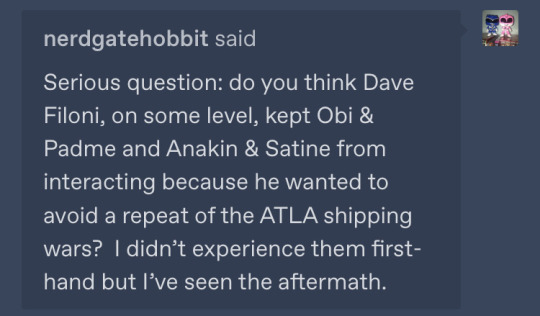
@nerdgatehobbit Hey! Thanks for the question! Ik you asked this to my main but imma respond on my SW blog if that’s okay?
So whew that’s a big question. Do I honestly think that Dave kept Obi Wan and Padmé and then Anakin and Satine from interacting in the TCW show because they didn’t want shipping wars?
(Remember, these are all just my personal opinions. I do me and you do you!)
Short version? Yes and no. Long version? Under the cut because I can never shut up.
Firstly, I don’t wanna say this was all Dave’s decision. He was one of the top guys in charge of TCW, yes, but he was far from the only one, there was an entire creative team working on the project, and during the time of TCW’s original six seasons Lucasfilms was not owned by Disney yet and George Lucas himself had a very large amount of creative control over the entire show. So I don’t really think it’s fair at all to point fingers at any choices the show made and go “yep that’s completely 100% Dave’s fault alone”.
I also don’t quite think they were concerned about shipping wars in the way ATLA had them. Avatar’s shipping wars were so absolutely toxically rancid that they legit drove me right out of that fandom. I’m still hesitant to come back during the current renaissance because of them. Star Wars, prior to the Sequel Trilogy, never had shipping wars close to that calibre of pure nastiness. The fandom was a godawful cesspool that fought to the death on most aspects of the franchise, this has always been true, but shipping, if I’ve read right, was somehow never really one of those hot button issues within fandom. I don’t think Lucasfilms kept the Clone Wars four apart because they were afraid of fans fighting over ships.
That being said, Lucasfilms HAS always been Very Strict on how they want their characters to be seen, romantic-wise, way back to when they would terrorize Original Trilogy slash shippers back in the 80’s and 90’s with threats of legal action. It’s part of why they were Very Firm in their insistence that they had absolutely nothing to do with all the Luke/Mara Jade EU stuff. You either abided by LF’s canonical romances or not at all in their world. So yes, in the case of Obi Wan and Padmé, I absolutely think the writing team’s decision to keep the pair of them apart was almost entirely so fans didn’t ship them together.
Why do I think this? Because there is no other rational reason why Obi Wan and Padmé haven’t had a single second of screentime in TCW that hasn’t had either Anakin or Satine also in the room as a buffer. Not when Revenge of the Sith EXPLICITLY portrays their relationship as relatively close friends who care about each other. So nope, I genuinely think the show just doesn’t want the fans to consider any other relationship for Padmé besides Anakin.
But why would they do this just to her and Obes? Obi Wan and Padmé both have other friends of different genders, why don’t they worry about us shipping THEM? Well for Obi Wan’s case, it can be excused that he flirts with everyone, so we’re conditioned to think that it’s never anything serious, and none of the other characters are married to the main character of the series. This is entirely because of Padmé’s position. Yes, she has other male friends, but either they’re nonhuman and not conventionally attractive so the series doesn’t see them as a threat, they’re Clovis, who they actively show Anakin going into a jealous fit over, or they’re Bail, who can be excused by the fact that he’s already married and also because he’s never actively shown as in competition with Anakin for anything, so he’s not threatening either.
Obi Wan, on the other hand, is a major threat to Anidala in the show’s eyes. They already constantly make a point to compare him and Anakin in almost every opportunity. Which is strange, the show’s decision to force them into the role of narrative foils to each other when in the movies that isn’t the case at all— Obi Wan is much more of a foil to Sidious and Anakin’s foil is Luke —but yeah, the show very often has Obes and Ani going through similar situations with competing viewpoints— ESPECIALLY their canon romances, and I won’t rant about how the show’s attempted Anidala and Obitine parallels fall apart under scrutiny right now but if yinz want the rant sometime let me know.
Obi Wan also has the canonical ability to charm the pants off of literally everyone he meets. Nearly everyone in canon is in love with him, 80% of the fandom at least is in love with him, and I KNOW most of the crew was in love with him too. Anakin, on the other hand, has a very abrasive personality and is much easier to dislike. The show was ALREADY terrified of the fans not liking or wanting to root for Anakin to the point that they reworked his entire personality to make him more palatable to his critics from the movies. Plus, Obidala fans already existed! Since the first and second PT movies, a big group of people already shipped these two because they already thought Obi Wan was a preferable match to Padmé than Anakin. The studio did not want to encourage this.
So yes, I think it was a combination of the show’s tendency to already try and get the fans to compare Obi Wan to Anakin for everything else plus their insecurity in Anakin’s image and likeability as it was, that they did Not want the handsome charming not-future-evil guy around the leading lady and threatening her canon romance by existing as a possibly better option. So Obi Wan and Padmé got no stories together, just kinda throwing the opening ROTS left them in the garbage ¯\_(ツ)_/¯ The worst part is, there is so many potential places in TCW where Obi Wan and Padmé could talk to each other, like during her investigation into her friend’s murder, during the Clovis arc, bits during the Malevolence arc, the earlier Naboo crisis arcs, even the one time where she’s just hosting a damn party and wants to invite her friends gahhhhhhhh
Anakin and Satine, I also think yes, but this is also a case of half and half because Satine isn’t nearly as major a character as the other three are, and out of the nine episodes she appears in, she only has more than a singular line in seven of them, and out of those seven, only two of them aren’t revolves entirely around building her relationship with Obi Wan. So really, there is a defence for the writers here in noting that there’s not as much room to explore Satine’s character as it is, let alone trying to shoehorn in a scene with Anakin.
Except no, I’m not gonna give them that defence because in the two episodes where she only has a speaking line or less— Obi Wan’s funeral and the Ahsoka and Lux meet Death Watch ep —I can already easily think of ways she and Anakin could have really meaningful interactions in them both. Y’all have already heard my bit on how they could have a real important conversation at the funeral, but y’all HAVEN’T seen my idea for a rewrite of the Carlac ep where it’s a two-parter, Anakin comes with Ahsoka and Padmé to the negotiations on Mandalore, and it ends up with a subplot of Anidala chasing after Ahsoka and Lux with Satine as the put-upon third wheel and we get foreshadowing to Satine being Bo Katan’s sister, so when the reveal happens the next season it actually means something.
So yeah, it was partially because of timing constraints, but it was also DEFINITELY in part because they didn’t want Satine being shipped with Anakin— which ppffffft, if they were brave enough to actually try writing these two in a conversation in-character, they’d understand how much of a not-worry this would be xD —because the show is set on the fact that despite maybe there being other flings at some point, Obi Wan and Satine are each other’s one true tragic love (Or, at least Obi Wan is Satine’s. He’s always had more freedom and decision than she has in this narrative, and that’s always kinda bugged me). So, that means Satine can’t interact with any men unless they’re gonna betray her trust and try to kill her by the end of the episode, because the show needs Obi Wan to have a loyal, steady, good girlfriend because he is a good man.
(And yes, before anyone says it, I have heard the more unpleasant rumors behind why exactly Obi Wan was given a girlfriend in the show, but as I’ve yet to see any official proof of them besides fandom salt, I’m not gonna spread them because those are hefty accusations to throw around).
So yeah, Satine can’t talk to Anakin partially because time constraints, but also because she isn’t allowed to talk to any other nice men besides Obi Wan and her son (no I don’t particularly like the Korkie Kenobi thing, but it is blatantly obvious that that is what the show was implying and I’m not gonna pretend otherwise), and Obi Wan and Padmé can’t talk to each other entirely because the show saw Obidala as a threat to Anidala.
Again, just my opinions and things I noticed, y’all are more than free to disagree and discuss with me.
#can i EVER answer someone’s question without going on an entire ranting spiel? stay tuned to find out lol#ask#asks#nerdgatehobbit#sw the clone wars#morai musings#our only ho#queen of my heart#peace out#one (1) hot mess
24 notes
·
View notes